Find out what the critics think at the Review Round-up on the website of TheatreInChicago.com
Raves
A Tale of Two Cities
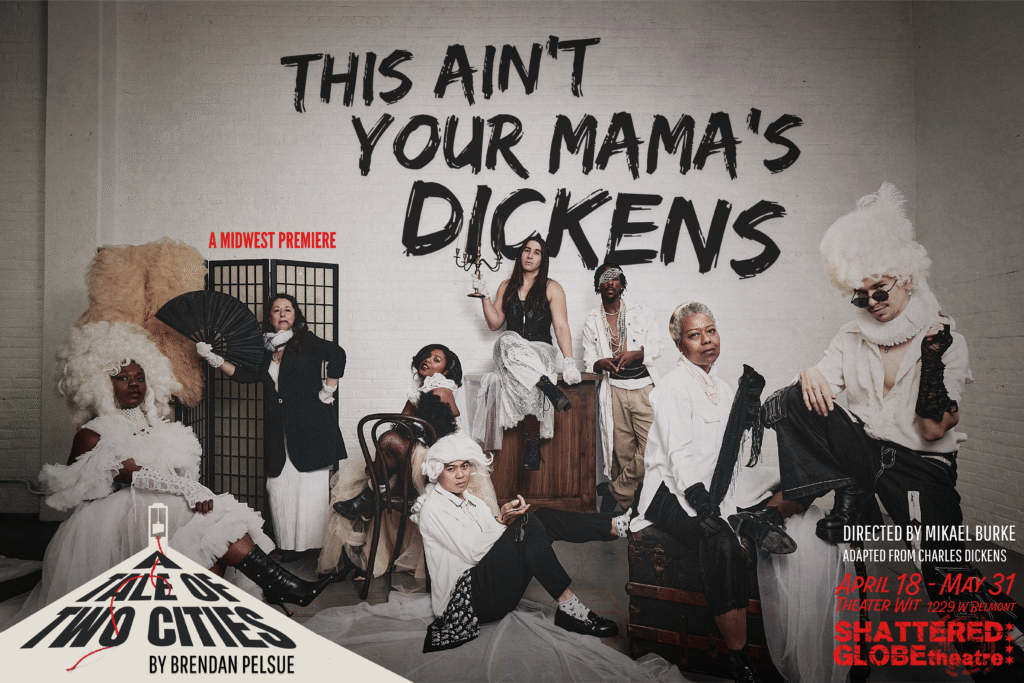
Shattered Globe Theatre through 5-31
Highly Recommended
It is indeed the best of times and the worst of times in this reimagining of Charles Dickens’ masterpiece A Tale of Two Cities. Shattered Globe’s creative, spunky production captures the brilliance and moral depth of Dickens’ masterpiece in a way that both honors and updates this classic.
A Tale of Two Cities is my favorite Dickens novel but I suspected I would not be disappointed at Shattered Globe. I applaud recreations of great works of art and this is one. Might devout Dickens fans be offended? Perhaps but if you share my view that great works can and should be modernized for our times, and that such reinventions offer new insights, then Brendan Pelsue’s adaptation is for you.
For starters, it gives us a Black Madame LaFarge, and many of the story’s oppressed are Black. I found myself asking, “What took so long for someone to figure out that this is an essential update?” The fact that not all the poor and downtrodden are Black, and that we have equally diverse upper classes in this multi-racial cast, cuts through any possibility of linking class and race. Kudos to all for that sensitivity.
Humor is also often present in this A Tale of Two Cities, and it works wonderfully well. Eight actors handle their multiple roles with charming moments when they punch a fist through the Fourth Wall by stopping and turning to another cast member to ask, “Wait. I’m So-and-so now?” It’s delightful without being disruptive, and it brings the audience into the painful but often ridiculous world of life in a royal and/or dictatorial tyranny. It also connects this production to a long line of human efforts to cope with such horrific circumstances through humor.
Director Mikael Burke and his talented cast exhibit a zest that succeeds at conveying pleasure, pain, irreverence and provide some much-needed comic touches. All of the actors play multiple roles and there isn’t a weak one in the corps. Penelope Walker persuasively captures the strengths and frailty of Dr. Alexandre Manette, whose long imprisonment in the Bastille is at the center of Dickens’ book. Demetra Dee is equally effective as his beautiful, devoted daughter Lucie Manette and the cruel marquis whose heartless murder of a child kicks off the French Revolution. Jazzma Pryor is an excellent Madame Thérèse Defarge, relishing her role as the evil manipulator whose quest for justice often makes her a heartless judge. Jeff Rodriguez’s Louis XVI is delightfully goofy as the wiggy and clueless king, and properly serious as Monsieur Defarge, standing by his wife. Diego Vazquez Gomez is a steadfast Charles Darnay embodying the morals of the aristocrat who renounced his family’s lineage and wealth in favor of justice and equality for all classes. Glenn Obrero plays Sidney Carton, his brash but ultimately heroic lawyer with passion. William Anthony Sebastian Rose II brings ideal touches to several roles. The same is true of Daria Harper though she excels as the narrator who, using a ball of red yarn, keeps a bloody narrative thread running through this complicated story.
What a joy it is to see a work of genius made new with such skills. It seems only appropriate to return to Dickens’ opening words: “[T]he period was so far like the present period, that some of its noisiest authorities insisted on its being received, for good or for evil.” And yet, as part of my recommendation that you rush to see this adaptation, I look to Dickens’ hopeful closing in which a man reflects on his life, “I see a beautiful city and a brilliant people rising from this abyss,” he says, “and, in their struggles to be truly free, in their triumphs and defeats, through long years to come, I see the evil of this time and of the previous time of which this is the natural birth, gradually making expiation for itself and wearing out.”
A Tale of Two Cities is always a tale for our times. Shattered Globe’s adaptation brings it into our current century and makes it even more universal.
At the Wake of a Dead Drag Queen
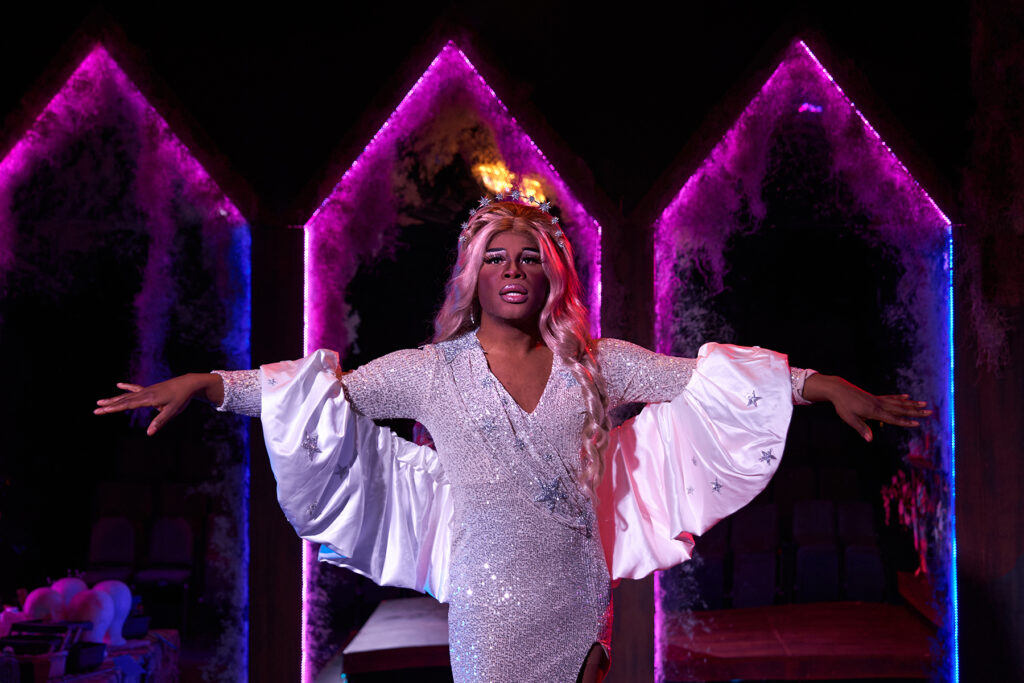
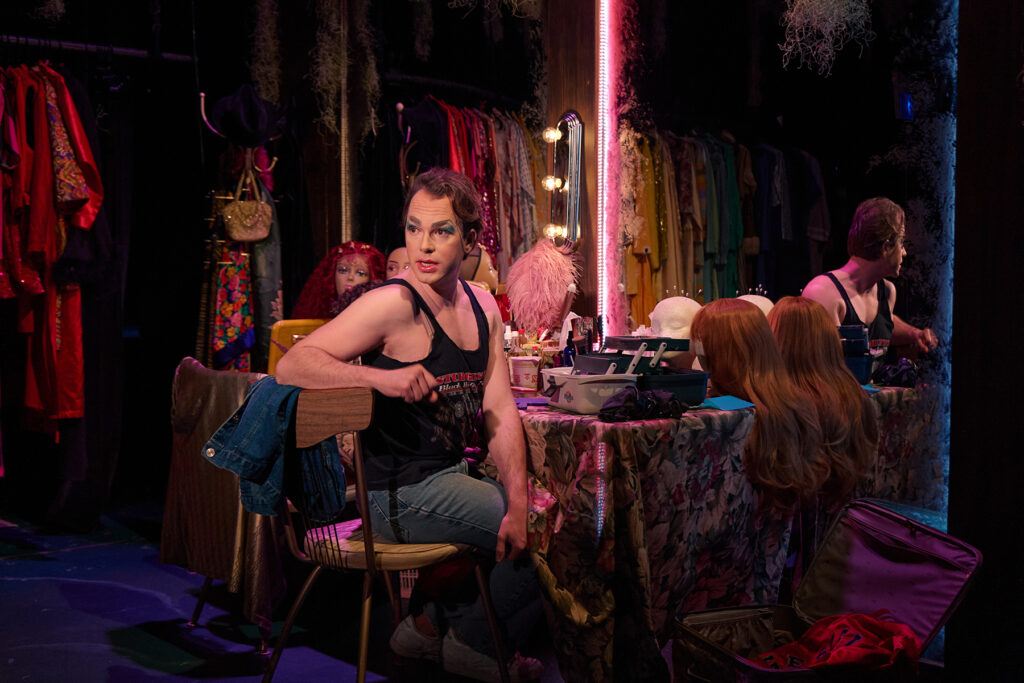
Highly Recommended
From the moment you are handed a fan instead of a program, you know you are in for an evening that will be hot and heavy – and I mean that in every sense of those words. Fortunately, it also turns out to be a lot of fun. The best funerals, wakes and memorials are ones that embody the deceased while giving the living a place to mourn and celebrate them. Terry Guest’s At the Wake of a Dead Drag Queen does just that with sass and style.
This is an homage to Guest’s Uncle Anthony, who died of AIDS at 35, and Guest makes liberal use of the facts of his uncle’s life. Guest wrote his piece about a Black drag queen in the rural South during Donald Trump’s first term as president. Its 2019 premiere was a hit. Now that Guest is 35, the age at which his uncle died, and the rights and safety of Blacks and LBGTQ+ people are again in danger, it seemed the piece needed to be done again.
As Courtney Berringers, Guest is a splendid drag queen, bejeweled, well-wigged and wrapped in skintight shimmery gowns as he lip syncs and struts his way through songs including the iconic showstopper “I’m Every Woman.” Offstage he is more raw and real, revealing a tender side in affairs of the heart and family history. Equally impressive is Paul Michael Thomson, reprising his role as Vicky Versailles, the drag queen of Courtney’s dreams – mostly. Thomson is a co-star of equal talent who never steals the spotlight. Under the fine direction of Mikael Burke, who’s done excellent work on other Chicago stages including the premiere of this show, these two play with and off each other with relish.
In this time of so many troubles, it seems right to be reminded that AIDS is still with us, along with a growing list of other illnesses and evils. It also seems necessary that we face this continuing killer and our times with heart, strength and humor. From the minute Courtney Berringer steps onstage to welcome us to her wake, we can tell it will be a deliciously wild ride filled with flash and the pain that comes with hearing the truth and we will be uplifted along the way. What an excellent way to spend Memorial Day weekend.
Hymn
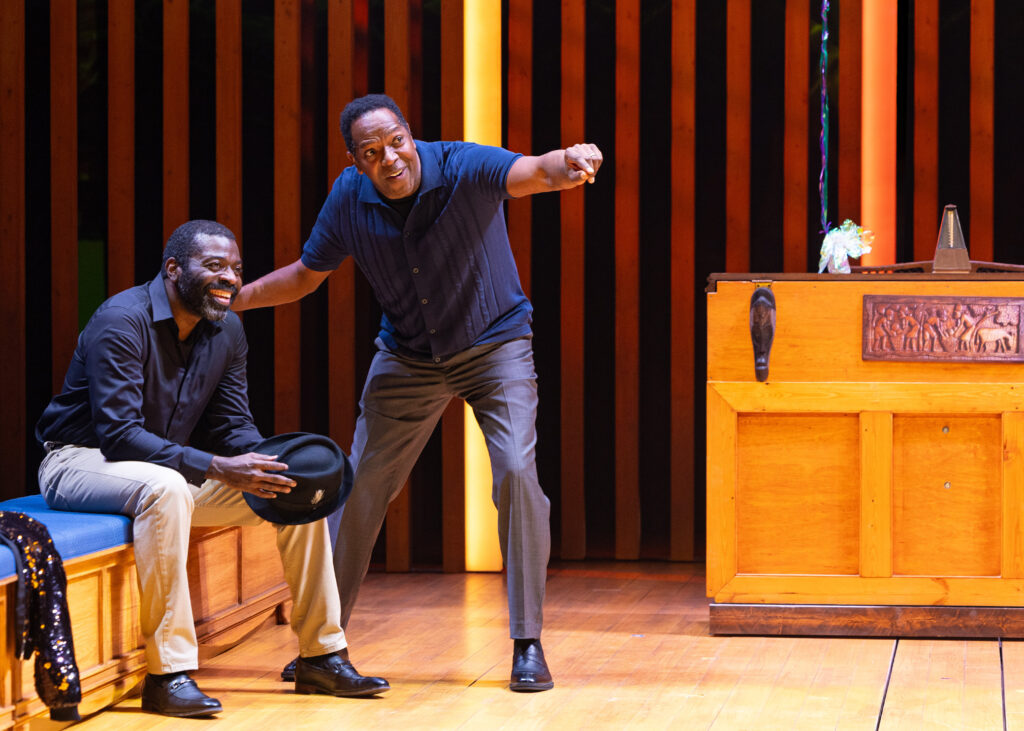
Chicago Shakespeare Theater through May 25
Highly Recommended
Sometimes intimacy offers insights that get lost in a larger play, and so it is with the show now at Chicago Shakespeare Theater, a paean to Black men and their relationships.
Discovering unknown siblings born out of wedlock is not a new story – just look to Steppenwolf’s recent Fool for Love, the searing and tragic rural white take on this matter – but there are many intelligent nuances in Hymn that lift it to a different level. Here two brothers in their 50s discover their biological connection at their father’s funeral. They then try figure out what that means, and how to cope with these new family dynamics that connect their previously unfamiliar relatives. Such a surprise can offer people a chance to remake themselves but it also introduces them to the ugly reality of an unsavory and upsetting side of a parent they thought they knew.
Playwright Lolita Chakrabarti relocated Hymn to the South side of Chicago after its successful London world premiere, and that part of our city offers a believable home for this love song to the power of brotherly bonds and Black male friendship. The characters and settings were familiar to me and will be to anyone who’s from or has visited friends on Chicago’s South Side. The friend who accompanied me found herself particularly moved as a Black woman. Yet those details, and the top-notch actors, made this specific location both unique and universal. No doubt that is thanks to Ron OJ Parson’s hallmark spot-on and sensitive directing, and the talents of his cast.
James Vincent Meredith’s applies his usual versatile skill to Gil, the older brother, nimbly navigating the changes of a man who appears successful and strong but goes through much in Hymn. Chiké Johnson is a persuasive Benny, the younger brother who seems to be the less fortunate and weaker of the two at the start of the play. Johnson expertly reveals his many sides and strengths. A scene in the gym where the duo works out together reveals the realities of each man with humor. The two are at their best when they are bonding while dancing to the songs that were part of their separate youths. In fact, music is very present in this play whether it in the ‘80s songs that are impossible not to move along to or because of a piano that has a powerful though usually silent presence.
Yvonne Miranda’s costumes define each man yet change with the times and with their wearers while advancing the story. Rasean’s Davonté Johnson’s projections put us smack dab in South-side homes, junk rooms, gyms and more.
Hymn is a tribute to Black male friendship, to brotherhood, to fathers and how we measure up and fail them that you don’t want to miss. It will make you laugh, touch you and help you understand the complexities of these lives we live.
Wonderful Writer Preview
Ocean Vuong: The Emperor of Gladness. A conversation on loss, hope, and second chances

Chicago Humanities Spring 2025 Festival, Athenaeum Center for Thought & Culture, May 22, 7 PM
On Earth We’re Briefly Gorgeous left me breathless when I encountered it shortly after its 2019 release, not only for its beauty but because it was a startling fresh voice. I listened to its author, Vietnamese-American Poet Ocean Vuong, read, which endowed it with even more meaning and sadness than is sometimes the case with authors or audiobooks. I like hearing and telling stories, one of the reasons I became an audiobook addict, and this one stood out even among those narrated by the best actors and readers.
Vuong’s first novel, a poem/letter to his mother, is ripe with glorious imagery, pain and insight so it was not just his reading that lifted this book to my shelf of favorites. I was aware from the first page that there was something arrestingly different about his talent. That perspective comes from having read thousands of novels and poems, interviewed hundreds of authors and spent some time as a reader and Poetry Co-editor for the nearly 80-year-old Chicago Review.
I still rave about On Earth We’re Briefly Gorgeous to friends and acquaintances because it is still very much with me. If you’ve not read it, do!
My continuing passion about the book why I can’t wait to hear Vuong talk about his new novel, The Emperor of Gladness, at Chicago Humanities Spring 2025 Festival. There are still some tickets left and you can find them, and a list of other programs, at Events – Chicago Humanities Festival.
Raves
The Book of Grace
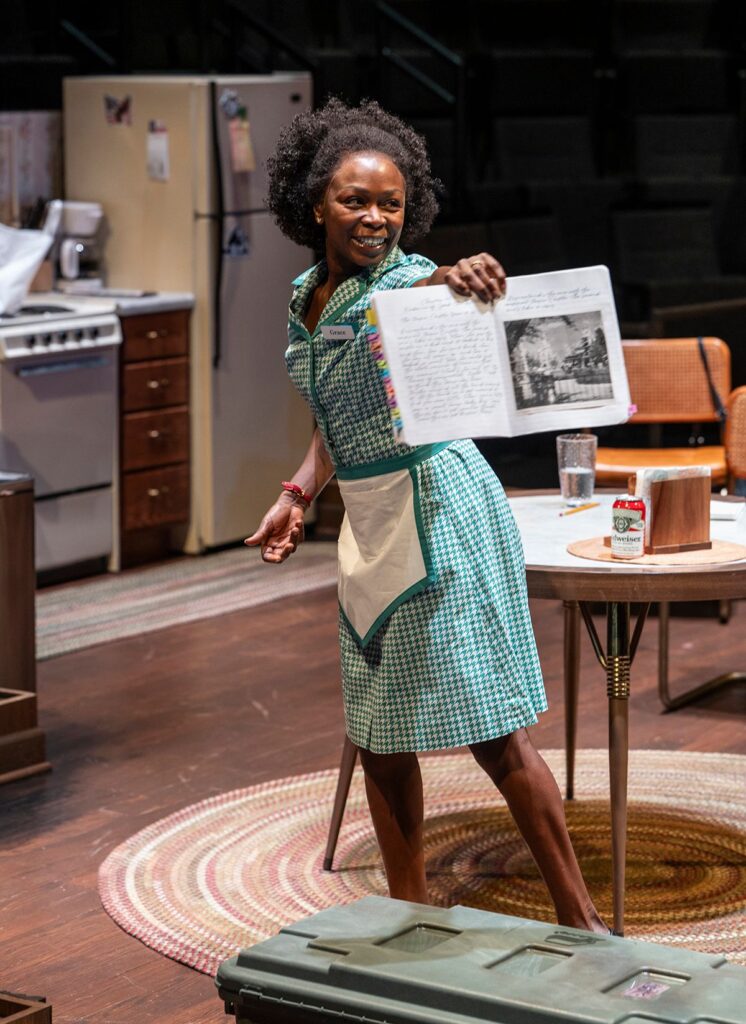
Photo by Michael Brosilow.

Steppenwolf Theatre Company through May 18
Highly Recommended
When a beautiful petite waitress in a blue-checked diner uniform walks onstage and starts to talk, her quirkiness, warmth and humor are irresistible. Then you meet her husband. He is fulminating about aliens – no, not that kind – as he irons his border patrol uniform, making sure each crease is perfect.
To say Grace and Vet are a mismatched couple would be beyond diplomatic. She is filled with irrepressible hope; he is overflowing with fizzing rage. After some reassuring and flirtatious marital conversation, Grace heads off to the diner and Vet continues to prepare for his work when a handsome young man appears and knocks on their front door. It turns out he is Vet’s son.
There will be no embrace despite a 15-year estrangement. Rather, in true border-patrol style, Vet pats him down and takes all the necessary precautions one would intercepting someone crossing the border illegally rather than one’s long-lost son. Buddy, this son, doesn’t seem to mind. In fact, he acquiesces, displaying his own military training.
What unfolds in the next two-and-a-half hours touches on the saddest of age-old family conflicts, of lies and deceits and heartbreak. Yet the complications and potential happiness of this blended Black family are handled with such sensitivity, skill, intensity and humor that the time flies by, and the audience is drawn into this story completely.
Every one of the three actors is sublime. The range of emotions – from forgiving love to incredible sadness to empathy to rejection to hope – that they are able to convey is evidence of their skills.
Zainab Jah glows as Grace, her open, sunny face a beacon for hope of the very sort with which she fills the pages of “The Book of Grace” that she is secretly writing. Her wiry frame bursts with joy at good memories and the happy news stories she’s collecting. Yet Jah easily shifts to a soft persuasive spouse or stepmother intent on reconciling the men in her life, this father and his son from a previous marriage.
Brian Marable, as her husband Vet, brings the right kind of rage to his role, one that makes him attractive and likeable in the first half despite his ranting, but is revealed as something entirely different as the play progresses. Marable came late to his show, replacing the actor originally cast just over two weeks before opening, which makes his performance even more impressive.
Namir Smallwood, hot off his success in Primary Trust at Goodman Theatre, is ideal here as the damaged son. His face, with its quicksilver emotional shifts, and always-on-alert body showcase Smallwood’s focus and talent in completely inhabiting his characters, which made him so charming at Goodman. Smallwood’s hallmark intensity is perfect for The Book of Grace. His tight portrayal of a wounded man, here to celebrate an award his father is receiving, and increasingly grateful to Grace for her support, optimism and, well, grace, is ideal – and full of surprises.
This top-notch trio lifts Playwright Suzan-Lori Parks’ The Book of Grace to a different level under the sure-handed direction of Steve H. Broadnax III. Arnel Sancianco’s small-town with its neat kitchen, unpretentious living room and backyard offers a believable setting to highlight the action.
The Book of Grace is a deeply layered play that comes at family relationships with a complexity expressed through its profoundly intelligent and driven characters. It is an excellent embodiment of the domestic intensity for which Steppenwolf is revered. This provocative and beautiful piece will pull you in, expand your understanding of difficult issues and hope in ways that may surprise you and alter your perspective. Isn’t that what theater should do?
Musical Magic Previews
International Contemporary Ensemble
April 26 and 27

Chicago is now a hub for contemporary classical music so we will get two performances by the International Contemporary Ensemble better known as ICE. No not that one. This ICE is a group of 34 musicians who have been challenging and delighting audiences for nearly 25 years.
They’ll be back in Chicago this weekend for the Northwestern University New Music Conference, an exciting event in and of itself. In the decades my late husband and I enjoyed ICE performances, we were always impressed by the cutting-edge interpretations of new music, and the skills and sensitivities of the extraordinary musicians who performed them.
Get the details at ICE at Northwestern University New Music Conference — International Contemporary Ensemble so you don’t miss the chance to see not one but two ICE concerts this weekend, Saturday, April 26 and Sunday, April 27th.
Calco Presents Nova Zaii
April 26 at 8 PM

The next Calco concert could transport you to celestial heights. Check out the musical genius of Chicago Artist Nova Zaii, who employs his technical smarts to summon up music simply by touch.
Calco concerts are now a must for me because the quality of the performers, the diverse-by-every-measure crowd, the spectacular space with its view of the Chicago River and the joyous-but-chill vibe.
Last month we danced ourselves silly to the sounds of the Chicago-based Brazilian trio Bossa Três. I raved about Anaiet Soul’s February performance to anyone who would listen. Enjoy one of her songs from that show at https://drive.google.com/file/d/1BMZyFIv1S-EVwsCc6nitUBkcVRJmgHZK/view?usp=drivesdk.
Calco Curator Giovanna Boffa, the daughter of friends, continues to delight everyone I bring to the Calco shows at Rockwell on the River with her musical choices. Make sure you catch Drummer Nova Zaii’s performance show this Thursday!
Raves
The Winter’s Tale
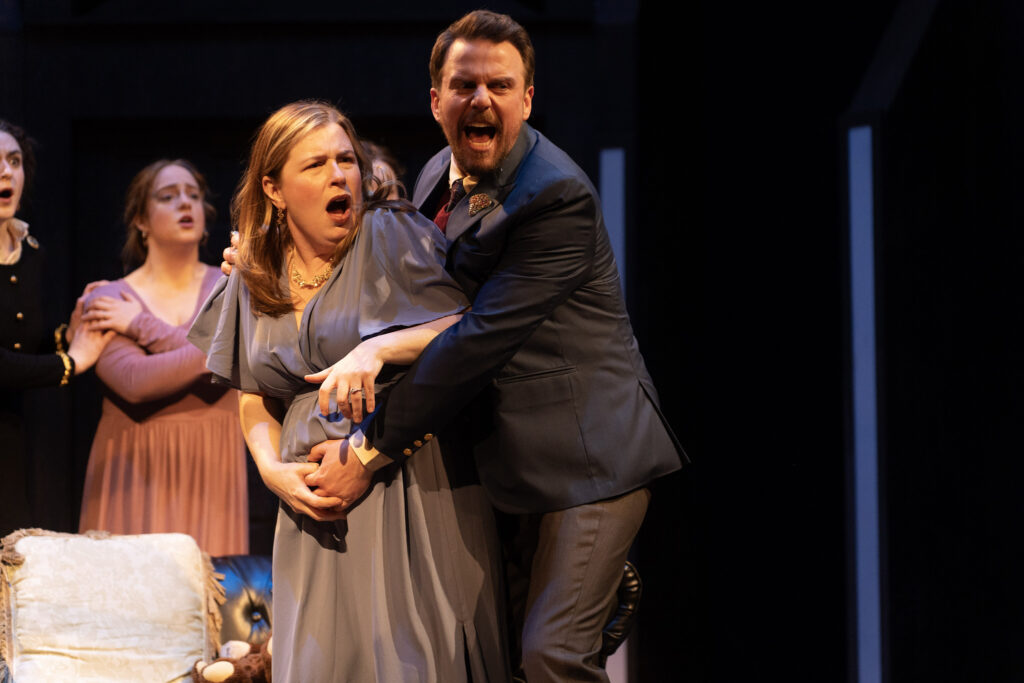
in The Winter’s Tale.

Photos by Aaron Reese Boseman Photography.
Invictus Theatre Company through April 20
Highly Recommended
When the second half begins with an actor solemnly blowing on an unfurling party favor, it’s clear Invictus Theatre’s take on The Winter’s Tale will diverge wildly from any you’ve previously seen.
Yes, there is the Lear-like moment of rage though here the baseless banishment of a queen stems from jealousy. Yes, there is a case of mistaken identity. Yes, there are the removals and murders of royals. Yes, there are the young lovers, one with a secret identity. Yes, there is the classic Shakespearean contrast between the restrained but often joyless royals and their courtiers and the far-less-refined but definitively happier shepherds in the forest.
This story is a classic one familiar to fans of the Bard and of fairy tales: King Leontes of Sicily suspects his beloved pregnant queen of infidelity with the King of Bohemia, who is his childhood friend. Leontes tries and banishes her and all their progeny, condemning them to death. That’s the first half of The Winter’s Tale. The second half erupts in joyous mirth peppered with somber scenes of Leontes’ descent into madness. It is what Shakespearian experts call a “problem play” because of its very different and seemingly united halves so it is rarely done but I’ve always found it intriguing and moving. Besides it has one of William Shakespeare’s two best stage directions – the first being “Enter Ghost,” which kicks off Hamlet. In The Winter’s Tale the excellent stage direction, “Exit, pursued by a bear,” does not appear until Act III but it heralds one of the most amusing murders in the Bard’s oeuvre.
Queen Hermoine’s warm and loving relations with her son and members of the court are interrupted by King Leontes’ rage. “You speak a language that I understand not,” the queen tells her husband during her trial, as he scoots around the stage in a wheeled throne full of menace and disdain. Andrea Uppling gives us an admirably calm and reasonable Hermoine, who protests her fate with a love that cannot erase her husband’s irrational rage. Michael Stejskal skilfully captures Leontes wild range of emotions, from blind fury to deep depression to forgiveness and remorse. His body maps the king’s bitter rage with staccato moves, his despondence with diminished posture familiar to anyone who’s had a depressed loved one, his love and forgiveness with a lift of his face and limbs.
Sicilian Noblewoman Paulina is played by Amber Dow with courage and power, standing up for her queen to a king blinded and crazed by jealousy as his courtiers look on, unable to stop him. She does this at a time in which women were usually powerless to assert such authority. Paulina takes the rational human approach in her pleas to the tortured king. She is the moral compass, a force urging fairness and love. Sicilian Nobleman Camillo plays a similar role on the king’s side but his nature is less forceful and brave. Kim Pereira conveys Camillo’s tortured efforts with grace.
And then there’s that second half…
Sam Nachison nearly steals the show as Autolycus, a flim-flam traveling salesman. In the spirit of the best Zero Mostel moves – think his brilliance in The Producers – Nachison introduces himself with a riotously polished full-body pickpocket that masquerades as a striptease. His elastic face, fine singing voice and comic bits are unmitigated delight.
Much of this second half of The Winter’s Tale belongs to those shepherds and their entourage, who bring an ebullience to this production. The shepherds’ bawdy humor called to mind a line from a much sadder Shakespearian monologue. “There with fantastic garlands did she come / Of crowflowers, nettles, daisies, and long purples / That liberal shepherds give a grosser name,” Laertes says, as he describes Ophelia’s drowning in Hamlet, “But our cold maids do dead men’s fingers call them.” When I was learning this speech at age 15 for drama class, my professor father helped me understand it line by line. “Think about it,” he instructed when it came to those liberal shepherds until my face showed I’d figured it out. I ask the same of you. Pause. Indeed! Shakespeare always lifts the happy-uneducated-peasants-versus-smart-tortured-denizens-of-the-upper-classes cliché right out of its stereotype, and he does so again in The Winter’s Tale. The lines from Hamlet seem the perfect encapsulation of this “problem play,” as well as Shakespeare’s delight in teasing out the complexities of life and opposites in his characters.
There isn’t a weak actor in the corps of 16, even more impressive given that most play multiple roles with talented élan. Their work is by improved by many other talents. Charles Askenaizar’s sure-handed direction marries this play’s two worlds and styles. Jessie Gowen’s modern-yet-classic court costumes and silly outfits for the forest crowd differentiate the distinct groups and enhance the action. Jen Cupani’s choreography lets all strut their best stuff. Kevin M. Rolfs’ flexible wooden set with a circle surrounded by openings, a castle-like door and the suggestion of a drawbridge with a ramp for the court scenes is inspired. That ramp becomes the gateway to the forest where, under the trees that flank the stage, form a perfect canopy and surround for the cavorting shepherds and their friends. Randy Rozler’s props include the striking use of candles carried in by the royals and their courtiers, who set them down around the edges of the stage in a manner that both redefines the space as a quiet nunnery, in which stands a statue of the queen, and adds dignity to her regal presence. Petter Wahlbäck’s original score is brimming with luscious music, expertly performed by the actors and a five-piece instrumental ensemble.
It all adds up to an ideal Shakespearian experience, not to mention a seasonally appropriate one that travels from the grim cold of Winter, with its economical and serious emotions, to the fulsome unfolding of Spring, replete with its joy that welcomes new life. Treat yourself to this resplendent awakening while you have the chance. It will lift your spirits.
Musical Magic Previews
Remedios Varios: Para Las Aflicciones Del Cuerpo Y El Espíritu (For the afflictions of body and spirit)
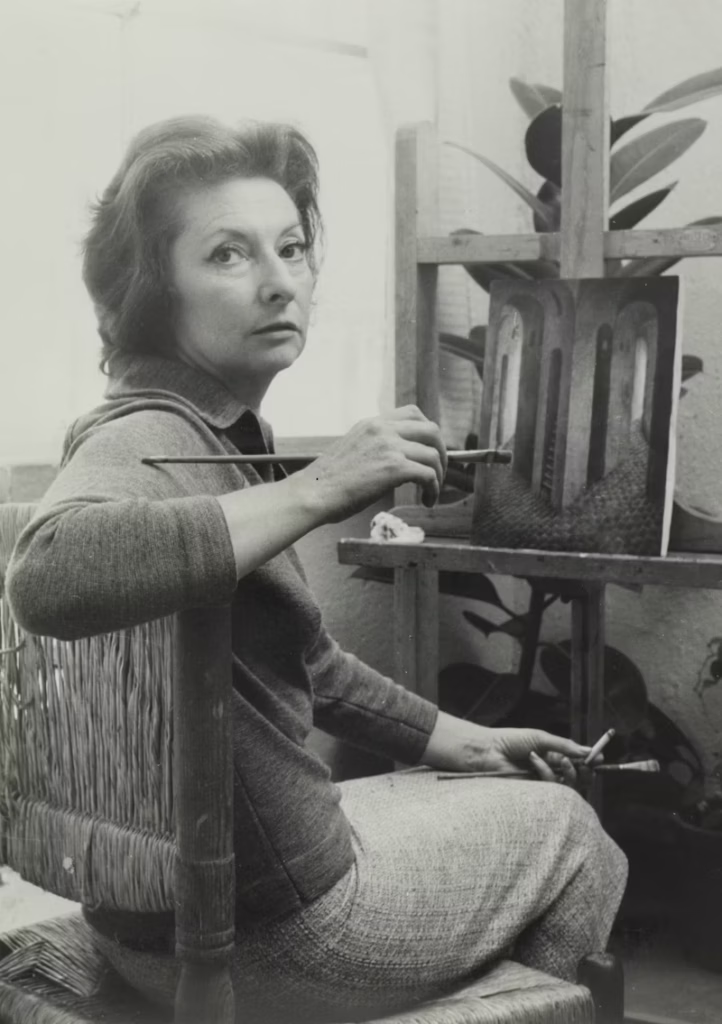

Inspiration came to Carlos Carrillo in the middle of an exhibit of an artist whose paintings he’d never seen before. The Puerto-Rican born composer was working on an opera for Chicago Opera Theater as part of its Vanguard Initiative, described as an “immersive residency” for those who have never composed an opera.
There Carrillo stood surrounded by otherworldly creations in the 2023 Art Institute of Chicago exhibition Remedios Varo: Science Fictions. Varo was a refugee, first from her native Spain to escape the Spanish Civil War, then from Paris to escape World War II. She went to Mexico where she spent the rest of her life as part of its vibrant art scene. There, she and two other female Surrealists became known as “the three witches” for their fantastical artwork about the lives & power of women.
“As I was going through the exhibit, I was building a story,” Carrillo recalled. “By the time I got to the triptych, I had the story.” That story grew from the three-part painting at the end of the exhibition and it became Remedios Varios: Para Las Aflicciones Del Cuerpo Y El Espíritu (For the afflictions of body and spirit). Carrillo’s opera will be performed April 5.
“There was a communication between my ideas and the paintings,” said Carrillo, who was moved by the connections Varo made. “She talked about music in a mystical way. There’s a lot of instruments in her painting, and she talked about music opening this door.”
Like Varo, Carrillo is an artist whose work makes connections across the arts. “I need that,” he said, noting that he “grew up in a generation [that] read everything.” He attributes some of his natural curiosity to his Puerto Rico education that involved reading and studying across disciplines. “I love knowledge, and I want to know more,” he said. Carrillo’s education continued at the Eastman School of Music from which he earned his undergraduate degree, at Yale University at which he received a masters in music and at the University of Pennsylvania at which he completed his Ph.D. At each place, he said he was fortunate to study with musical giants. He followed in their path by teaching at DePauw University, Reed College and the Conservatory of Music in San Juan, Puerto Rico before joining the University of Illinois Urbana-Champaign School of Music faculty.
Composing music about the visual arts can be challenging. “It triggers something in the imagination that is not a one-to-one correlation of what the painting has,” Carrillo explained, adding that with Varo’s art led to “a communication between my ideas and the painting.” The encounter caused him to ask, “What is the meaning of this?”
The Varo-inspired opera gave Carrillo the chance to practice an important element of his craft – using his art to address politics, which are particularly precarious for artists and professors in this moment. “Opera can be entertainment but it can also be a response to what’s happened,” Carrillo noted. “In society things happen, oppression and fights … In society, what you have left is the music, the paintings, the books so the art remains behind – a symbol of what happened, testament of what we fought. … My response to things that are happening in society is opera, this work of art.”
COT describes Carrillo’s opera as the story of an herbalist who “struggles to heal a community afflicted by a siege of maladies and a homesick boarding-school student dreams of escape. … This searing new opera looks at a culture rapidly strip-mining itself of its riches, and embraces the realm of the imagination as fertile ground for regeneration.”
When asked how he would describe the music he composes for those unfamiliar with opera or contemporary classical music, Carrillo’s answer is simple: “I think it’s beautiful.” He knows that word is often eschewed by those in the arts but it is a value essential to his creative process and music. “The idea of beauty, I define it,” Carrillo explained. “I’m not trying to write for a particular person. I am trying to create something that it is important to me and hope people will connect with it.”
Make your Carrillo connection this Saturday, April 5th, at the Chicago Opera Theater premiere of Remedios Varios: Para Las Aflicciones Del Cuerpo Y El Espíritu (For the afflictions of body and spirit) at The Athenaeum Center for Thought and Culture.
Calco Presents Bossa Três

Celebrate Spring with some Samba steps this Sunday courtesy of the Chicago-based Brazilian trio Bossa Três. Aside from its danceable music, you’ll be doing your Bossa Nova with an excellent view of the Chicago River because the show is part of the Calco series at Rockwell on the River, a lovely spot nestled on the North Branch.
I happened on this series thanks to the daughter of friends. Giovanna Boffa, who curates Calco, collaborated with the Cool Beans Expat Club to bring Bossa Três Singers and Musicians Heitor Garcia, Dill Costa and Edinho Gerber to perform this weekend.
I raved about Anaiet Soul’s Calco performance to anyone who would listen. You can watch one of her songs from that February show at https://drive.google.com/file/d/1BMZyFIv1S-EVwsCc6nitUBkcVRJmgHZK/view?usp=drivesdk
I expect the same level of artistic talent this weekend so I wanted to let more people know about this lovely series and its next show. Don’t miss it!
Raves
Guys and Dolls
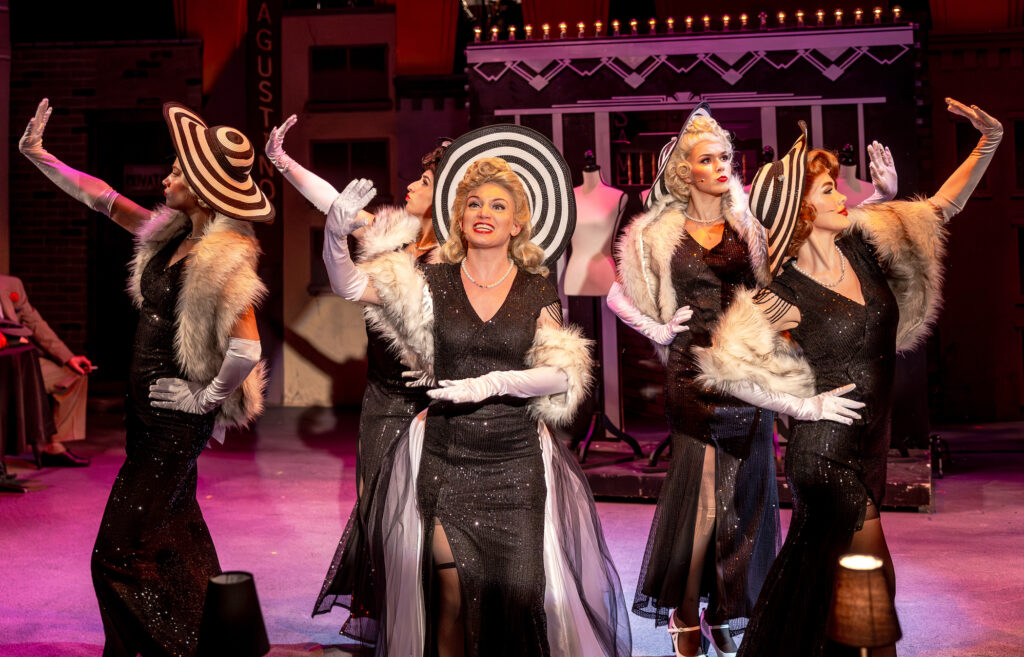
Holland and Emma Jean Eastland perform “Take Back Your Mink.”
Photo by Brett Beiner.
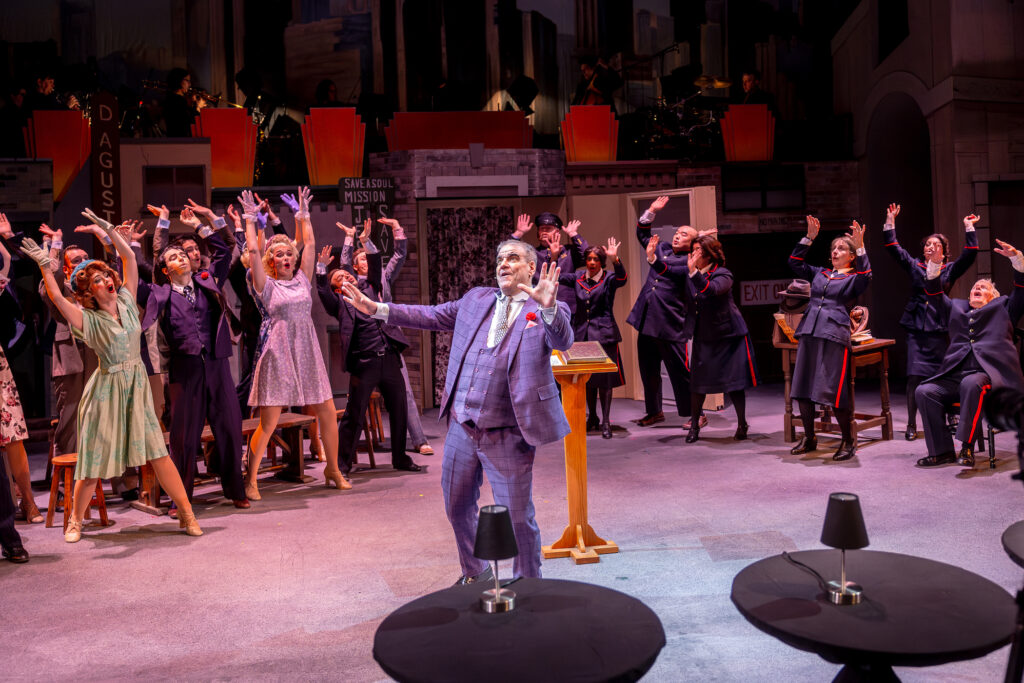
Boat.” Photo by Brett Beiner.
Music Theater Works through March 30
Highly Recommended
From the first lyric until the last, the gentleman in front of me mouthed every word to every song. He made no noise so as not to disturb those sitting around him, but, like so many of us, he was unable to resist participating as Frank Loesser’s music and lyrics sped by. Shortly into the first act, his wife of 57 years put her hand on top of his. He covered it with his other hand and, together, they delighted in Music Theater Works’ snappy, exuberant production of Guys and Dolls, giving an unofficial review that rang truer that any words I might offer.
For those yet to be infected by its charms, Guys and Dolls is based on popular short stories by Newspaper man Damon Runyon that chronicled and captured the personalities in New York’s underground criminal world of the 1920s and 1930s. Songwriter Frank Loesser’s lyrics and music won the show a Tony. The central storyline follows Nathan Detroit, a gambler who needs cash to finance the “oldest established permanent floating crap game in New York,” and Miss Adelaide, his fiancé of 14 years who earns her living as the lead singer and dancer at the dubiously named Hot Box Club. Another major storyline emerges when Sky Masterson, the cooler-than-cool wandering gambler just back in town, bets Detroit that he can get the all-business head of the Save A Soul Mission to Cuba.
Sasha Gerritson directs this Guys and Dolls with verve, and the ability to summon up the softer sides of her top-drawer actors. The result is a marvel in every way, starting with the way it honors the iconic original, and continues the fine tradition of this most magical of musicals. One of the great pleasures of Guys and Dolls is that it is a musical with many excellent, juicy roles from the romantic leads to the gaggle of gamblers to the Hot Box chorus.
Kristin Brintnall is the ideal Adelaide, loving and loyal to her man, sweet and dyed blonde-pretty but tougher than a $2 steak. Don’t let the cherry costume she inhabits for “A Bushel and a Peck” fool you. Who could resist a song with lines like “The cows and chickens are going to the dickens! / ‘Cause I love you, / A bushel and a peck, / You bet your pretty neck I do.” I could never have imagined the song’s origin when my dear mother crooned it to me during my childhood years. And that’s not even Adelaide’s best number. It’s a toss-up between “Adelaide’s Lament,” in which she lists the sickly symptoms the psychology book she’s reading suggests could be a result of waiting 14 years to marry her beloved Nathan, and “Take Back Your Mink,” a vehicle for Adelaide’s feistiness, delivered with relish by Brintnall. The latter is a song about a woman who thought gifts from the man courting her were authentic emblems of his love, only to discover that they were a means of employing his carnal desires. “So take back your mink / To from whence it came,” Adelaide sings with delicious grammatical class mistakes that would have enraged Samuel Johnson, the esteemed English writer and lexicographical grump bucket who despised those unaware that “whence” means “from where.”
The choreography was so spot on in this number with it’s ironic, riotous semi-striptease by Adelaide and her chorus that forgiveness is possible for all but Mr. Johnson and perhaps one person in the opening-night audience. A teenager, there with a man presumably his father, put his head down in the particularly intimate moment when Adelaide and her dancers’ attire began to disappear. What a period-perfect reaction for a young man, and more proof of the magic of this musical. Behold: It can even transport teens back to an age of greater modesty.
Guys and Dolls is deliciously infectious. It was my late husband’s favorite musical, and it soon became our children’s. When our youngest was five, they stood up in their chair at dinner, threw out their arms and belted out “Take Back Your Mink.” We were sticklers for table manners so my husband inquired, “Just what do you think you’re doing?” Our youngest responded, “Performing ‘Take Back Your Mink’ in a perfect New York accent.” We couldn’t disagree so the performance was permitted at table.
Back to this show though: Callan Roberts nails Nathan Detroit, Adelaide’s evasive lovebug, with his energetic shifts from adoring his allegedly intended to keeping ahead of her demands, and those of the gambling gaggle, plus avoiding the Irish cop trying to bust up the craps game. Though neither Nathan nor Adelaide are tall, this power couple possesses enviable energy and wiry athleticism whether it’s in Nathan’s close calls or Adelaide’s dancing.
The other love match is easily their equal and their mirror image. The two women are do-gooders lamentably in love with gamblers; the men return that love but have trouble embracing their women’s picket-fence dreams. Missionary Sarah Brown starts a bit stiff but Cecilia Iole comes into her own with definitive assurance about the moral state of the universe before her delicious derailing due to love and spirits. As her corrupter, Jeffrey Charles is an almost baby-faced Sky Masterson, but that cute face registers an impressive range of emotions that chip away at the cool façade Sky Masterson must possess.
Then there are the not-so-minor characters with fabulous names like Liver Lips, Angie the Ox and Rusty Charlie. Cary Lovett conveys the not-as-dumb-as-he-seems clumsiness of Nathan’s sidekick Nicely-Nicely, especially when he leads the gamblers posing as Christian converts in a rousing version of “Sit Down, You’re Rocking the Boat.” When Bob Sanders, Sarah’s sensible grandfather, sings the “More I Cannot Wish You,” his gorgeous voice enhances his heartfelt counsel to his granddaughter about love.
There isn’t a weak link in this dramatic corps. The actor/dancers sing like angels despite their devilish sides and dance with gusto and grace. Clayton Cross’s precise, ebullient, often elegant choreography shows them off to full advantage in both bring-down-the-house numbers and gentler love songs. Bob Kuhn’s costumes provide the right flash for the Hot Box Club dancers, the primness necessary for the missionaries and the duds gangsters dream about.
For the long-time fans, like the accomplished actor friends who accompanied me, this is an ideal Guys and Dolls. But not to worry if you are not an aficionado because you will leave this show elated and converted, much like the modest teen who smiled and applauded at curtain call. Our 57-years-married couple get the last word: They really enjoyed it! Follow their lead and make sure to see this gem before it closes.
Hedda Gabler
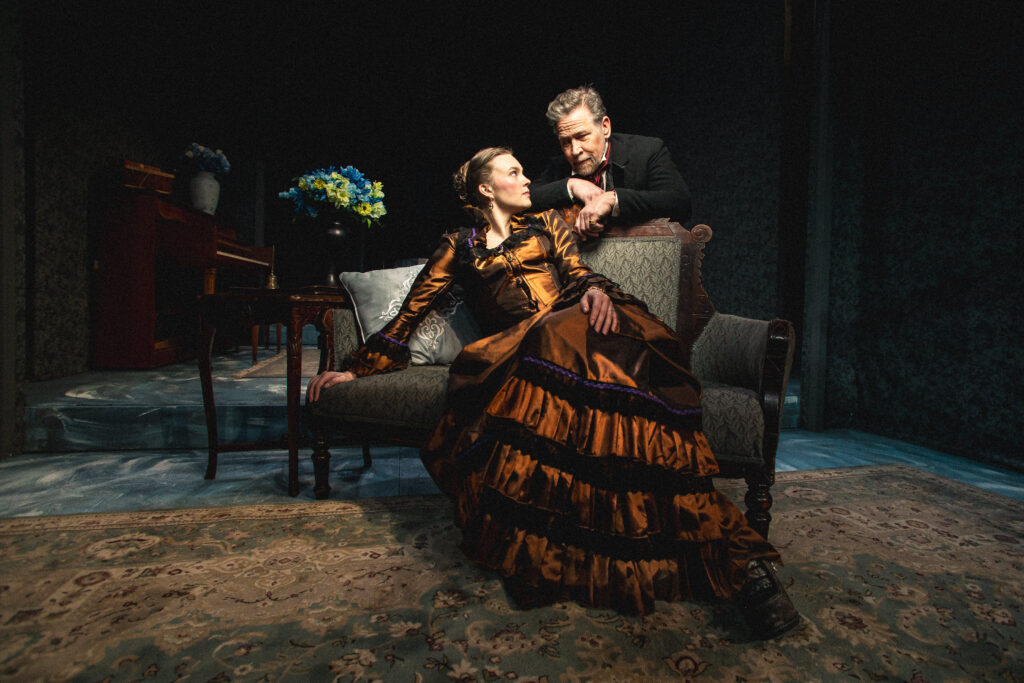
Artistic Home through March 30
Recommended
There’s a heartless new Hedda Gabler in town and she’s throwing her eponymous play on its head.
Controversy is nothing new for Henrick Ibsen’s play, which was interpreted for decades as a Feminist cautionary tale of what happens when strong, smart women are trapped by societal restraints, and, more recently, as a tale of mental illness with a woman who has borderline personality disorder. Whatever one’s take, we can agree that this is the story of a smart, strong and privileged woman married to an adoring husband whom she does not love, and facing a life of smalltown boredom.
In Mark O’Rowe’s adaptation, Hedda is less a Feminist hero or victim than a Gorgon. This is not easy to pull off but Brookelyn Hébert is maliciously icy and manipulative as the beautiful but bored new wife realizing how her tedious life will unfold. Todd Wojcik plays Jorge Tesman, her besotted but clueless husband, with a well-tuned mix of solicitous kindness and naivete about who his wife really is. John Mossman nearly steals the show as the smart but sly Judge Brack. He understands Hedda better than her spouse, and is delighted to play dangerous games with her. Dan Evashevski mimics Hedda’s mood swings expertly as Ejlert Lovborg, her passionate equal of interest.
Despite the talents of these four – and the rest of the fine actors who benefit from Monica Payne’s sure-handed but sensitive direction – this new modern-language adaptation presents a challenge: It’s hard to like Hedda, which makes empathizing with her tough. At intermission, my well-read and deeply intelligent companion and I found ourselves comparing O’Rowe’s new version to some literary and dramatic classics. My friend was reminded of Jane Austen’s Emma, to which I was compelled to annotate as Emma gone wrong. My companion was also struck by the similarity of Hedda and Ejlert’s relationship to that of Daisy Buchanan and Jay Gatsby, the main couple in F. Scott Fitzgerald’s The Great Gatsby. “They’retwo stupid, selfish people who had ways to make their lives better,” she remarked of Hedda and Ejlert, “but they chose not to do that and to take an easy cheap way out.” As someone new to this Norwegian classic, she brought fresh and expert eyes, opened by her literary knowledge and free of past interpretations or biases. This new read makes Hedda Gabler into “a story that’s very much one about privilege and what happens when that privilege can no longer serve you,” my friend argued. “Hedda falls apart at the end. It doesn’t work for her anymore.”
O’Rowe’s reinterpretation is striking and fares better in the second act. He’s to be commended for refreshing Hedda Gabler for modern audiences, as one should with great art. No doubt that Hedda is still trapped, a smart woman held back by her femaleness in a male era, but this new interpretation shines a different and much brighter light on Thea Elvsted, Hedda’s former schoolmate and a friend of her husband’s. A former maid, she, too, is trapped in a marriage to a man she does not love but, unlike Hedda, Thea’s husband also does not love her. She shows more courage than Hedda, and an ability to transform herself to create her own salvation, a feat Hedda cannot manage. Ariana Lopez’s Thea is equal parts deferential child and realistic, decisive woman. Perhaps she is the new Feminist hero of this play.
It would be unforgiveable not to praise Kevin Hagan’s ingenious set, brilliantly conceived as three rooms. The parlor is at the front, the piano and Tesman’s desk in the room in the middle and the dining room is at the back of the stage. It resembles three picture frames rethought as a Russian nesting doll. The actors easily own each room as they move through them in Rachel Lambert’s dreamy period-perfect costumes.
Without revealing what happens, I will note that the ending to this Hedda Gabler is more chilling than usual. It’s not so much the words as the movements that accompany them, a collaboration of the director and actors. It was reminiscent of William Shakespeare’s Measure for Measure, another classic that has been improved with modern reads, and that made me wonder if Ibsen or this artistic corps were influenced by the Bard’s examination of the abuse of power in government that, in recent productions, has been given a #Me Too edge.
Take the time to experience this reinterpretation of Ibsen’s arresting play and see where you come out. If nothing else, it will pull you in, and get you talking and thinking.
Betrayal

Goodman Theatre through March 30
Recommended
Chicago’s winter chill didn’t stop the cast of Betrayal from spilling heated secrets in British Playwright Harold Pinter’s classic now onstage at the Goodman Theatre.
Part of the sizzle was that this was the second play directed by Susan V. Booth, who succeeded Robert Falls as Goodman’s artistic director. It is markedly different from her directorial debut last season with The Penelopiad, Booth’s adaptation of Margaret Atwood’s retelling of The Odyssey from the perspective of Homer’s wife, Penelope. Interestingly Booth chose women best known for their film and television work as the female leads in both productions, and she ably directs her top-notch cast in this intimate British drama.
Helen Hunt is a cool and low-key Emma, the woman at the center of a love triangle comprised of her husband, a high-end publisher, and his best friend, a literary agent. Despite the reserve she brings to her character, Hunt is quite good at reverse aging in this play that starts in 1977 and ends in 1968. Betrayal’s men are more passionate offering optimistic and pessimistic perspectives on life. Robert Sean Leonard’s Jerry is amorous towards Emma from the start, and equally intense in his friendship with her husband. His reminiscences about their shared past, full of gatherings with their children and spouses, are particularly touching. Ian Barford is the more pessimistic, sometimes even whiny, Robert, Emma’s husband and Jerry’s best friend. His portrayal is full of resigned knowledge, delivered with a sad-sack assurance. This makes his rage at discovering the betrayal that much more believable. Barford has often played clueless men caught in problematic relationships so this older version of such a creature comes naturally.
Pinter’s words in the mouths of these three actors are delivered with perfect timing, each line pregnant with meaning – pun intended. That top-notch acting nearly eliminates the apt critique from a musician I encountered after the show. He argued that the delivery of the lines was too much in the same, never-changing tone even though the actors are nine years younger at the play’s end. It’s an intriguing critique, one that made me go back and reexamine my assessment. While there’s a truth to his criticism, there also is a very proper British feel about the play, which makes sense for a piece set in London and written by an English man. The more important question for me is how we connect to the lives of these three people in a time when much of what’s on Chicago stages is more political or epic. Pinter fans will relish this; others may not.
As always, Goodman’s production is a star. Neil Patel’s set with its double-duty living room, bedroom and office, is ideal for the dramas that play out on it. Kudos to Rasean Davonté Johnson for his gorgeous use of black-and-white clips from family movies that connect the scenes from different years.
For a more intimate look at the dynamics of interpersonal betrayals, go to the Goodman Theatre and spend an evening with Pinter’s trio of lovers as they sort through the joys and the wreckage of their lives.
Musical Magic Update
Pierre Boulez’s Centenary Performance on March 23rd at Orchestra Hall
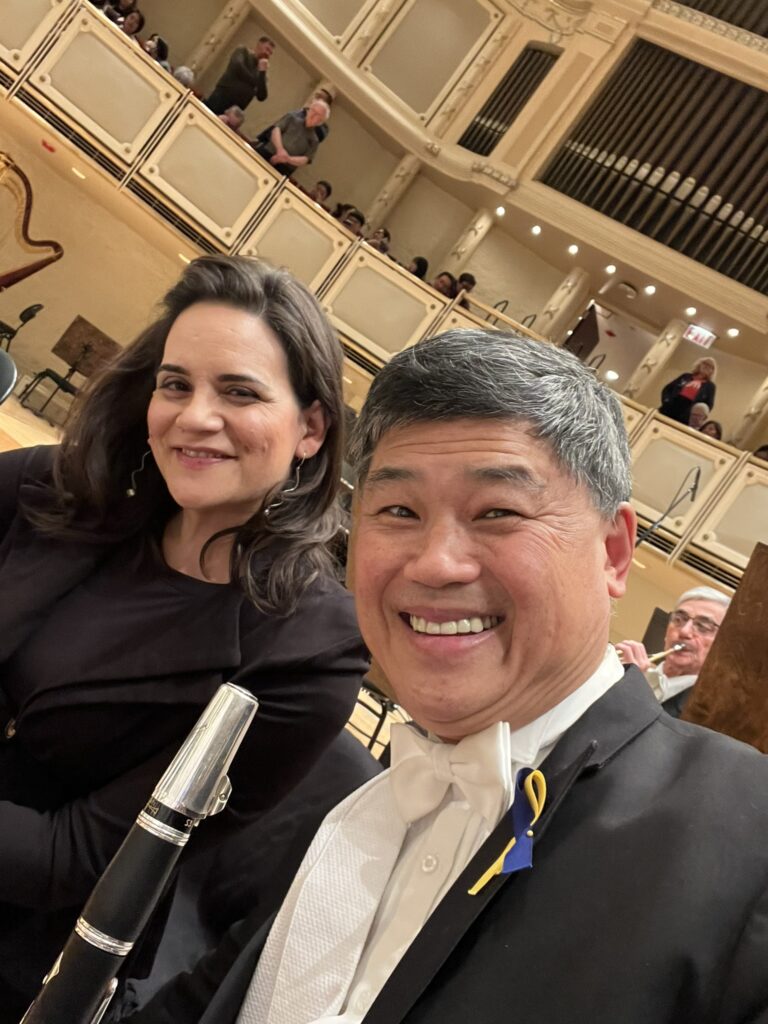
Chicago Symphony Orchestra
February 27, 2025
Chicago Symphony Orchestra Clarinetist John Bruce Yeh moved around the semicircle of music stands in a Roosevelt University art gallery Tuesday evening as he rehearsed the late French Composer Pierre Boulez’ Domaines. The audience was comprised of the students he shares with his wife, Clarinetist Teresa Reilly, and a couple invited friends, of whom I am fortunate to be one. The mix of tonal lyricism and dissonant sound was expertly conveyed by Yeh, who is performing this piece for the first time. Boulez would have loved the rumble of the passing El and the blaring car horns that punctuated this rare treat of a preview.
Yeh, the CSO’s Assistant Principal Clarinet and E-flat Clarinet, will play Domaines as part of an international celebration of the 100th birthday of Maestro Boulez on March 23rd at Orchestra Hall. He and Boulez worked together when Boulez was a regular and popular CSO conductor.
Domaines started as a clarinet solo and, over the seven years Boulez worked on it, he decided to include an ensemble of musicians whose playing is dictated by the perambulatory clarinetist. It is a piece in which the musicians make the choices of what to play, Yeh explained. However, he is performing it as a soloist at the CSO MusicNOW concert. It is one of the few Chicago performances for the Boulez Centenary, and tickets are at the reasonable MusicNOW rates, so don’t miss this chance to a see a brilliant clarinetist honor the great Boulez.
Musical Magic Preview
Pierre Boulez’s Centenary Performance by Chicago Symphony Clarinetist John Bruce Yeh on March 23rd at Orchestra Hall

“You start in darkness,” French Composer Pierre Boulez told American Composer Augusta Reed Thomas when she asked about the creative process for his work. Then, he continued, “you move into light.” When the composition is finished, he said, you return to darkness because you have many questions and more pieces to create. Boulez’s encapsulation of his creative process, for me, captures it perfectly, not only for artists but for any of us who make something. I quote him whenever possible. These two worked together when Boulez was a beloved regular conductor at the Chicago Symphony Orchestra and Thomas was its resident composer and the first director of CSO MusicNOW, its still-popular contemporary classical series. That series helped cement Chicago’s reputation as a star in contemporary classical music universe.
Boulez, a leader in the French and International classical music worlds both traditional and contemporary, lives on through his music, which is getting greater visibility internationally in this centennial year of his birth. John Bruce Yeh, the CSO’s Assistant Principal Clarinet and E-flat Clarinet, will play Boulez’s Domaines in the next MusicNOW performance. It’s a piece that started as a clarinet solo and, over the seven years Boulez worked on it, expanded to include an ensemble of musicians whose performance is dictated by the perambulatory clarinetist.
Yeh, who joined the CSO at 19, recently reminisced about his long professional collaboration with the Maestro. You can read about how his audacious request kicked that off at https://cso.org/experience/article/22271/john-bruce-yeh-remembers-pierre-boulez. You can find out more about Yeh – Full disclosure: Yeh is a close friend of many years but my regard for his musical brilliance predates our friendship, and I concur with and defer to music critics’ raves about his skills before and since our friendship – at https://cso.org/about/performers/cso-musicians/woodwinds/e-flat-clarinet/john-bruce-yeh. If you want to hear a bit of his playing and experience his teaching talents, go to Orchestral Excerpt Insights: Yeh Plays Berlioz.
Most important, make sure to hear and see John Bruce Yeh honor Pierre Boulez on March 23 at Orchestra Hall. Tickets are available at MusicNOW’s usual bargain rate. I can’t imagine a more perfect way to mark Maestro Boulez’s 100th birthday and to celebrate all that gave us.
Raves
Dummy in Diaspora

Jackalope Theatre through March 23
Highly Recommended
Much has been uttered and written about the experiences of immigrants to America and their first-generation children so it’s a pleasure to see Esho Rasho make it fresh in Dummy in Diaspora.
Not that each story of people who came to our shores isn’t unique but it seems essential to be reminded of the commonalities across centuries and cultures in these times when anti-immigrant sentiments are at a frenzied level of fear and hate.
Rasho adeptly and elegantly accomplishes that and more in his one-man show, deftly directed by Karina Patel, herself originally from London. His Essa comes of age in this semi-autobiographical piece, moving easily between stand-up comedy, familial tragedy and a search for his identity as a gay Middle Eastern man whose father is a refugee. The grace of Rasho’s physical agility matches the poignant lyrical moments he delivers with beautiful language.
“My English is so very perfect now, you wouldn’t have even guessed it was my second language,” he says, “[t]hese words and their scars in my mouth. The worst scar is losing my mother tongue.” Essa’s mother is an important presence in Dummy in Diaspora. A Chicago-based actor and writer, Rasho knows whereof he speaks. His mother is an Assyrian-Lebanese immigrant and his father is an Assyrian-Iraq refugee. Familiar with our city’s emotional and physical landscape, he builds a worthy bridge between mother and motherland, conflating his maternal attachment and his attachment to his imagined homeland as seen through his parents’ eyes. As one of the friends with me opening night put it, “He never really knew his homeland and he felt it through his mother.”
And yet there are those most American moments, played with adolescent agility and humor, as Essa comically navigates teen life in a manner that reminds us how universal the pull of friends is and what a tug-of-war it can lead to with parents. “What is so hard about your life? Please tell me,” Essa’s mother repeatedly asks him, along with other parental queries that will ring familiar to parents and guardians around the world. “This country, I don’t understand what it do to you,” she often comments in her English, about which she says, “Still it doesn’t fit in my mouth.” Such an utterance brings home the struggle to learn another language with clarity but without any preachiness.
I won’t steal all Rasho’s thunder lest it dampen a desire to see this thoughtful, funny show, but I will note that his insights and humor about nicotine addiction, ESL classes and his body – the latter perhaps part of his identifying as gay but also, no doubt, a bow to the American obsession with aging – are further evidence of how expertly Essa crosses cultural, emotional and physical borders. Dummy in Diaspora is the second one-man show I’ve seen featuring a first-generation gay man navigating multiple cultures. Like Michael Shayan’s Avaaz, this is a piece worth adding to your dramatic life.
Desirable Dance Rave
Golden Hour
Joffrey Ballet Chicago
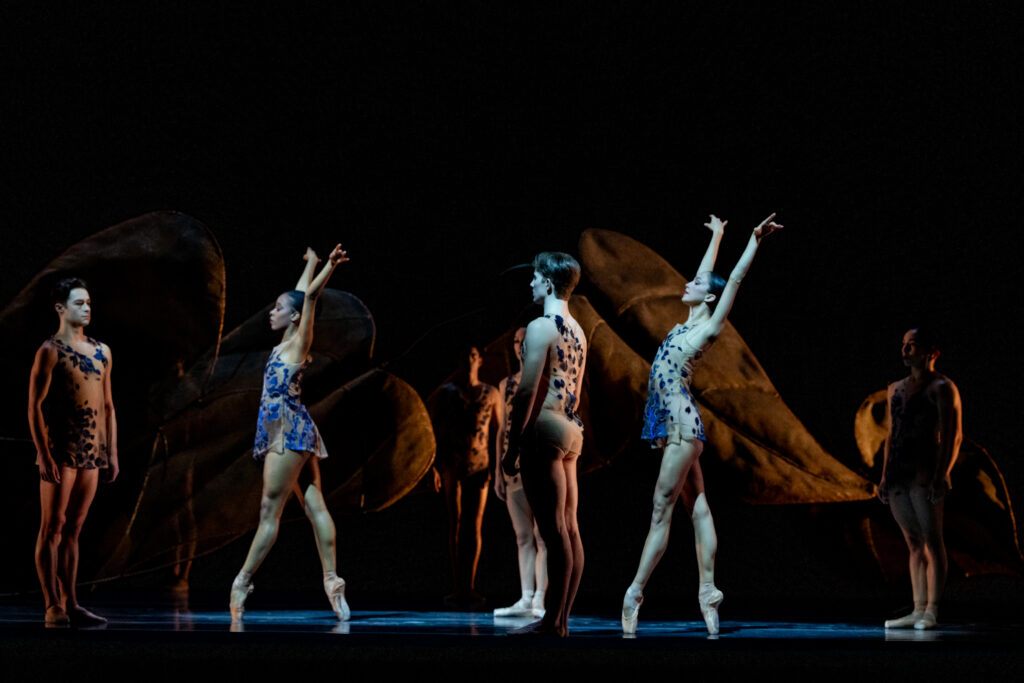
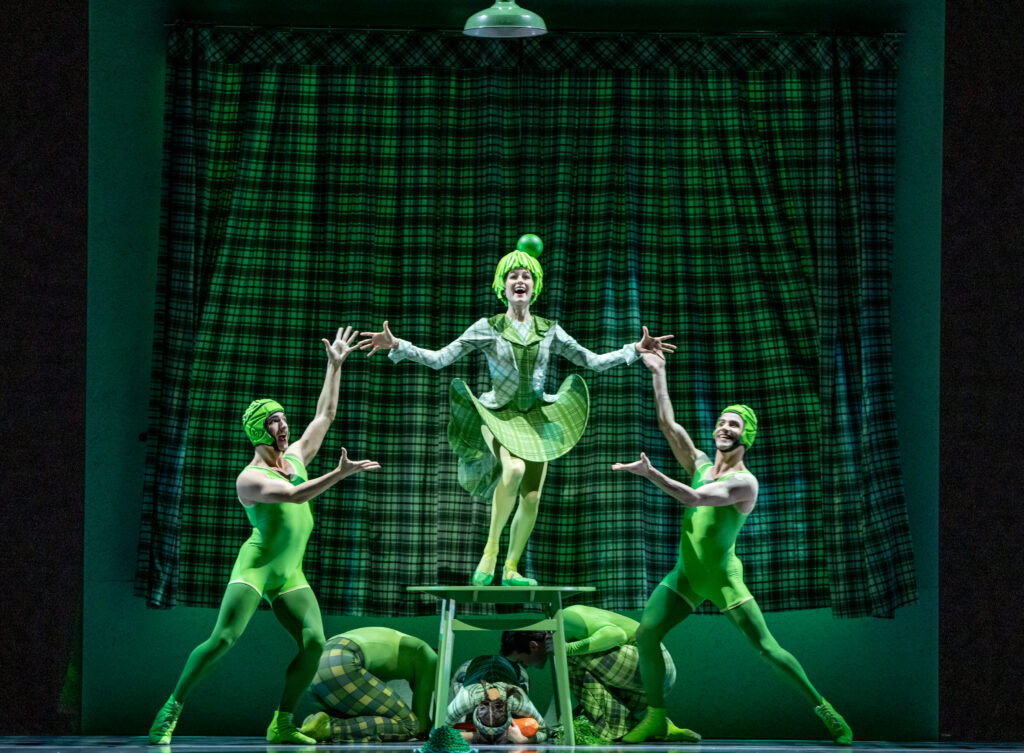
It’s about time someone decided to update Hans Christian Andersen’s The Princess and the Pea!
How fortunate I was to be able to delight in the Joffrey Ballet Chicago’s new version, a wacky morality tale for our times. I have a soft spot for art that illuminates politics, and this is a fine example of same. Mind you I don’t like the word “woke” not only because it is now at the center of an ugly political battle but because I believe we should always operate with equity for all on a truly level playing field. I’m no Pollyanna but I’ve never had any problem finding brilliant art that crosses centuries and countries, as well as race, class and generational divides. To me, it’s simply engaging and often beautiful art that touches our heads and our hearts. Problem solved.
Now back to Princess and the Pea, this new imagining that a Chicago Symphony Orchestra clarinetist friend told me I couldn’t miss. Australian choreographer Dani Rowe collaborated with American Composer Jim Stephenson to create the story of Penelopea, who lives with her two loving dads in the Pea Town. It is ruled by an evil self-appointed princess, who insists that everything be green, and maintains her power by winning a rigged annual mattress contest. In a moment of adolescent angst that turns into a revolution, Penelopea refuses to eat any more peas and her dads produce a forbidden carrot. They run into trouble with the authorities and what follows is a riotous riot of dance and music perfectly matched to this tale that features dancing cans and mattresses and a swoon-worthy carrot who helps Penelopea be brave and bring color back to Pea Town. The metaphors are deliciously obvious in this truly family friendly show with so much to say, and it’s hard to resist remembering Kermit the Frog, who showed us that “It’s Not Easy Being Green,” let along the more adult Freudian male carrot and female pea, but that’s all part of the fun. It goes without saying that every section is ideally danced because, after all, this IS the Joffrey. As I was smiling in the dark, I realized that it is the balletic version of the CSO, a corps of artists so exquisitely excellent that they always make everything as it should be and can get away with anything.
While this tragicomic offering was my favorite part of the Joffrey’s “Golden Hour” program, there were other dazzlers to behold. Under the Trees’ Voices, choreographed by Nicolas Blanc who put the stunning dancers in semi-sheer leafy costumes, with music by Ezio Bosso, is a seasonal piece of particular beauty. Jack Mehler’s ever-changing and larger-than-life leaves are the overhead canopy as the dancers’ limbs unfurl, and they move in and out of configurations and seasons. This piece took me back to a long-ago Joffrey performance to Antonio Vivaldi’s The Four Seasons, which my late husband, daughter and I adored. My husband’s favorite season was Fall, which is how Under the Trees’ Voices ends, but mine is Spring, which is where this piece begins, because it offers the opportunity for renewal and is a time when our flora and fauna start to shake off the winter chill and burst into bloom.
Heimat also offered a political message. Choreographed by Cathy Marston to the music of German favorite Richard Wagner, it presented a family that differed from what the Nazis’ or their favored composer might have prescribed. In German, “Heimat” means “home” or “homeland,” according to Wikipedia. “The word has connotations specific to German culture, German society and specifically German Romanticism, German nationalism, German statehood and regionalism so that it has no exact English equivalent.” This dance puts the stress on home and “German Romanticism” rather than nationalism, statehood and regionalism, which seems a decidedly political choice in these times. The result is a lovely lyrical ode to a more traditional hetero vision of a multiracial family and familial love, gorgeously danced by two adoring parents and their three children who move through their familial connections and stages of life. It is an ideal complement to Princess and the Pea, offering a different view of family for our diverse world.
This collection of pieces proves, once again, how lucky our city was when the Joffrey Ballet decided to make Chicago its home 30 years ago. I kept remembering a wild cab ride with its late founder Gerald Arpino and the late inimitable Culture Queen Lois Weisberg, both of whom who did so much for our culture. Their vision that embraced and honored both tradition and breaking edge art endures thanks to Joffrey Ballet Chicago.
Desirable Dance Preview
Alvin Ailey American Dance Theater, The Auditorium, March 7 through 9
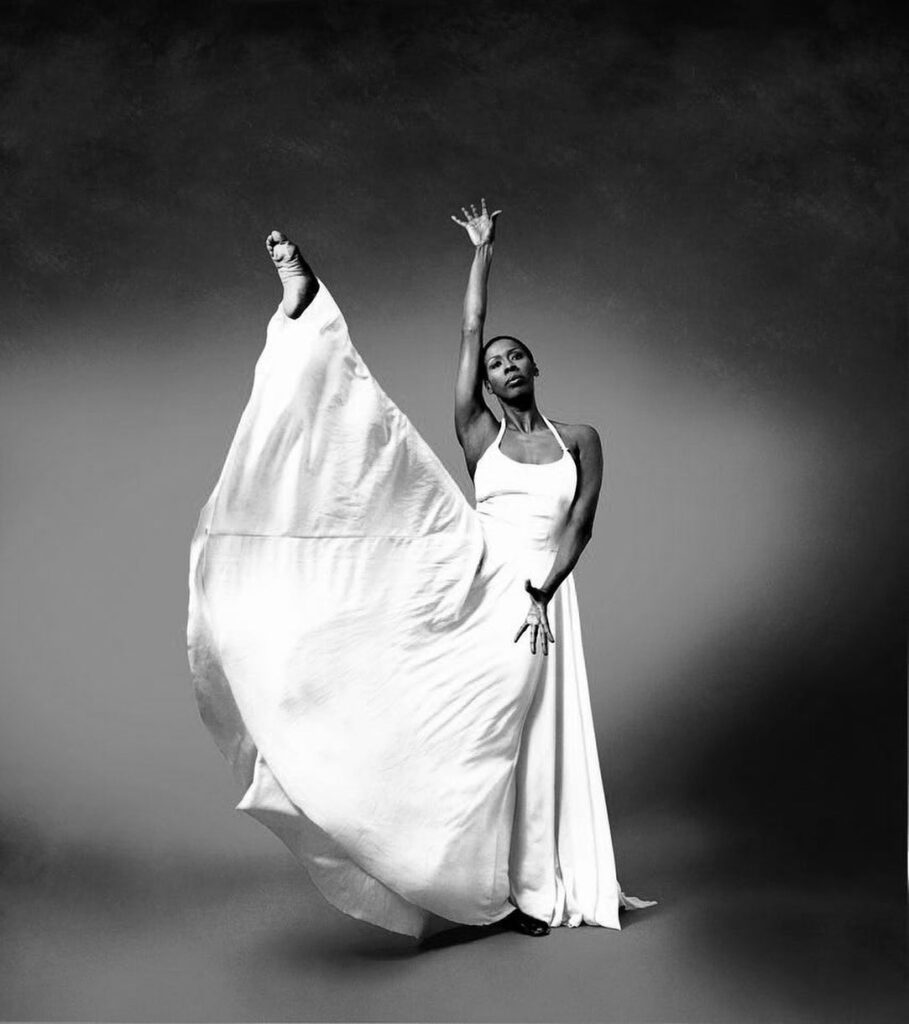
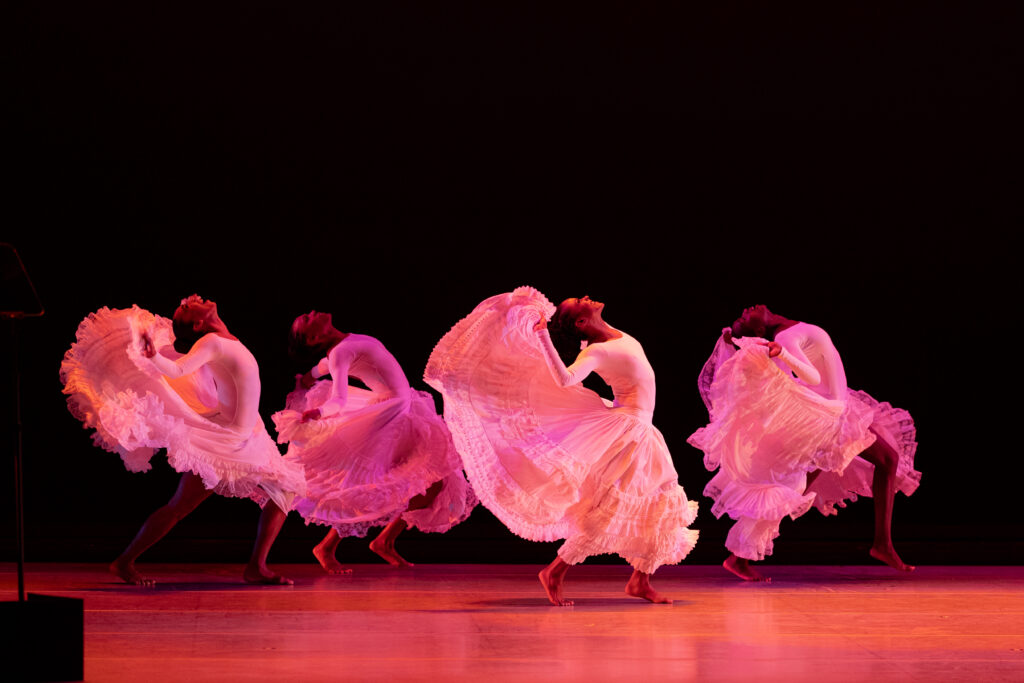
Alvin Ailey’s Cry Tribute to Judith Jamison. Photo by Danica Paulos.
The statuesque Judith Jamison, extending her expressive limbs, her face regal and held high like an Ethiopian queen, her supple body clad in white conveying pain and joy, still fills my mind and heart every time I see it. March delights me because it brings Spring, so full of new beginnings and the blooming flowers and plants that replenish us, and Spring marks the return of Alvin Ailey American Dance Theater to Chicago.
I first saw the Ailey company perform in 1969. Though I’d been dancing since 1960, and adored almost all the companies of the pioneering Chicago Spring dance series, something about Ailey’s choreography and dancers was different. Those performances hit me hard with their beauty and content.
The punch was directly to my heart when Jamison took the stage in Cry. It was Ailey’s birthday present for his mother and he dedicated it “to all Black women everywhere—especially our mothers.” Jamison, who succeeded Ailey as the company’s artistic director, originated Cry, now a classic in both the Ailey repertoire and the world of art.
“Exactly where the woman is going through the ballet’s three sections was never explained to me by Alvin,” Jamison wrote in Dancing Spirit, her autobiography. “In my interpretation, she represented those women before her who came from the hardships of slavery, through the pain of losing loved ones, through overcoming extraordinary depressions and tribulations. Coming out of a world of pain and trouble, she has found her way—and triumphed.” I was beyond fortunate to be able to interview Jamison in my public radio days about that autobiography, and hear about this piece that had touched me so deeply – and still does.
Like Ailey’s equally iconic and brilliant Revelations, I can – and have – see Cry again and again. It does not age, refreshed by new dancers, and their refusal to let the experiences expressed disappear from our artistic and human lexicon.
Alvin Ailey American Dance Theater will be in Chicago at the Auditorium Theatre, an architectural gem envisioned as a palace of the people rather than the exclusive domain of the elite, from March 7 through 9. Don’t miss the chance to see this stellar dance company and its newest iteration of Cry. It might make you cry but it might also be a revelation. Whatever you experience, I can confirm that it will be a celebration of the endurance of art.
Raves
Fool for Love
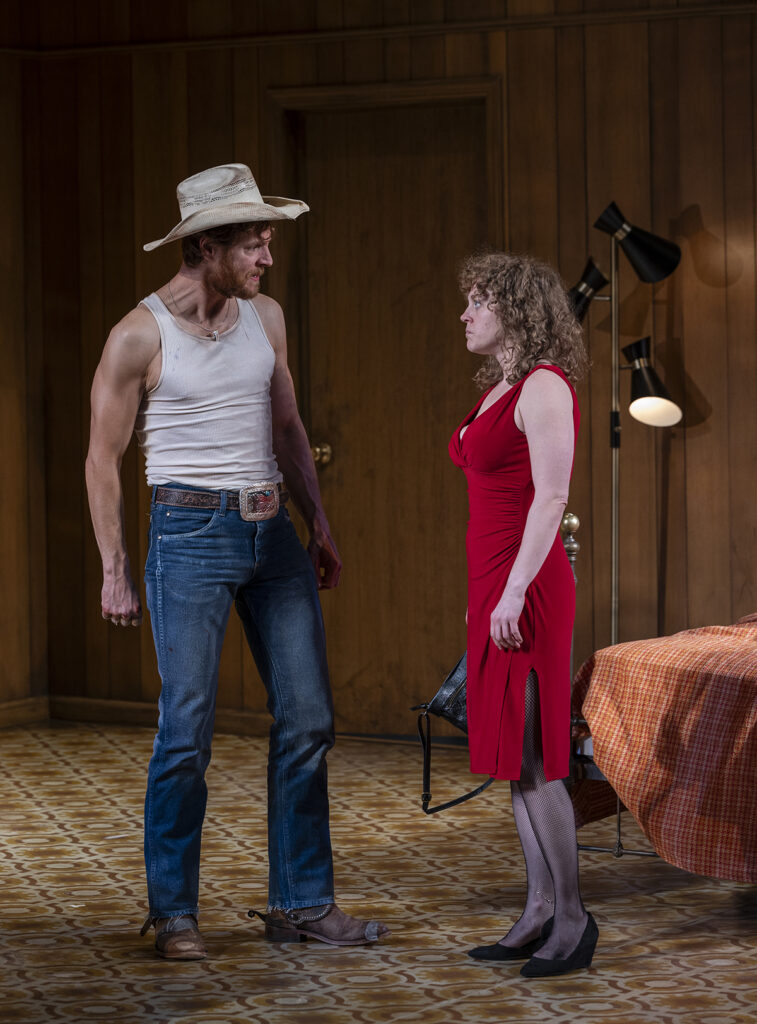
Steppenwolf Theatre through March 23
Highly Recommended
You suddenly find yourself peering into a cheap motel room in the Mojave Desert that is so palpable and real you can almost smell the leavings of those who recently departed from its tacky embrace.
You are also smack dab in the middle of a story. Perhaps it’s a love story; perhaps not. Whatever it turns out to be, Sam Shepard’s Fool for Love holds you in its clutches from its angry beginning until its heartrending end, as pinned and unable to escape as the couple at its center.
Carolyn Neff is May, the female half of that couple, and she is as exquisite as she’s ever been, which is a high standard. Neff uses body tension and rapid-fire words to express Mae’s passion and fury, whether it’s putting on a blood red dress, clinging to a leg or screaming in a face. This role fits Neff as well as that clingy red dress. Nick Gehlfuss as Eddie is definitely her match. His lanky frame never really relaxes even when he’s lying on the motel’s weary bed. He is in a tensile state all the time whether he’s taunting May, threatening her, grabbing her or expressing more tender feelings.
Sitting and watching their battle is The Old Man, whose connection is unclear until the end, and who offers periodic commentary. At first this seems an uncharacteristic role for Tim Hopper, despite his wide range at Steppenwolf, but he moves into it with the ornery grace of an old cowboy, grumbling as he pulls on his boots. The other onlooker, though by accident, is the doltish Martin, who shows up in the middle of the action not knowing what will hit him. After a dramatic entrance, Cliff Chamberlain expertly plays this loser as a man so naïve and slow that you pity rather than detest him.
Fool for Love is full of surprises I won’t reveal other than to say there is a lot of shock and sadness. Hard as it is to imagine, there are also funny moments though often the humor comes more from the snap of the characters than the situation itself. The three Steppenwolf ensemble members – Chamberlain, Hopper and Neff – are all sublime in this revival of Shepard’s play and so is Gehlfuss. Jeremy Herrin’s excellent directing keeps the passions high and the fires raging throughout the 65 minutes that his cast is onstage. Todd Rosenthal’s tacky room with the neon “Motel” sign above it and trash all about is perfect, as are Raquel Adorno’s costumes from that red dress to Martin’s necktie, the hippest thing about the man.
There’s talk about how Shepard is the ideal Steppenwolf playwright and, indeed, there is a long history of the theater doing his plays. Perhaps that’s because the intensity of effort required of actors and directors – and even the audience – in a piece like Fool for Love captures the Steppenwolf style. Perhaps it’s because this play is heartbreakingly tragic in a way that fits right into Steppenwolf’s broken-souls collection of characters even though it lacks the brutality of some others. Whatever the case, Fool for Love is electric. It offers a night at the theater that you don’t want to miss.
Fat Ham
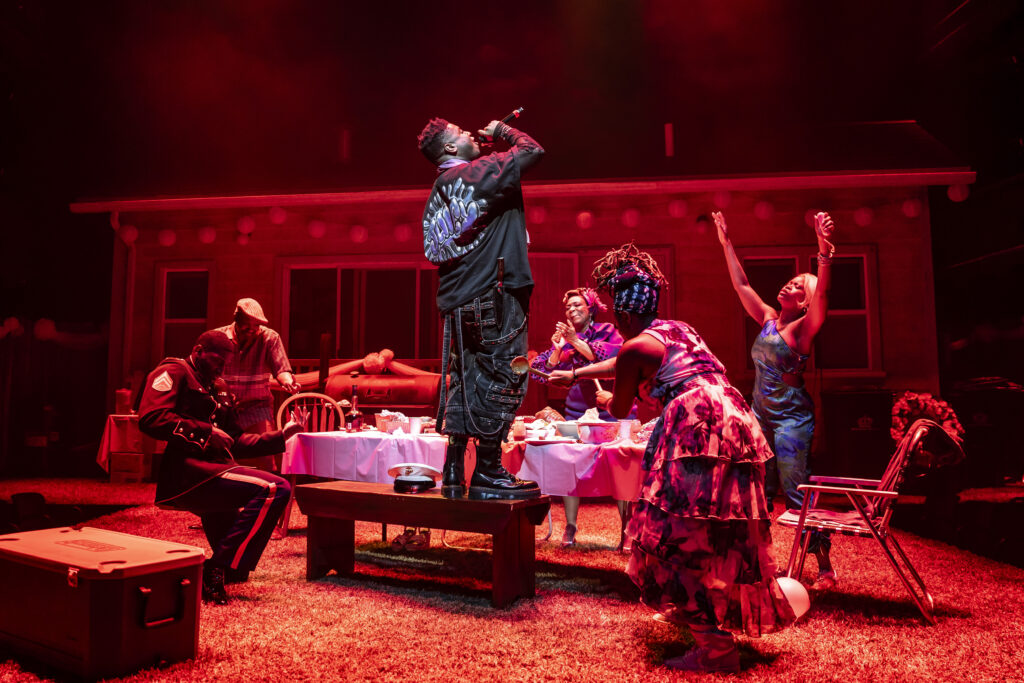
Goodman Theatre through March 9
Highly Recommended
This is not your father’s ghost’s Hamlet. Nope. And thank goodness.
For starters, it’s set in a small Southern town backyard during a post-nuptial BBQ. There are similarities to Shakespeare’s Danish play of course. The main character’s mother has just married his father’s brother though here it is a week after his father was murdered in jail. His father’s ghost keeps appearing and demanding his son avenge him. The differences might seem greater. Did I mention that this beleaguered son is a gay Black man? Not like any Hamlet you’ve ever seen?
And “there’s the rub,” the one that makes you laugh. Also ham in this adaptation pertains to the fact that this family is known for its pork butchering and, by the way, they prefer sauce to rubs. Take heed that there were purists opening night who sat stone-faced, and critics who fussed and whined later. Don’t get me wrong. I am devoted to Shakespeare – or rather to his best plays. I regularly argue that his genius is the timelessness of his work, which allows for constant reinvention and modernization. Fat Ham is nothing if not that. Younger audience members loved it, as did many middle- and late-middle aged ones, and even my mid-80s friend. I’ve seen my share of Hamlets. So has she. My least favorite was one where Hamlet ended up naked for no explicable reason. This play is deeply emotional for me because it was my beloved husband’s incorrect attribution of a line from it that made me realize his fatal brain cancer was pushing him to his end. I am confident that he, a man who studied and celebrated words, would have adored how Fat Ham embraces and plays with Shakespearian and Black English, delighting in and honoring both.
But back to Fat Ham since, after all, “The play’s the thing.” Playwright James Ijames’ reimagining of Hamlet is a delight. It reinvents this classic in unexpected creative and riotous ways, introduces different emotional realities and fills our ears with wicked jokes rather than poison. When Shakespeare’s words are quoted, they fit and are lovely to hear in this different context. Not only do Ijames and his excellent acting corps, expertly directed by Tyrone Phillips, explore the complicated emotional themes of Hamlet, they honor the bond between mothers and sons, plumb the complexities and tricky territory of homophobia in Black communities and the emasculation of Black men. The sensitivity and humor with which this is accomplished is moving.
The impressive Victor Musoni as Tio AKA Hamlet’s loyal friend Horatio is the first onstage and remains a winningly whacky philosopher with a crush on Hamlet’s mother Tedra AKA Getrude. Anji White is a wonder as this beautiful woman who adores her son and accepts his gayness, as she does her life, which has been anything but easy. She shimmers and sparkles, finding ways to eke joy out of her reality and stand by her men. Her late and current husband, both wickedly and wonderfully played by Ronald L. Connor, offers an ideal mix of lustful evil and malice that induces shivers. Trumane Alston is Juicy, her son, who would be Hamlet were this Shakespeare’s play. His is a hard role since he is depressed about his mother’s unseemly speedy marriage to an unfavorite uncle, wrestling with the death of an awful father and his own gayness because it is an issue for others. It is hard to tell if Alston’s disconnected portrayal is an effort to convey this. Sometimes he can be very moving and persuasive but other times he seems too distant. The always-excellent E. Faye Butler enters screaming with her unhappy daughter in tow. Here she is Rabby, the family friend, always in high dudgeon, holding the moral ground when not gossiping or eating everything in sight. She is a small-town Polonius, and her daughter Opal is Ophelia. Ireon Roach plays Opal with a charmingly adolescent combination of irritation at her intrusive mother and genuine sibling-like fondness for with Juicy. Then there’s her tall handsome brother, who will eventually bring down the house. Sheldon Brown’s Larry arrives in military dress with a cake in hand and exudes empathy and honor. He turns out to be full of surprises – and perhaps the kindest person in the play.
Arnel Sancianco’s set and Jos N. Banks’ costumes couldn’t be more perfect from Larry’s cake that keeps moving around to the wedding decorations to Rabby’s purple dress to Tedra’s turquoise jumpsuit. They are a feast for the eyes to complement the feast for the ears that Ijames and the Bard have given us.
Treat yourself to this dramatic gift of words and ideas, this updated Shakespeare that honors the original and does what art should by reinventing a classic and giving us much more to wrestle with and think about. Best of all, while we are thinking, it makes us laugh and we all need that.
Debate: Baldwin vs. Buckley

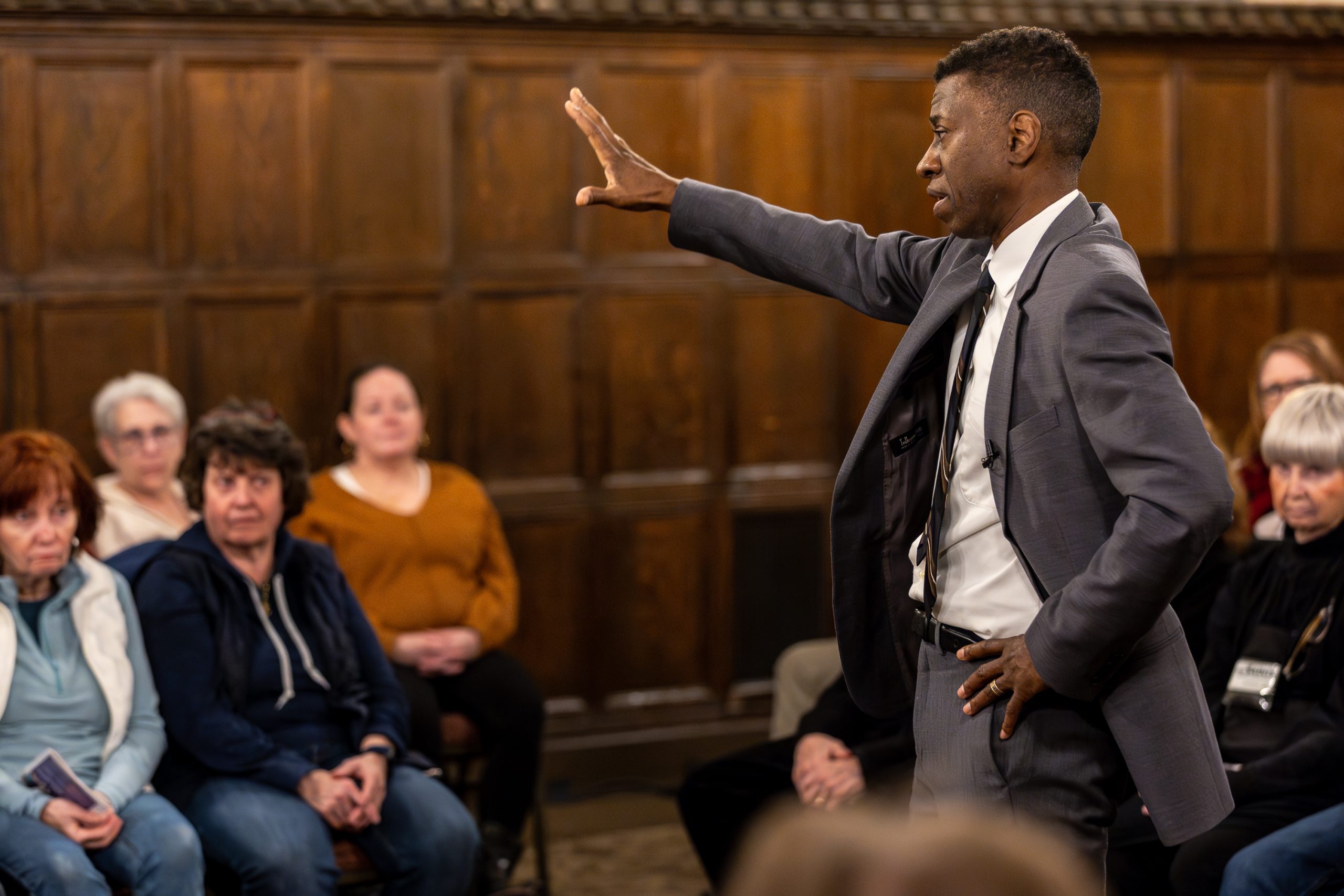
TimeLine Theatre Company in partnership with the american vicarious and DePaul University, performing at DePaul’s Cortelyou Commons through March 2
Highly Recommended
Full disclosure: James Baldwin has long been one of my heroes for his brilliance, courage and ability to express himself on the page and verbally. So it was with some trepidation that I went to a reenactment of the famous 1965 debate between Baldwin and William F. Buckley Jr., a well-known conservative author and intellectual of the time. I need not have worried.
The actors portraying these two men made the right decision to take just enough of their speech styles and mannerisms to make Baldwin and Buckley recognizable but not so much as to make them caricatures. Baldwin’s distinctive clipped speech, as if he is almost biting off his words, was unique, as was his deeply intelligent combination of profound analysis and common sense, which he conveyed with a mix of reason and controlled rage.
Teagle F. Bougere has it down pat, perfectly inhabiting the man without ever disrespecting who he was. A particularly brilliant moment comes when he stops in front of Buckley on the word “liar” in one of his brilliantly complex sentences and stares down at his opponent in a chilling moment of silent accusation before moving on. Bougere captures Baldwin’s body language as he reacts to Buckley’s comments, particularly the more offensive ones. His brow furrows. His chin lifts. He purses his lips. His hands go deeper in his pockets. But he never has to utter a word.
Instead of making Buckley a comic character, which is hard to resist given how he used to arch his back, strut in a cartoonish and pretentious way and speak down his nose, Eric T. Miller chooses to play Buckley as an ingratiating gentleman, who does his best to charm his audience – and even Baldwin, though that is more of a challenge.
Bougere and Miller as Baldwin and Buckley are the star combatants in the historic mid-1960s televised debate at Cambridge University’s Union. Convened by the Cambridge Debate Society, it followed British Parliamentary style with debaters representing the government and the opposition. The question presented to that night’s overflow crowd was: “Is the American Dream at the expense of the American Negro?”
TimeLine is recreating the feel of that debate by partnering with DePaul University and holding performances of Debate: Baldwin vs. Buckley in the school’s Cortelyou Commons, an environment much like the Cambridge Union Chamber. TimeLine also partnered with the american vicarious’ Artistic Director Christopher McElroen, who adapted and directed the Baldwin-Buckley debate to prepare for its 60th anniversary this year. McElroen’s directing is deft, and his adaptation wisely sticks with the original, restoring a critical query from the audience that is missing from the televised version.
Although Baldwin and Buckley are main event, Cambridge students played starring roles in the 1965 debate, and they do in this 60th anniversary version as well. In a lovely touch, four students from The Theatre School of DePaul University rotate in the Cambridge Club roles. In the performance I saw, Jack Baust and Alex Perez convey the nervous but intense passion of students, and match their elders with their expressive and often exasperated facial expressions as the debate moves forward.
Perhaps not surprisingly Buckley never answers the question at issue. Instead he pulls the age-old trick of making Baldwin into the exception, and tries to reframe the debate so they are equals, as if Baldwin was a white colleague, meaning either that he did not consider Baldwin an equal until now, does not consider him part of the Black community despite Baldwin’s obvious and preferred identification as such or thinks only whites rather than Blacks can have this debate but will temporary grant Baldwin race access. Any of these explanations are odious for obvious reasons.
The question in the debate is: “Is the American Dream at the expense of the American Negro?”
The question for 2025 audiences is somewhat different: Is this debate still relevant? The answer at the performance I saw was a resounding yes.
Debate: Baldwin vs. Buckley gets my vote as a must-see for 2025 – or for any year.
A Slow Air


Steep Theatre Company through March 1
Recommended
From the moment Athol starts talking in A Slow Air, you are drawn in, and realize you want to know everything about him. The same is true for Morna, the other character in this play now at Steep Theatre.
It is a credit to the actors who portray this duo, Peter Moore as Athol and Kendra Thulin as his sister Morna, both of whom so fully inhabit these siblings, that we are hooked from the start. A founding member of Steep, Moore is well known to its audiences, and almost always excels – even when the plays he is in don’t. Now middle-aged and handsomely gray, Moore’s Athol is a man who knows he’s made some mistakes. He is troubled by several events in his life, including the 14-year estrangement from his sister, and the 2007 terrorist attack on the Glasgow airport. Both of these circle him as he stands, talking about his life in and around his suburban Glasgow house, like a plane wanting to land. Thulin’s Morna is an expert portrayal of the familial outlier, who chose to go it alone, a single parent who cleans houses to support her son, with whom she has an uneasy relationship. Both actors have mastered pitch-perfect Scottish accents, which support the easy physicality they create for Athol and Morna. Each of their facial expressions and movements feel exactly right. Thulin’s face is a wonderful to watch as she moves through emotions, especially when her winsomely toothy smile illuminates it.
As the dual monologues continue, facts are revealed that give the audience a deeper understanding of this brother and sister. It’s almost as if an onion is being peeled, and the removal of each layer brings tears but there are moments of grace and love here as well. Director Robin Witt sure-handed direction strips away any unnecessary fluff so the focus is on the individuals. Sotirios Livaditis’ spare set enhances that focus.
Playwright David Harrower’s A Slow Air is not an epic play but it is an insightful portrait of the complexities of family, with a particular focus on the people who make up a family and the way they interact – or don’t. It is the sort of intense piece at which Steep succeeds. For that reason, as well as the fine acting by two of its ensemble members, A Slow Air is the ticket to a worthy evening.
Avaaz

Chicago Shakespeare Theater through February 9
Highly Recommended
As if being the son of a woman who witnessed the Iranian revolution, the Shah’s flight and Ayatollah Khomeini’s takeover isn’t enough, try being a gay Jew. Then try explaining all this to an American audience with humor, heart and enough history to keep it real.
Michael Shayan succeeds. Avaaz, his one-man show, is an homage to his mother, whose story this is. It paints a complicated picture of her life in Iran and Los Angeles or, as she and her Harvard-trained son call it, “Tehran-geles.” Shayan’s hook is Nowruz, the Persian new year, and Roya, a Jewish mother worthy of that stereotypical title, has prepared her table for the first night.
What’s striking about Shayan as a writer and performer is his versatility, which is on full display in Avaaz’ 90 minutes. He expertly morphs from standup comedian enthusiastically teaching his audience some Persian dance, then chastising them for their not quite getting it before explaining the significance every item on the Nowruz table. Every aspect has a Shayan story. He mediates the many courses on his menu using humor and wit as the seasoning. We hear about how it was to live under the Shah when one didn’t share his views, the struggles and joys of the young Roya’s early and later years in America, the complexity of her relationship with her gay son. It is all delivered with an over-the-top exuberance and panache that we come to think of as Roya, heightened by her glittery flowing kaftan, backlit by a semicircle of crystal chandeliers. One of Roya’s particularly delightful qualities is her unique yet universal fracturing of her newly adopted English. It reminded me of Leo Rosten’s The Education of Hyman Kaplan, a book worth your time for these times.
Farsi or Persian is the official and primary language of Iran. “Avaaz” means both “voice” and “song” in Farsi. It can also be used to describe Persian music. “Avaaz” means “voice” in some other Middle Eastern countries, as well as Asian and European ones. In his script, Shayan describes “avaaz” as “a Farsi word for “a song as it is being sung.” The beauty of this linguistic elasticity is that it gives voice to both Roya and her son to tell – and sing – their stories and the history of Iran.
Avaaz is in Chicago as part of a national tour and its presence at Chicago Shakespeare Theater is worth noting both because the Bard’s plays are known for their regular reinventions and because a play about West African hair braiders is playing across the hall giving us another immigrant experience.
Shayan’s skill at reinventing the melting pot comes at a time when immigrants are being demonized. It is a time when we need to hear the stories of those we have welcomed to our shores and those to whom we have been less hospitable because they all comprise these United States of ours. Perhaps they can unite us as theater so often does. Seize this opportunity to see a man of charm and talent give you a different view, one that will bring you joy and mirth even as it touches you.
Jaja’s African Hair Braiding
Chicago Shakespeare Theater through February 2
Recommended
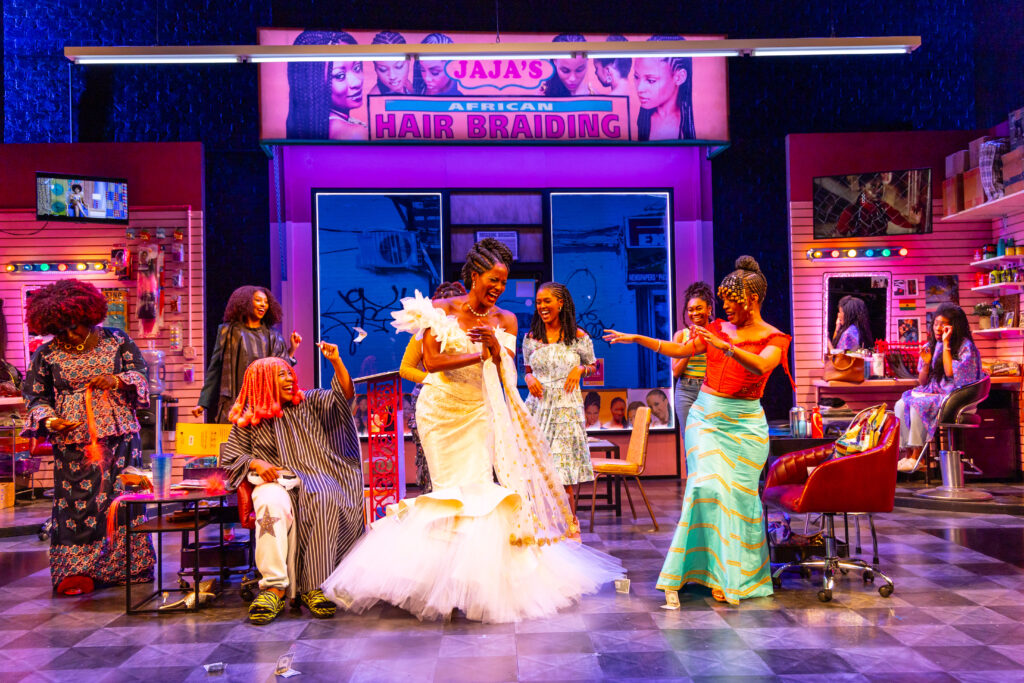
If you’re looking for an amusing evening with some Chicago theater stars, spend 90 minutes at Jaja’s African Hair Braiding salon but beware that this is a play that will make your head hurt. Despite all the laughs and funny stories, with the return of the 45th president to White House Jaja’s African Hair Braiding couldn’t be more timely.
Set in 2019, this Broadway import chronicles a sweltering summer day in a busy Harlem hair salon. Its owner and employees are West African immigrants, save Jaja’s whip-smart daughter, played with the ideal mix of respect for the ambitions and fears of her Senegalese mother and a yearning for her own first-generation American dream, which includes going to an Ivy League college. Each of the salon’s employees shares their story, which they relate with joy, wicked humor, regret and grief. Bisserat Tseggai as Miriam, a young beauty from Sierra Leone, is particularly moving, as she tells of how she defied traditional roles and found love. Awa Sal Secka brings sass and bitterness earned from experience to the matriarchal Bea, most obvious in her battles with the younger entrepreneurial Ndidi, played with tough grace by Aisha Sougou. Victoire Charles is an elegant but realistic beauty when she makes her appearance as Jaja. It’s clear why she runs this place, and also what she’s going to do to improve her life.
The Chicago crew is stellar, well directed by Whitney White, whose interest in theater started with acting classes at Chicago Shakespeare Theater. Kudos to Melanie Brezill, who has graced many of our city’s finest stages. She transforms herself from a giggly woman who wants to look like Beyonce for her birthday party to a regular patron who switches from the older braider to the hipper Ndidi. Another Chicago star, Tiffany Renee Johnson, perfectly captures Aminata, a woman full of spirit and energy who just can’t seem to dump her double-timing deadbeat husband. Yao Dogbe transforms himself in multiple roles, including that deadbeat husband, and a salesman who shows up with the best deals of many varieties, accompanied by highly entertaining narratives.
The laughs in this play by Ghanaian-American playwright Jocelyn Bioh come to an abrupt stop, which I will not spoil. To be sure, there is a is a predictability to Jaja’s African Hair Braiding but there is also warmth, a view of what West African –and, by extension other – immigrants endure, sadness, good acting and timeliness. It might be just the mix you are seeking.
2024 Raves
Leroy and Lucy

Photo by Michael Broslow.
Steppenwolf Theatre Company through December 15
Recommended
Inspired by an apocryphal story about an influential blues musician, Steppenwolf’s Leroy and Lucy is full of spirit, magic and surprises.
Playwright Ngozi Anyanwu’s reimagination of the classic tale of Faust springs from the legend that Robert Leroy Johnson, an American musician, singer and songwriter best known for his Delta Blues, made a deal with the Devil to be a great blues artist. So yes, you may see a devil, and you certainly will hear some music, but the stars of this show are the two actors who come together at a Southern rural crossroads for a battle of wits and guitars.
Jon Michael Hill continues to amaze with his versatility and charm. After his brilliant turn in Steppenwolf’s recent Purpose, he is back as Leroy, a country man with a dream. Brittany Bradford is enticing as Lucy, the beautiful woman Leroy encounters, who turns out to be his equal – perhaps superior – at verbal sparring, guitar playing and singing. The sexy chemistry and snappy exchanges between them are like two instruments in and out of harmony, a fine blues piece or captivating symphony. The way Hill and Bradford touch each other, with calm, gentle, slow, sensual hands, makes you want to jump on stage with them so you, too, can be rubbed all over. Laughter is part of this composition. Some of it naturally springs from Leroy and Lucy’s lively conversation and some from jokes about Shakespeare and the Greeks that play particularly well to a theatrical audience.
The seductive back-and-forth on the relatively bare stage is enhanced by Andrew Boyce’s atmospheric nighttime scenic design, Heather Gilbert’s romantic lighting, Jeremy Jones’ musical spot-on compositions – more would be better – and Adesola Osakalumi’s choreography. Kudos to the whole creative team.
In Director Awoye Timpo’s able hands, the surprises and shifts in Leroy and Lucy feel like part of the sensual movement of the play, surprising as they can be. If you want an evening of excellent acting and multiple legends that ends up embracing many cultures, this is your play.
Pericles

Royal Shakespeare Company at Chicago Shakespeare Theater through December 7
Recommended
William Shakespeare’s Pericles, Prince of Tyre is rarely considered one of his best plays but Royal Shakespeare Company’s production, now in Chicago, uses music, song and dance to elevate this play and bring out its magic.
There are many reasons for Pericles’ standing in Shakespeare’s oeuvre. Though it was popular in his day, from its first performance theatrical types and scholars have questioned its authorship, saying the Bard was merely a co-author. Pericles lacks the lovely language, eloquent lines and moving monologues found in Shakespeare’s best dramas. Its rush of floods, kings, princesses, villains, lovers and broken hearts is so extensive and swift that it almost seems like Shakespeare on speed. To my mind, Pericles is a mash-up of the bits and pieces of Shakespeare’s earlier plays, and a preview of what’s to come – a splash of The Tempest, a sprinkle of A Midsummer Night’s Dream and a dash of The Winter’s Tale – with Shakespeare’s hallmark mix of tragedy and humor.
Whatever one thinks of past assessments or arguments about authorship, RSC’s rescue of Pericles makes it into an engaging evening of theater in several ways. Among them is that this mad dash through adventures and relationships creates a parade of important issues including true love, personal and political loyalty, good government, deceit, betrayal, immoral and ideal parenting and class clashes.
Then there is the uniformly splendid corps of actors, many of whom play multiple roles. My companion and I were struck by the way the actors touched each other with warmth, tenderness and grace throughout Pericles, lending a sensuality to all the loving relationships. Given their individual and ensemble excellence, it’s hard to single out any one actor, but, for their ability to shift roles, two merit mention. Felix Hayes plays a slippery King Antiochus who moves from gracious to malevolent with imperious ease. Next he is a goofy, clueless fisherman who utters one of the funniest lines in the play. Then he is Pander, a brothel owner, a role in which he manages to combine the immorality of his first regal role with the humor of his fisherman. As King Simonides, the adoring but mischievous father of the woman Pericles with whom is smitten from first sight and marries, Christian Patterson exudes paternal love, warmth and a prankish sense of humor. His charming hijinks confirm the fishermen telling Pericles that Simonides is “a happy king” but they also note that his exemplary governance earns him the nickname “Good” from his subjects.
Pericles is a play that comes with music and song but the compositions in RSC’s production are lyrical and lovely, enhancing what is in the script with beauty made even more sublime by the excellent singing of the cast, accompanied by musicians whose expertise includes not overpowering the words being sung. The elegant and slow choreography perfectly matches the music while echoing the sensuality of the lovers and parents with their children. The flowing costumes keep perfect rhythm with the music, dance and sensuality by wrapping themselves around their wearers like a hug, swaying like the sea or spreading out like wings. Colors of costumes for each country help locate and keep track of the many characters and municipalities. While simple, the set includes props exactly appropriate to each location, and a series of ropes at the back of the stage that reference the many ships on the ever-present sea serve as a second small stage for pantomimes that amplify and keep the plot moving.
All these talents and elements make Chicago Shakespeare Theater’s returning the Royal Shakespeare Company to Chicago with its shimmering Pericles a welcome act. Even better, it is here at a time when many of us need a little bit of joy – and perhaps even magic.
Dear Elizabeth

Remy Bumppo Theatre Company through November 17
Highly Recommended
It’s a rare play that make us want to write letters and read poetry so the fact that Dear Elizabeth inspires both makes it a treasure in Chicago’s theatrical offerings. It left my companion, a writer herself, and me longing for a return to this epistolary art, and heading home to read poems by the poets with whom we’d just spent a couple hours.
Dear Elizabeth is an ode to friendship that chronicles the three decades American Poets Elizabeth Bishop and Robert Lowell spent writing to each other. Their meetings were infrequent but intense. Their passion for each other and their poetry was in the many letters they wrote over 30 years. There is so much in those letters, missives that cross time and geographical borders. They are a testament to a friendship that was flexible enough to encompass the potential for early love, blunt professional critiques, tragic heartbreaks and much humor. Along the way we meet a parade of literary and philosophical contemporaries and giants, some of whom Bishop and Lowell knew. One of my favorite moments is when Bishop pulls out her Kierkegaard and quotes him to support an argument. She and Lowell are honest with each other but alternate between direct assessments and the loving kindness that comes with deep caring. How many people who start with a romantic notion can rebound into such a friendship and have it last for the rest of their adult lives? It is a joy and a revelation to behold.
Leah Karpel captures Bishop’s independence, fierce passion and intelligence in a winning matter-of-fact way. As Robert Lowell, Christopher Sheard shows us the poet’s radical ups and downs, and turns him into an even match for Bishop. The two actors have a natural energy that makes their interactions like an intimate workshop for two. The set, with its desks and piles of books and evocative scenic backdrops that capture wherever these two are, enhances their performances thanks to Remy Bumppo’s collective tech talents. What could have been a very static play, given that most of it comes from letters, becomes a charged and moving conversation in the able hands of Director Christina Casano and thanks to the thoughtful and lively script from Playwright Sarah Ruhl.
Ruhl has another very different play running at Theater Wit, Shattered Globe Theatre’s Becky Nurse of Salem, about which I also raved. She is a writer of many ideas and insights – and much humor that animates them and keeps them moving.
After seeing Dear Elizabeth, it’s hard not to get wistful about the power of letters and well-crafted written words. Much as I love email, which I often treat like letter-writing, it is not the same. The lure of writing letters is partly the wait for their arrival, and partly the effort that goes into composing them. They lack the immediacy of social media, and require care and thought.
Before I met the love of my life, I relished several lengthy epistolary romances with men I never met in person, and delighted in many letters from those with whom I was in love. I adore and desperately miss the epistolary emails my late husband and I exchanged, and our children and their friends are still amused by his texts, which were usually more epistolary than not, but it is his letters I truly treasure.
Bishop’s most famous poem, “The Fish,” figures early in Dear Elizabeth. I will not spoil its role in case you’ve not read it or don’t recall it, but I will say it is about a survivor and a transporting moment when the narrator stares at a fish “until everything was rainbow, rainbow, rainbow!” Go see this play to experience emotional and intellectual rainbows, and to honor the value of letters and friendship. For me it was as magical as rereading “The Fish” decades after it first took my breath away.
By the Way, Meet Vera Stark
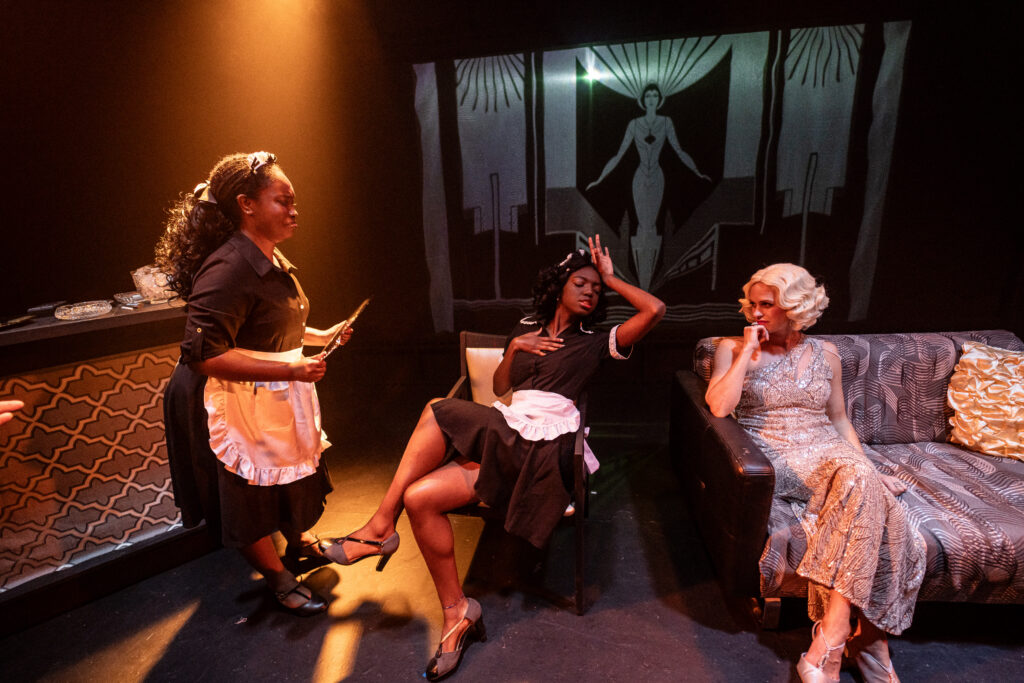
The Artistic Home through November 17
Recommended
By the Way, Meet Vera Stark is a very funny but bittersweet play – emphasis on bitter – about the lengths to which Blacks had to go in 1930s Hollywood films to keep their dignity and succeed. It’s hard to imagine much humor could be found in the continuous humiliation of having to hide your intelligence and portray a shuffling slave, “yes-ma’am” maid or deferential driver but Playwright Lynn Nottage mixes screwball comedy with searing satire and manages to make us laugh even as we witness the damage done by racism.
Her play has two parts, both uproarious. The first begins in the center of a building storm about an antebellum film that is to be made by a dreamy German director. Every starlet wants a part, including the very blonde and white Gloria Mitchell, a star known as “America’s Little Sweetie Pie” whose range veers between self-absorption and self-pity, and her Black maid, Vera Stark. Stark has the brains but Mitchell has the name and fame. Ashayla Calvin as Stark is expert at propping up her employer, covering for her in multiple ways while understanding and sometimes enjoying her superiority in every area. Calvin’s Stark is at her best when she is home trading gossip and love with her friend Lottie. Justice Ford bestows her Lottie with irresistible spirit, expertly delivering her hilariously wicked remarks while revealing her very human heart.
The third roommate, bruised but undefeated in her quest for fame and money, offers another example of how low one can go to get what they want, even when it includes passing as whatever race is required. Everyone has a secret in the first part of By the Way, Meet Vera Stark. Some are more shocking than others. Some are easy to understand and forgive. Others will remain unforgivable. Each is heartbreaking in its own way and yet the three roommates expertly and naturally use humor as a way to leaven their suffering.
The second half of By the Way, Meet Vera Stark is as biting and satirical as the first. It pits three academics against each other in a symposium about what happened to Vera Stark. Here Nottage points her satirical spear at the PC side of the Ivory Tower and skewers all who stand in her way. The seven cast members, strongly directed by Risha Tenae, show their versatility and talent as battling scholars and guests on a TV talk show. The shocker here is the reveal, for those who didn’t know, that Vera Stark was a real Hollywood star. What she accomplished and what happened to her are all part of the continuing secrets and sadness of this piece.
While By the Way, Meet Vera Stark takes on painful and unresolved issues, it shines a light on them and does so with an incisive and cutting humor, allowing us to understand and perhaps even work to correct an ugly history – or at least give credit to Vera Stark for her role in that.
Becky Nurse of Salem

Photo by Liz Lauren.
Shattered Globe Theatre through November 16
Recommended
Conjure up an intense but touching comedy about the Salem witch trials that raises difficult issues and leaves you with much to think about. That is what Sarah Ruhl offers us in Becky Nurse of Salem, now in an engaging Midwest premiere at Shattered Globe. Her 2019 play is a response to the election of Donald Trump, a challenge to Arthur Miller’s iconic The Crucible and much more. Like Ruhl’s best works, it is deliciously complicated, as is life.
Linda Reiter, a superior actor who I would see in even the worst play because of her ability to mix tragedy and humor, is the ideal lead. She plays Becky Nurse, a working-class descendant of Rebecca Nurse, one of the 19 women hanged in the Salem witch trials. Reiter conveys Becky’s challenges, chronic pain and loneliness in her usual matter-of-fact way that is so authentic it seems effortless. She also shows us Becky’s spunkier side, including her regular departures from the approved script in her tour guide job at the Salem Museum of Witchcraft.
Isabella Maria Valdés winningly plays Gail, Becky’s adolescent granddaughter, capturing the emotional pendulum of the teenage years, made harder by a plague of personal tragedies. Adam Schulmerich portrays a range of characters from jailer to judge to The Crucible’s accuser, bringing veracity, compassion and humor to all the roles but the latter. Director Polly Noonan, Ruhl’s long-time collaborator, makes sure each of the actors has the chance to tease out the many themes and stories in Becky Nurse of Salem.
And there are many because Ruhl is a playwright who has a lot of ideas running through her head and spilling into her plays. Her rage at how little has changed for women since the 1692 Salem witch trials is palpable but does not turn this play into a jeremiad. Ruhl’s ability to connect what happened then to what is happening now is uncanny. In a mere two hours, her characters enchant us with their humanity and absence of preachiness as they touch on and connect the continuing demonization of women, contemporary political fear mongering and “witch hunts,” epidemics of misused power like men ignoring the voices of women, the opioid crisis. There are lots of surprises in Becky Nurse of Salem, ones I don’t want to spoil, but know that it is a play that will engage you even as it amuses you. Best of all, it will make you think hard about the many issues we face, the ones we struggle with, and how we might find peace despite their toll on us.
Until the Flood

Photo by Basil Clunie
Fleetwood-Jourdain Theatre Company through November 10
Highly Recommended
How little has changed. Barely over a decade ago, an 18-year-old Black man was shot and killed by a white police officer in the St. Louis suburb of Ferguson. The witnesses and the cop’s accounts of what happened in the murder of Michael Brown differed radically. Peaceful protests and violent riots started in Ferguson and continued around the country as the case drew national and international attention.
Playwright, Poet and Actor Dael Orlandersmith went to Missouri a year later and talked to residents, using their thoughts to create a dramatic exploration about racism. Until the Flood, her one-woman show, has eight characters who are composites of the people she interviewed. These Black and white women and men range in age from two teenagers to a septuagenarian whose 1960s protests during her City College years in New York “set my heart on fire.”
There is fire and passion in each of Orlandersmith’s characters, and the two actors who play them ignite that with their tremendous skill and ability to portray vastly different people. First up is Jazzma Pryor as Louisa, the retired high school English teacher who’s in her early 70s. Her observations bookend the monologues. Pryor artfully conveys this African American woman’s youthful enthusiasm, her sadness, resignation and anger, and her belief that racism’s legacy is Black self-hate. Pryor fluidly morphs into a 17-year-old Black teenager who is all about flow and fluidity. Here she expertly employs Orlandersmith’s words to convey this rap-loving teen’s break from stereotypes. Pryor shines when she inhabits Reuben, a Black barber who refuses to be pegged or outclassed by two perhaps well-meaning but definitely clueless Northwestern University journalism students. She is celestial as the Universalist minister filled with joy and working for compassion.
Jasmine “Jazz” Robertson brings great talent to her challenging roles, most of which are white people, often racist. She manages to make us understand their views as much as possible, honoring Orlandersmith’s approach. Sometimes it’s not possible but Robertson’s portrayals make us want to hear even their most painful words, like those of the white cop explaining the need for gun use or the Appalachian landlord from a self-described dysfunctional family who is a lot less about fairness than he thinks. Robertson is particularly moving as the other 17-year-old Black teenager. Paul lives in the same public housing complex as “Mike-Mike” Brown, a place he describes as prison-like. All he wants to do is get out and go to Berkeley to study art history. An encounter with a white cop endangers that dream. Shocked than a Black teen would have an armload of books, the cop asks Paul if he stole them. In a risky move, Paul responds with his own question: Does this cop think he would really risk prison for a book about Leonardo da Vinci?
Fleetwood-Jourdain Theatre Company’s Artistic Director, Tim Rhoze, himself a fine actor, directs Pryor and Robertson with his usual genius, reimagining the one-woman Until the Flood with two actors and allowing each to fully inhabit their characters. Sets at Fleetwood-Jourdain are always a visual treat. This one, designed by Rhoze and Technical Director Shane Rogers, is no exception. The spontaneous shrine of flowers, photos, remembrances and stuffed animals with which we are now all too familiar, forms a hill in front of a powerful mural with black bodies and phrases from the protests.
The promise of college hangs over Until the Flood. Michael Brown was headed to college. Paul wants to make it there. Louisa talks about her transformative time there and the promise college holds for the youth in her community. It is, as we know, a dream often extinguished when Black male lives are cut short by tragedies like the murder of Michael Brown, and a list of others so long it could be a tome.
Orlandersmith’s work is in the tradition of the dramatizations of Studs Terkel’s thousands of interviews, of Anna Deavere Smith’s documentary theater, of The Laramie Project by Moisés Kaufman and the Tectonic Theater Project. All have received exemplary productions in the Chicago area, including Orlandersmith’s excellent 2018 performance of Until the Flood at the Goodman Theatre. Each continues to talk to us about seemingly intractable problems stemming from racism that we still face. The question is are we really listening? If you want to hear what remains front-page news and a tragic part of our lives, and to get a sense of how it still happens, and how we might fix it, this complex, compelling show is your ticket to understanding – and perhaps fixing the problems.
Primary Trust

Goodman Theatre through 11-3
Highly Recommended
The remarkably intimate yet hugely moving play now on stage at Goodman shines from the moment its main character starts talking. That’s because it’s impossible not to fall in love with this man.
From the parade of the hard, sad facts of his early life, Kenneth could easily be dysfunctional and depressed yet Playwright Eboni Booth creates a man radiating a calm and intoxicating joy, and Namir Smallwood so perfectly embodies this man that you are on his side from the start. Smallwood’s skill comes out both in how he gives voice to Booth’s lovely lines – allowing us to even forgive a few stumbles – and in the way his expressive face and body capture the range of Kenneth’s emotions and experiences. This is a talky play but there doesn’t seem to be a lost syllable in what Kenneth says.
That goes for the other roles as well. Director Malkia Stampley makes sure each member of this stellar cast glows. Everyone needs a best friend like Bert. Charles Andrew Gardner matches Kenneth’s joy with an easy calm that includes being his biggest fan, as well as a gentle but effective critic. There is a natural connection between the two, made poignant by the fact that Gardner’s charming and supportive Bert is imaginary yet larger than life – and almost bigger than Kenneth’s imagination. Christiana Clark has too many roles to remember but excels in each from the seemingly unending succession of servers at Kenneth and Bert’s beloved tiki bar where they overindulge in Mai Tais on a nightly basis to a series of bank customers to a surprising player in Kenneth’s life. Equally excellent in multiple roles is Fred Zimmerman, who starts as Ken’s kind-hearted but irascible boss in an old-fashioned bookstore and, with a brief hilarious stop in a fancy French restaurant, becomes another truly compassionate boss.
Intoxication is an essential ingredient of Primary Trust, which has some of the best lines about libations and drinking I have ever heard, not to mention that excellent outdated tiki bar. The kindness that permeates this play is intoxicating, as is the ode it offers to friendship, and to small towns, to what they were and still have before capitalism and the commercial chains strip them of their character with endless malls and cookie-cutter commerce.
Even Lex Liang’s set is intoxicating. An architectural, cartographic wonder, Liang fills the stage with white buildings of various heights that often are lit, and can easily morph into desks, tiki tables, bank teller windows and more. They glow against a backdrop that is an aerial map of Kenneth’s hometown of Cranberry, NY, complete with streets, houses and trees. Just as you are feeling moved by Liang’s vision, you realize that this map is also a woman’s face, full of beauty and warmth, completing the connection to human life in this intoxicating tale.
Primary Trust is one of several plays now on Chicago stages that offer us evidence of the inestimable value of that human connection, of friendship, of kindnesses, both small and large. This play challenges and engages its audience while offering comfort and encouragement to emerge from our isolated, unhappy times and selves. It’s evident why Primary Trust won this year’s Pulitzer Prize for Drama. Don’t miss the chance to see for yourself and drink from its refreshing cup.
The Last Wide Open
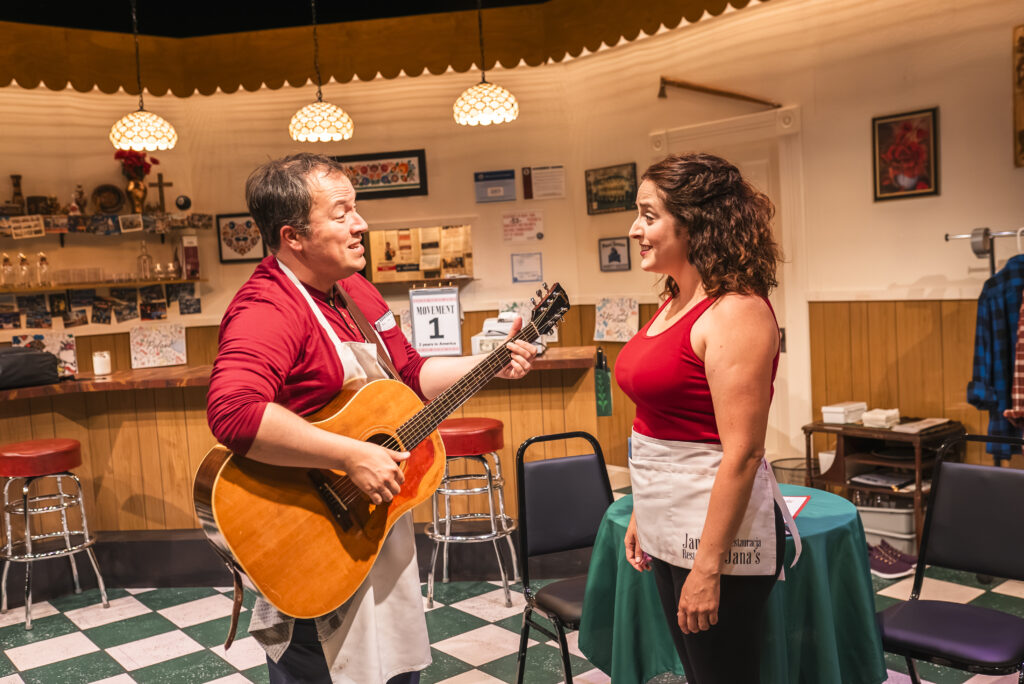
Photo by Jenn Udoni.
American Blues Theater through October 26
Highly Recommended
From the moment he turns away from the piano and beams out at you, Mikolaj, a recent Polish immigrant to Chicago, grabs your heart. Winningly played by Michael Mahler as a man with guileless charm, Mikolaj has the enthusiasm of a new immigrant. He posseses an irrepressible cheery optimism that could easily be annoying on almost anyone else, and a warmth that glows as if it is centered in his core and leaking out through his skin.
It is 10 PM and this dishwasher is soon joined by Lina, a waitress in this Polish diner, and an American with a decidedly less delighted perspective on life. Played with impatience and engaging candor by Dana Cameron, Lina is the plainspoken pragmatist who worries way too much. Mikolaj is the starry-eyed romantic who can’t take his eyes off her even if she doesn’t notice his palpable love that the rest of us can’t miss. Their interactions could so easily veer into an unbearable love story that would make you choke on its excessive sugar but this couple always corrects the recipe by leavening it with humor. And that humor often transmogrifies right back into sentiment and thought. The gum under the counter is a perfect example, a silly but irresistible scene in which Mikolaj finds Lina depressed on the floor, and they end up having an existential moment about previously chewed gum stuck to the bottom of the counter, a moment that is reprised in true musical fashion.
What lifts this play from the genres that could trap it is its structure. It is called “a love song in three movements.” Matthew M. Neilson’s eclectic music is an essential part of this show. Rather than take the form of a classical composition, The Last Wide Open liberates its audience to decide what should happen. I’ll not give away more except to note that Mikolaj breaks the fourth wall with a persuasive argument that masquerades as a love song AKA a plea to heed passion. AKA has an important supporting role in this show, one that will tickle you, as it often does the ivories.
The Last Wide Open’s history is unusual and custom-made for Chicago, which has the second largest Polish population outside Warsaw. It started in Cincinnati as play about an Italian immigrant. American Blues Theater got permission from the playwright to adapt it to reflect Chicago’s robust and longtime Polish population. The result was a collaboration between Audrey Cefaly, who did the book and lyrics, and two first-generation members of the Polish diaspora, sisters who grew up in Marquette Park – ABT’s Katarzyna Muller, who adapted the play, and Matilda Szydagis, the dialect coach.
As soon as I saw the set, which puts patrons into a Polish diner, I thought of Podhalanka, a favorite Polish restaurant of mine that recently closed despite decades of surviving the gentrification of Division Street. As it turns out, that very spot was part of the inspiration for Director Gwendolyn Whiteside and her crew’s immersive set design. Although this set lacks Podhalanka’s plastic-over-everything décor or its card carousel filled with Catholic greetings for all occasions, it has many of the other touches, making it the perfect Polish diner preserved in a 1950s time capsule.
Mahler and Cameron are a real-life couple, which did not surprise me but did make me happy. I was so persuaded by their chemistry that I was going to suggest they take this beyond a stage kiss and get married. Whatever their secret is, it is pure pleasure to watch them together.
There is so much heart in The Last Wide Open that I was elated by its Fall encore after a successful summer run because now I can rave about it. Make sure you get tickets to this show, which transcends typecasting offering instead a love story with a heart and a brain, allowing us many moments “of joy, of transcendent joy.”
Inherit the Wind

Goodman Theatre through October 20
Highly Recommended
The timeliness and relevance of Inherit the Wind, the 1955 play about the infamous “Scopes Monkey Trial” that pitted the Bible against Darwin’s Theory of Evolution and good old American Free Speech, couldn’t be more obvious in Goodman Theatre’s excellent remount. The decision to make this Broadway hit the 2024-25 season opener pays homage to our continuing battle between religion and science, belief and fact. It also bears noting that this play serves as both a reminder of the small-town trial that grabbed our nation’s attention and a history lesson about an important milestone nearly 100 years ago.
That was when a football coach agreed to serve as a defendant when the American Civil Liberties Union challenged Tennessee’s recently enacted Butler Act, which prohibited teaching evolution in its state’s schools. It is an intriguing irony that the notion of Separation of Church and State was already well known in this country and practiced for several centuries. The trial pitted William Jennings Bryan, an orator, lawyer and politician who failed to win the presidency three times, against Clarence Darrow, a hero in progressive circles for his labor cases but best known for his Leopold and Loeb murder defense.
Aside from the political reasons to revive this show, there are its fine Chicago roots. Darrow was living here by the time of this trial. Director Henry Godinez’ casting and directing choices make Inherit the Wind soar while creating a dramatic storm. His Darrow is a Black man and his acerbic newspaper critic an Asian woman, ingenious choices that modernize this play. The fact that that Black man is Harry Lennix, a beloved stage and TV actor who always brings presence, power and elegance to his roles, makes it even better, and gives disturbing depth to the lines about darkness and the devil that are uttered by the Tennessee townsfolk. Lennix is matched by Alexander Gemignani, a Broadway and TV actor who has graced Chicago stages. Other Chicago acting veterans of great talent and experience abound – Kevin Gudahl, Lawrence Grimm, William Dick, Meighan Gerachis, Eric Slater, Charin Álvarez, John Lister. There isn’t a weak person in this corps. Even the actors who portray the children who open the play, Thomas Murphy Molony and Presley Rose Jones, are exceptional as they draw the battle lines and set the tone for the evening.
Inherit the Wind is clearly weighted toward those who embrace Darwin’s Theory of Evolution. I say that as an unabashed believer in that theory, reared by a father who lived and breathed it. For about 80 of his 97 years, he took every opportunity to teach it to me, and to his students as a professor of religious studies, and fight its opponents. Inherit the Wind is also an educators’ dream with its emphasis on ideas, inquisitiveness and science. The imbalance comes because the anti-Evolution characters often feel more one-sided than Lennix or Christopher Llewyn Ramirez, who brings an honesty and surprised dignity to the teacher at the center of this trial, and Tyler Meredith, his beloved who bears the cross of being the stern minister’s daughter. The playwrights give these characters more opportunities for nuanced interpretations and humble humanity.
As always, Goodman’s set is a star in its own right. Collette Pollard’s circular ceiling ringed with buildings that could be any town or city captures the spirit of a church dome and a village. In this celestial universe, buildings light up appropriately to match the action below, conveying the reality that the whole world is watching, and the intimacy that everyone in this community is looking down on what they perceive to be a serious challenge to their beloved Bible.
The Bible-versus-Evolution, religious-dogma-versus-science-and-freedom-of-thought battle is far from over but even those, like my companion, a believer whose religious beliefs mean that she does not believe in the Big Bang Theory or Evolution, will find merit in this production. So seize the opportunity to learn or relearn some important history with the help of a fine cast expertly directed in Goodman’s Inherit the Wind.
Noises Off
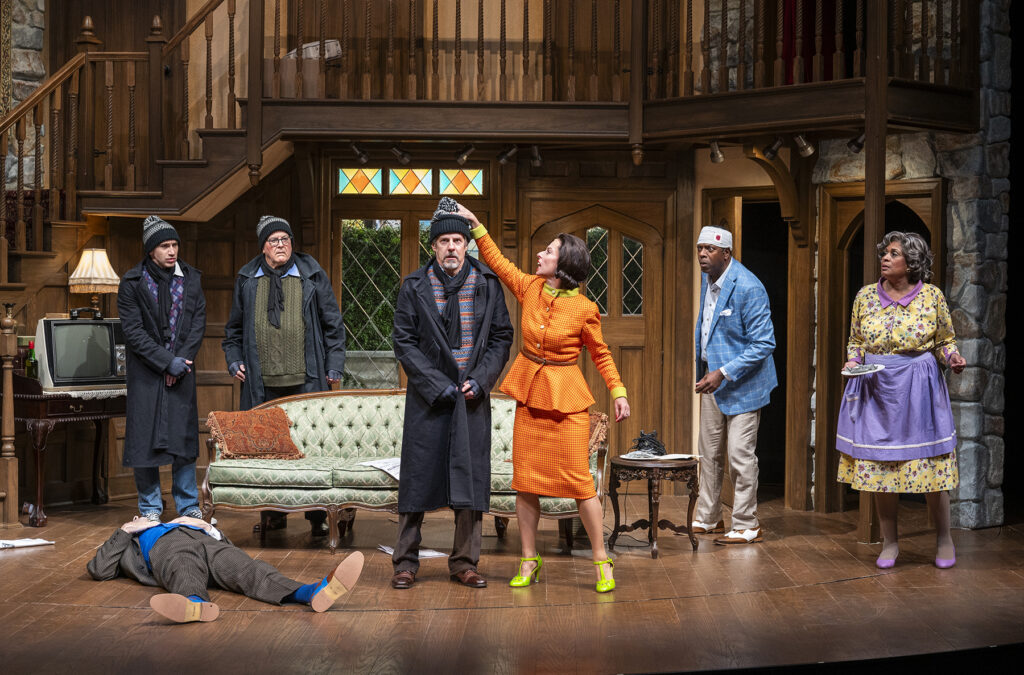
Steppenwolf Theatre Company through November 3
Recommended
Who doesn’t need a good laugh? Steppenwolf’s latest somewhat atypical offering of the British farce Noises Off comes as a welcome tonic in these tense times.
At first glance it seems an odd pick – something acknowledged in the artistic co-directors’ welcome note – but it actually fits snugly into the Steppenwolf oeuvre though my arguments for why differ somewhat from the theater’s leadership’s. After all, for 49 years Steppenwolf has been known for its visceral plays about dysfunction and this is indeed a play about dysfunction – this time with a comic twist.
And yet there is depth in this laugh fest. My always analytic theater companion offered her usual astute explanation noting that the main topics of Noises Off are strife between coworkers, the stress of putting together something at the last minute and sex on the job. These are indeed timeless and universal topics. She went on to observe that that the workplace has long been a staple of American TV sitcoms and comedies like the amusingly accurate Abbott Elementary, a behind-the-scenes look at a Philadelphia public school. Others might pick Tina Fey’s 30 Rock. For my generation of Feminists it was The Mary Tyler Moore Show.
I’d argue that English Playwright and Author Michael Frayn, an incredibly versatile artist who also gave us the award-winning plays Copenhagen and Democracy, here offers us a gem from the genre of British Bedroom farce. Think multiple doors and Sir Alan Ayckbourn, among others. Of course, British bedroom farces aren’t for everyone. My late husband and I lost a longtime family friend over a slightly bawdy one but that’s a story for another time. But Noises Off showcases Frayn’s exemplary and delightful use of “the play within the play” trick – a technique expertly applied by William Shakespeare, and we know how well that turned out whether in his tragedies or comedies. Still “the play’s the thing,” as the Bard’s Danish Prince put it so well in Hamlet so back to Noises Off.
It is the story of a group of actors and their director doing their best to mount a play about class and sex with too little rehearsal while their off-stage lives and own affairs mirror the comic chaos onstage. Lest I give too much away, know that each of the three acts offer a different and equally hilarious perspective on the play and the offstage drama.
From the moment the always sublime Ora Jones walks into an elegant sitting with an ideal English pastoral view and answers a ringing phone while balancing a plate of sardines, we know this will be a hilarious evening. Jones plays the housekeeper to this country home onstage. Offstage she is the elegant doyenne of the TV world who doesn’t quite recall every line but retains her allure. In short order we meet the rest of the corps, starting with Andrew Leeds, who excels as a spacey actor offstage. Onstage he is trying to rent the house though trying harder to have it off with a comely employee of the British tax service. Amanda Fink’s portrayal captures both this lusty lady and her offstage self, a clueless young actor more focused on her disappearing contact lenses than the artistic endeavor. Next up are the owners of the house, who are evading tax collectors but have escaped self-imposed exile for an anniversary weekend in their beloved home. This amusing couple is portrayed by two topnotch Steppenwolf Ensemble members. James Vincent Meredith captures all the pomp and anxiety of the onstage homeowner and offstage he is the kind but equally anxious actor. As his onstage wife, Audrey Francis is her usual snappy self as an elegant, controlling mistress of the manse. Offstage Francis, who is one of Steppenwolf’s artistic directors, is just as efficient and controlling, as well as being the most professional actor in the corps. Francis Guinan, long a Steppenwolf favorite for good reason, plays a burglar onstage and offstage he is a formerly great actor from whom all liquor must be hidden.
The offstage technical crew is made up of the handsome director of this play within the play, Rick Holmes whose long-suffering director strikes the perfect balance of confidence in his abilities and expertise at coddling his needy and insecure actors. Always ready to serve in any way possible is his assistant stage manager, a bag of nerves and raw emotions deliciously captured by Vaneh Assadourian. Her stage manager boss is deliciously incompetent, as aptly played by Max Stewart.
For a couple hours these actors’ antics, both onstage and off, amuse us. The ensemble work is excellent, both in timing and elegant physicality. The play, and the play within the play, ideally directed by Anna Shapiro, offer audiences an unusually intimate insider view, in essence revealing the acting process, which is most fitting for a piece that involves so many actors taking off their clothes in the best British bedroom farce tradition. My friend and I didn’t go on opening night so our audience was not overwhelmingly theater people but its members enjoyed Noises Off, relished every laugh and left the theater chuckling and smiling.
Steppenwolf’s artistic co-directors noted that one of the reasons this season starter is appropriate for their audiences is our collective need to laugh together. While my taste often is for more serious fare, I have to agree that sometimes we do need some cheering up. As my insightful theater companion put it, “We’ve been to a lot of plays and, after the successful tragedies, we’ve left feeling exactly as we should, but we’ve also left some plays that missed the mark feeling both depressed and unimpressed. At this point, I think I’d rather have the Noises Off experience and simply leave a play feeling amused.”
So if you need some cheering up, an evening of amusement courtesy of excellent actors or just a night full of laughs, make sure to spend a couple hours at Steppenwolf enjoying Noises Off.
Little Bear Ridge Road

Steppenwolf Theatre Company through August 4
Highly Recommended
How can one not fall for a woman who uses home appliances as weapons and to enforce barriers? Laurie Metcalf is the tough damaged nurse who manages a for-all-appearances impressive balance of burying her sadness so she can care for her patients. As Little Bear Ridge Road starts, she is confronted with the return of her nephew, the son of her late meth-addicted brother.
In my many decades of observing Metcalf onstage, I’ve never seen her make an inauthentic move, even in an atrocious play and, once again, she excels as Sarah Fernsby. This character could easily become the stereotypical rural hard-ass spinster found in small towns across this country but not in Metcalf’s more-than-capable artistic grip.
One of the aspects of Steppenwolf that fascinates me is the way it has aged with its audience. Occasionally it’s lost its footing but if you consider its early days of intense, raw, angry, deeply psychological plays often about dysfunctional families – Metcalf joined the ensemble two years after its 1974 start – they reflected and challenged Steppenwolf audiences at that time. I would argue that as its ensemble and audiences grew, the theater continued to reflect and challenge its patrons. Steppenwolf plays are still intense, raw, angry, deeply psychological and often about dysfunctional families but now they also deal with aging and death. Sometimes they seem to be a slap in the face, a mocking shock or a tonic for patrons. Coping with family trauma is often at the center of Steppenwolf plays. Don’t most of us have that? OK well maybe not a drug addict dad but…
That is certainly the case in Little Bear Ridge Road. Set in rural Idaho, it revolves around the two remaining and estranged members of the Fernsby family, Sarah and Ethan, her gay nephew, who has returned to settle his father’s estate. Micah Stock captures the melancholic lack of ambition of this thirtysomething unsuccessful writer well enough, and his occasional outbursts of emotion are believable and welcome. Aunt and nephew connect over and are knit together by their critiques of bad reality TV on a couch with many secrets that sits at the center of Scott Pask’s appropriately bleak set. Eventually they are joined by graduate student James, played with warmth and compassionate charm by John Drea, who takes a chance on love with Ethan. This twosome offers a calming counterpoint to the aunt-nephew struggle to overcome their family history.
The presence of meth in Moscow, Idaho – the hometown of Playwright Samuel D. Hunter – hovers over Little Bear Ridge Road. Joe Mantello’s clear-eyed directing brings out the profound pain and sharp humor in Hunter’s fine play, as well as the strength of each actor.
If you’re thinking that you just can’t handle another play about another dysfunctional family, summon up the first line of Leo Tolstoy’s classic Anna Karenina, rightfully ranked one of the most famous openings in literature: “All happy families are alike; each dysfunctional family is dysfunctional in its own way.” Little Bear Ridge Road may not be a Russian classic but it’s most definitely worth your time – both to see Laurie Metcalf, and to consider the questions of human connections and how to make them in the face of overwhelming dysfunction and loneliness.
1619: The Journey of a People
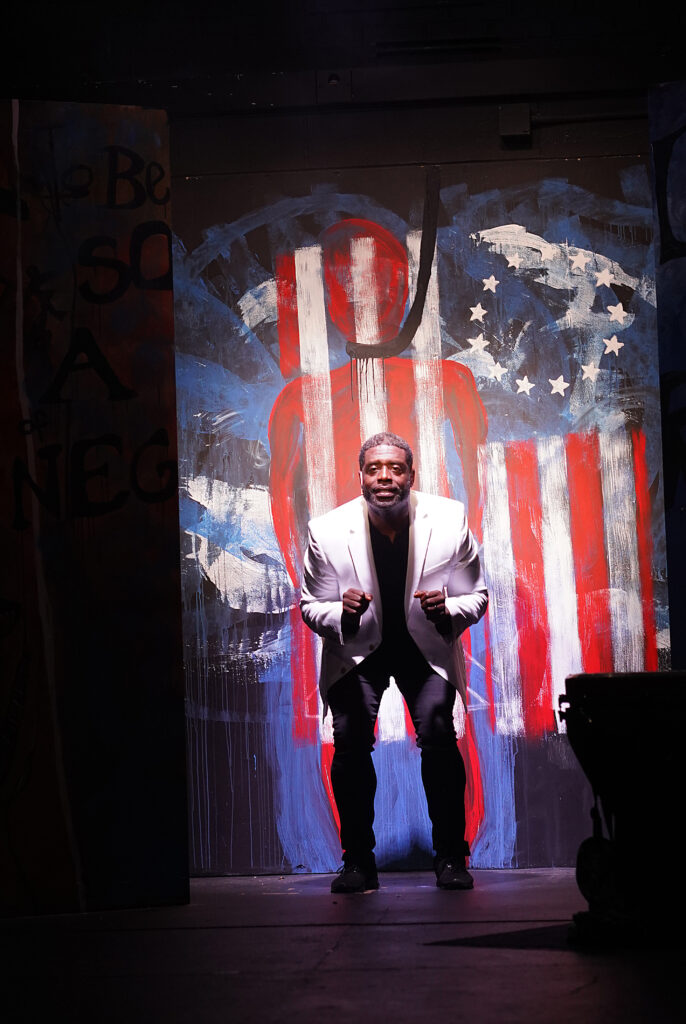
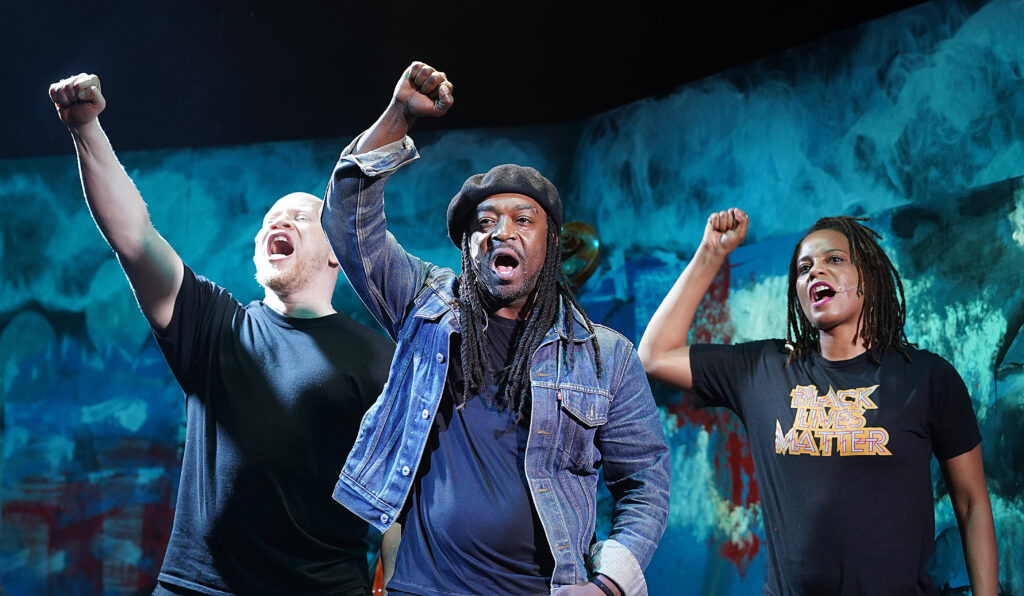
Fleetwood Jourdain Theatre through June 30
Highly Recommended
Any play with this many raised Black fists warms my revolutionary heart. Any performance that offers a mix of history, candor, intellect, politics and beauty sufficient to transform one seems to me the ideal artwork. 1619: The Journey of a People does all of that. Creator Ted Williams III, who also stars in the show, calls it a musical but it goes beyond the stereotypes or confines of that genre. This piece has many scenes. Some are short; some long. Some are spoken; some silent. Some are sung; some danced. Some are funny; some break your heart.
Williams and Fleetwood-Jourdain’s Artistic Director Tim Rhoze expertly co-direct a talented ensemble, accompanied by an equally accomplished three-man band that is onstage with them, underscoring the integral role of music in Black life. Musicians sometimes join the actors/dancers/singers, which highlights the spot-on choreography of performer Marchello Lee. This stellar corps takes us on a trip that starts with a dance and their chant, “We came on a journey. We move like the wind. We fly like an eagle. We will survive until the end.” And then the horrors begin with the arrival of the first slave ship. Some of the searing scenes that follow are silent, and Williams knows how to use silence effectively. He also knows how to use humor.
There is the sassy son who quotes Adam Smith’s Capitalist theories to get money from his father but ends up with a far more valuable lesson. Two South-side schoolmates encounter each other on the El as adults and, having taken very different paths, quickly get into a debate. The “Booker T. or W.E.B.” rap performed with zest by Williams and Lee illuminates the infamous debate between these two Black Leaders, W. E. B. Du Bois and Booker T. Washington, that divided and shaped African Americans and politics for years to come.
In a mere 80 minutes, Williams, Rhoze and their ensemble guide us through the 405 years since Black Africans were brought as slaves to these shores. By definition this must include unimaginable sorrow, pain, courage, bravery and optimism. There is the Great Migration. There are scenes with historic roots and modern branches like the moving song about Black women or Shannon Stiles’ more upbeat number with two backup singers, reminiscent of a Motown girl group except that it mixes gossip with history, upsetting a perfect balance of girl talk that could be heard on any corner today by layering it with injustice. Many of these moments have Chicago roots. We meet a Pullman Porter, and later hear about Dr. Martin Luther King Jr.’s efforts to end Chicago’s segregation and racism. Almost all of what happens in 1619: The Journey of a People reminds us of how little has changed, and how much work remains to achieve true equality and freedom thanks to the insightful juxtapositions of history from centuries ago, from more recent times and from our present.
The genius of Williams is his ability to convey so much with an image, a phrase or the briefest of scenes – and his talent at combining important historical moments. Even though he did not intend this, when Simbryt Whittington Dortch sings the national anthem, I was transported back to Marian Anderson’s brave performance of “America” on Easter 1939 at the Lincoln Memorial before 75,000 people. As Dortch sings, three men take the knee honoring Colin Kaepernick’s courageous protest, and then raise their fists in the Black Power salute of my childhood. The conflation of these essential historic moments was so powerful that it moved me to tears.
All this talent is enhanced by Sholo Beverly’s murals, which surround the performers. Her red, white, blue and black panels feature a slave ship and elegant Black faces flanking a vertical thirteen-colony flag with superimposed images that include a lynched man. Front pages from newspapers with historic headlines ring the top of the set but few tell good news. Instead, they convey horrors in Black life – the murders of Emmet Till, Malcolm X and Dr. King, the jailing of Rosa Parks. The only positive headline is Barack Obama’s first presidential victory.
Should you be worried that the historic truths, despair and rage in this play will overwhelm you, fear not. There are moments of unbearable pain. How could there not be in any art about slavery, our great moral stain, and the racism that persists, another great moral stain? But take heart because this is a piece that is both hopeful and inclusive, a work of art that offers us a chance to join together to heal. There are many battles ahead and perhaps 1619: The Journey of a People is too optimistic. Then again, maybe it is just the tonic we need right now.
Stokely: The Unfinished Revolution
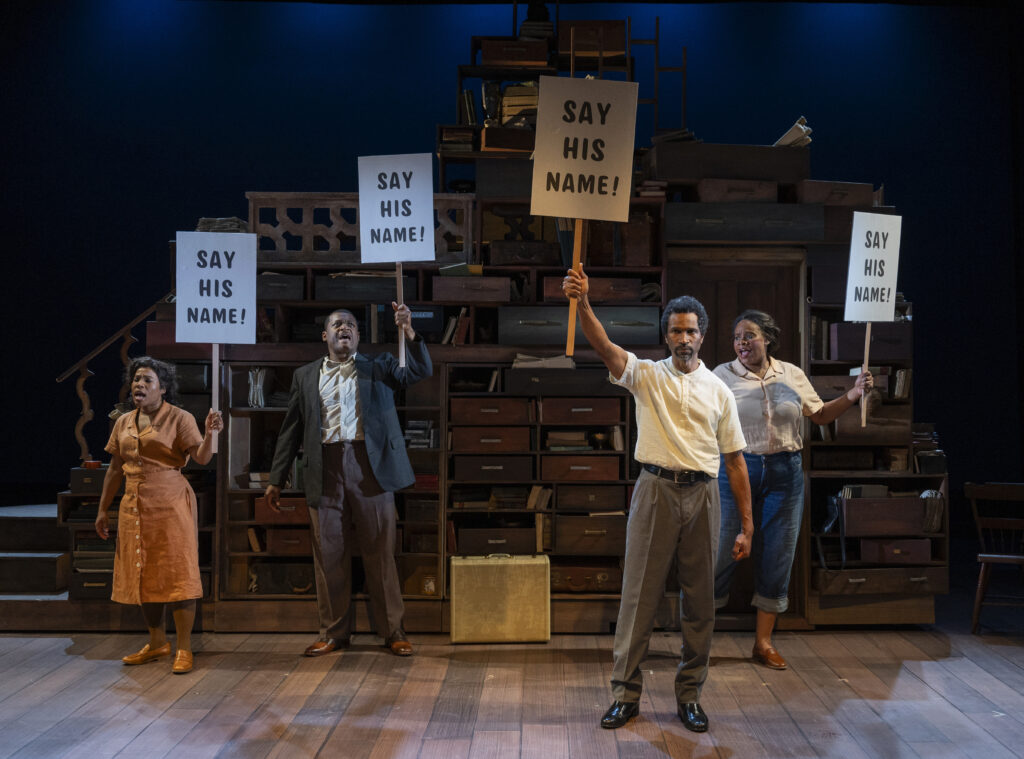
Court Theatre through June 16
Highly Recommended
Chicago Playwright Nambi E. Kelley corrects a serious wrong with her play now onstage at Court Theatre: She tells us the essential facts of the life and philosophies of Stokely Carmichael. Her play, Stokely: The Unfinished Revolution, features an ideal cast expertly directed by Tasia A. Jones.
Carmichael’s is a story every Chicago child should learn because of the critical nature of his time in Chicago. In fact, it is a story every child – and adult – should know because it spans so many important moments and figures in the Civil Rights and Pan-African Movements across America and Africa. And yet this key figure in the Black Power Movement is too often forgotten. What’s impressive about Carmichael, later Kwame Ture, is how many major figures of his time he met – Ella Baker, James Baldwin, Fannie Lou Hamer, Martin Luther King, Bayard Rustin, John Lewis. Even more amazing is how much Carmichael absorbed from each, and how he molded it into his own cohesive philosophy/vision. Kelley conveys this in her play through a series of fragments, scenes that build on each other, starting with Carmichael’s youth in Trinidad, where he is plagued by asthma, and cared for and doted on by the women in his family. His mother leaves for the US when he is a child, and he joins her and his father at 11. His radicalism begins at Bronx High School of Science, and continues at Howard University. Carmichael is one of the original Freedom Riders for the Student Nonviolent Coordinating Committee (SNCC), and later is active in the Black Panthers. His efforts to build a coalition between these two organizations are not successful. There is much more in Stokely: The Unfinished Revolution but it’s best to let it be discovered in the theater.
The cast is a revelation and provide an excellent escort through this essential life. Anthony Irons, a veteran of Congo Square and Lookingglass theaters, brings all the right electricity and passion to Carmichael, and easily navigates the innocent childhood scenes as expertly as he does those of the adult man full of passion and appropriate rage. Other standouts are Kelvin Roston Jr. and Melanie Brezill, both of whom I’ve long admired on Chicago stages. They play a variety of roles with aplomb and style that captures the famous people they portray using a few mannerisms rather than trying to impersonate them. Even though he doesn’t resemble Baldwin or King, Roston has the exact speed of Baldwin’s speech down pat with its quick brilliant rage, and he holds his cigarette exactly as Baldwin did. He captures the strong stubborn side of King is a rare private moment of disagreement that rings true. Brezill is an elegant Miriam Makeba, sure in word and movement.
My only critique of Stokely: The Unfinished Revolution is that too much is made of his mother’s leaving him behind for America. This is not uncommon in immigrant families nor is it uncommon to have tensions between parents and children, especially those who have different political beliefs. Perhaps Kelley is right that this was a major issue for Carmichael but I always prefer to hear about accomplishments rather than personal problems. You still have a couple days to learn more about Carmichael’s life and work in this stellar production at Court so don’t miss it. It’s not the first time I wished Court Theatre had longer runs!
Jump
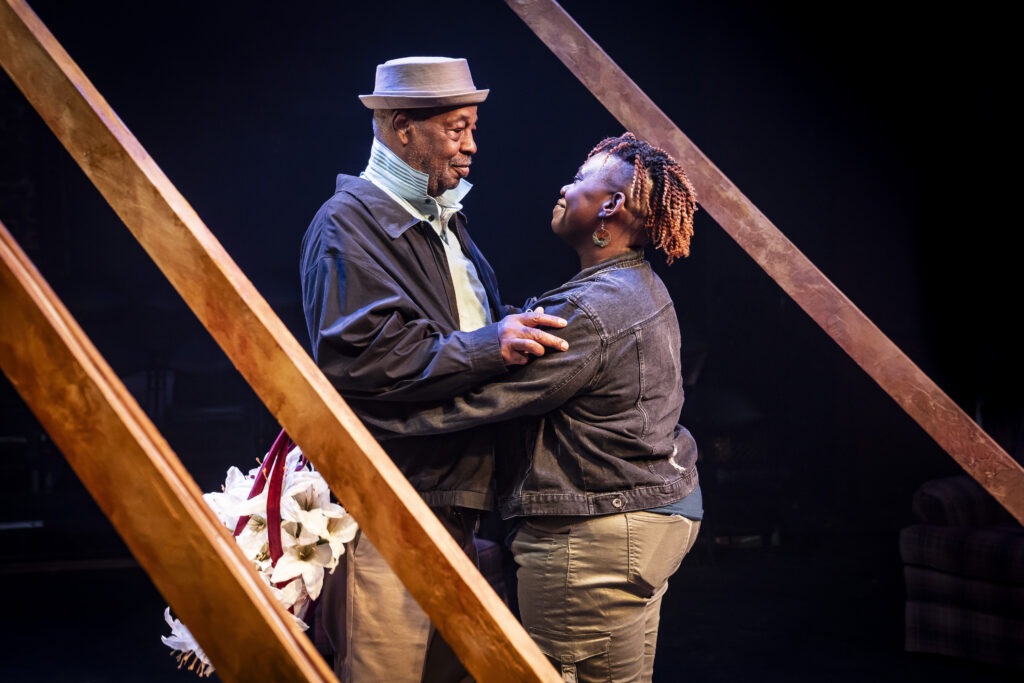

Shattered Globe Theatre at Theater Wit through June 1
Recommended
I have a passion for bridges so Jump had me hooked from the start. Lindsay Mummert’s looming bridge that bisects the home of the sisters at the heart of this play takes center stage. It hosts chance encounters that evolve into friendships, moments of joyous connection and gripping grief. How fitting that this structure is the first place your eye goes when you take a seat in the house.
Jump’s bridge is flanked by the bedroom of two sisters, the older Judy and her younger sister Fay, who are still grieving the loss of their mother, and other parts of their home. Jennifer Glasse gives us a Judy who struts with success but Glasse expertly reveals her more troubled and broken side. Jazzma Pryor brings all the right edginess to the smart and struggling Fay. As these two work to help their grieving father prepare their house for sale, they relive childhood memories, such an essential part of the process of coping with the death of a loved one.
The family’s living room, façade and front porch sit on the other side of the bridge. Here Alfred H. Wilson, a Chicago veteran who never disappoints, offers a moving portrayal of a widower struggling with his own pain as he tries to move on and fix himself. The scenes he has with his more challenging younger daughter Fay are particularly touching as the two try to connect.
But back to that bridge. It is a place where the characters come to resolve many matters that I will not spoil by divulging, other than to praise the fourth actor in Jump. Jeff Kurysz is Hopkins, a lonely graduate student who befriends Fay in her late-night visits to the bridge. Their connection, and the way they open up to each other, is touching, and played by both with the ideal mix of suspicion and warmth. The fact that Hopkins’ professional pursuit is the result of an accident rang true, and made me laugh out loud since it involves one of my late beloved husband’s fields.
As someone far too familiar with the grief of losing a spouse and a parent, Jump spoke to me. I’m not sure the circumstances that occupy the center of Charly Evon Simpson’s play, ably directed by AmBer Montgomery, can ever be fully understood but Jump makes an admirable effort to do so. What it does even better is to examine the grief of those left behind with too many questions and such great sorrow. Even if you have yet to experience that, the way this play plumbs loss, memory and human connection makes it worth a trip across its arching bridge.
It’s Not Theater But It’s Definitely Art Worth Seeing!
Georgia O’Keeffe: “My New Yorks”
The Art Institute of Chicago through September 22

Christina Ramberg: A Retropective
The Art Institute of Chicago through August 11

Both Highly Recommended
I am a firm believer that brilliant art has the power to transform us, to force us to see the world differently, to make us better people. And so it was with great joy that I took in, and was altered by two extraordinary exhibits now at The Art Institute of Chicago, as were the two friends I invited to accompany me.
Both exhibits of are of artists I admire, Christina Ramberg and Georgia O’Keeffe. I teach O’Keeffe to my eager and adorable elementary-age Chicago Public School students, and sing Louis Armstrong’s “What a Wonderful World,” stressing the lines “I see skies of blue and clouds of white” – apparently forbidden but who knew you couldn’t sing in a museum? – on the stairs under her epic 1965 painting “Sky Above Clouds IV.” It is the song we sing to help our children transition from their school day to our after-school program, and we started our Art Institute tradition on our first post-pandemic field trip, an act that delighted other patrons enough that they burst into applause, which, in turn, delighted our students.
But back to O’Keeffe. With the exception of this painting, I’ve reached my lifetime limit of her Southwestern work. Those flowers do, however, enchant my students so I was pleased on this year’s visit when they gravitated to her 1926 painting, “The Shelton with Sunspots, N.Y.,” which is also in the museum’s collection. It’s one I’ve always adored for its angles, and the way it honors New York architecture with those sparkling sun spots. Imagine, then, my elation at the treasure trove of O’Keeffe’s New York paintings in this new exhibition. Some are absolute stunners, like her 1927 “Radiator Building—Night, New York” and “New York Night.” They capture the architectural gems of the city’s historic skyline, and reveal a less-known side of O’Keeffe.
Though I am usually irritated when an artists’ biography is allowed to eclipse their art, as is so often the case in these days of too much memoir, the stories and quotes here are just right. Photos by her famous husband American Photographer Alfred Stieglitz, some of which are already familiar, confirm his ability to bring out her striking looks. They also show how this promoter of modern art shaped her career in positive and negative ways, and the role her New York paintings played in how she defined herself as an artist. It is almost impossible not to compare their marriage to that of Mexican Artists Frida Kahlo and Diego Rivera. There is much here to be seen, learned and enjoyed so I won’t spoil it. My only quibble is with some of the curatorial choices, especially the final painting. I understand the idea was to be chronological but ending with a stronger artwork would have better capped such a monumental show.
The exhibition that stole my heart was Christina Ramberg’s. I knew her work in the Art Institute, and her role in the Chicago Imagists AKA the Hairy Who. I’d always thought of her as an artist whose paintings were about female bondage. I was way off the mark. Her early works were inspired by her watching her mother dress to go out by donning long-line bras and girdles, something I recall from my youth watching my mother. It was a bizarre transformation but Ramberg makes it beautiful. Her later works show the female form in other situations of pain, longing, heartbreak and beauty. She even has a series inspired by hair and another by origami. Without exception, Ramberg’s art is bursting with beauty, content and psychological depth. Her technique is nothing short of genius. The way she builds texture and creates an iridescence on canvasses will take your breath away. Again, the details of Ramberg’s life are just enough to add meaning to what you see without overwhelming it. Again, I don’t want to reveal too much so that you can experience the joy and beauty of what she created.
I returned to both of these exhibits because I just can’t stop talking about these extraordinary artists to everyone I know, and thinking about what they gave us. It is nothing short of magnificent.
Joe Turner’s Come and Gone
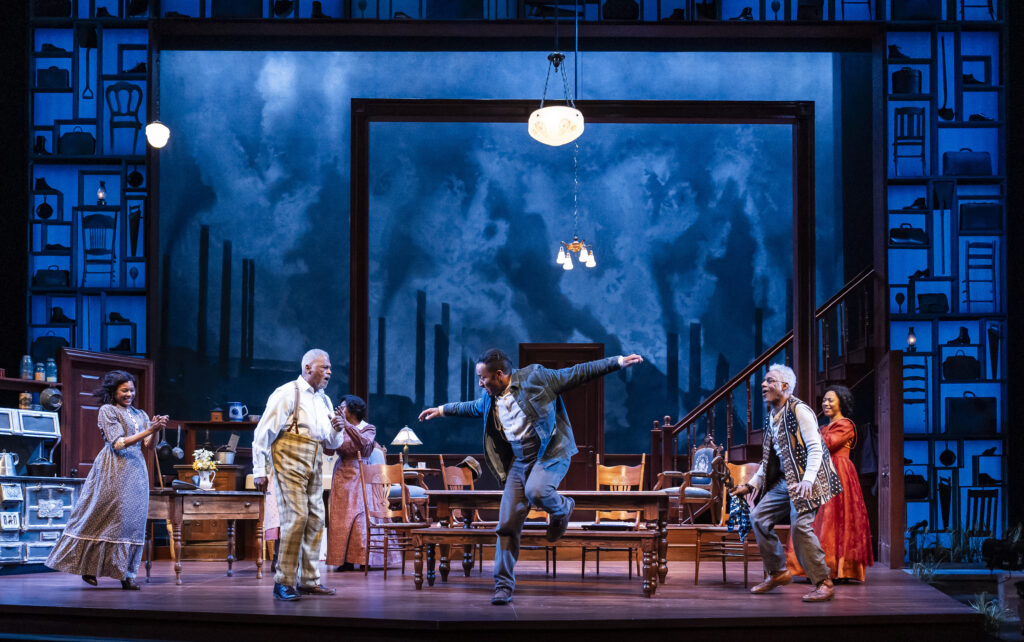
Goodman Theatre through May 19
Highly Recommended
How fitting that August Wilson’s Joe Turner’s Come and Gone opened a day after what would have been William Shakespeare’s 460th birthday since I’ve always considered Wilson the Bard of the Black American experience of the 20th century. His “Pittsburgh” or “Century Cycle,” 10 plays based in “The Hill” neighborhood of his native Pittsburgh that cover each decade of the 1900s, is as universal as Shakespeare’s plays about English history or troubles in Italian cities or imagined places. It’s excellent to have an American Bard because, after all, Black history is our history, and these two playwrights give us universal plots and characters with sparkling soliloquys, devastating dialog, heartbreaking humor, charismatic characters and storylines that grab us where it counts.
Joe Turner’s Come and Gone is the second play in Wilson’s series, set in the 1910s at the beginning of the Great Migration as African-Americans from the South headed north in hopes of jobs and better lives. As always, Wilson’s humor travels easily from everyday wisdom and chatter to laugh-out-loud commentary to profound poetry. His ear for the poetics of the mundanities of everyday life is dazzling whether he is capturing true love in the banter of a long-time couple all too aware of each other’s strengths and weaknesses or the advances of a rake who hits on anything in a skirt or a man with estimable spiritual powers or a heartbroken woman.
Goodman Resident Director Chuck Smith makes sure everyone in his stellar cast shines. Dexter Zollicoffer and TayLar as Seth and Bertha Holly, are the ideal mix of love and irritation as the longtime couple in whose boardinghouse the play takes place. Tim Edward Rhoze’s Bynum Walker, a resident with spiritual powers that aggravate Seth, is a wonderful combination of assured patience and power. Nambi E. Kelley captures the fragile and wrecked but still hopeful nuances of Mattie Campbell, a beauty who gets left by the men she loves. Anthony Fleming III brings all the right impetuousness and passion to Jeremy Furlow, the often enraged and rudderless rake who breaks her heart yet again. Gary Houston’s Rutherford Selig seems like a hapless white man who stumbles in and out of Saturdays with the detritus of his wandering sales until his recitation of his ancestors’ occupations that starts with slave ships and reveals the depth of American racism. A.C. Smith, an esteemed veteran of Chicago stages, is perfection as the menacing and broken Herald Loomis. He hovers over the play, reminding us of the ugliest parts of being Black in America, caught by omnipresent chains that merely shift from slave ships to chain gangs to jails and prisons.
Linda Buchanan’s set of the boarding house kitchen, backyard and parlor is period-perfect, and made more ominous by a grey backdrop of the steel mills marking Pittsburgh’s industrialization, and the surrounding frame of the belongings of the residents of The Hill. Evelyn Danner’s costumes capture the styles of the 1910s with appropriate individual touches that offer insights into each character.
I have been fortunate enough to see each of Wilson’s plays, some more than once, and had the honor of telling him at the opening of the Goodman’s King Hedley that he was the winner of the Harold Washington Literary Award, so I have a special place in my heart for his work. This is my second time seeing Joe Turner’s Come and Gone and, as is so often the case with classic art, I found much more to love thanks to this excellent production. I urge you to take in this play for its poetry, humor, veracity and beauty before Joe Turner goes.
Brooklyn Laundry
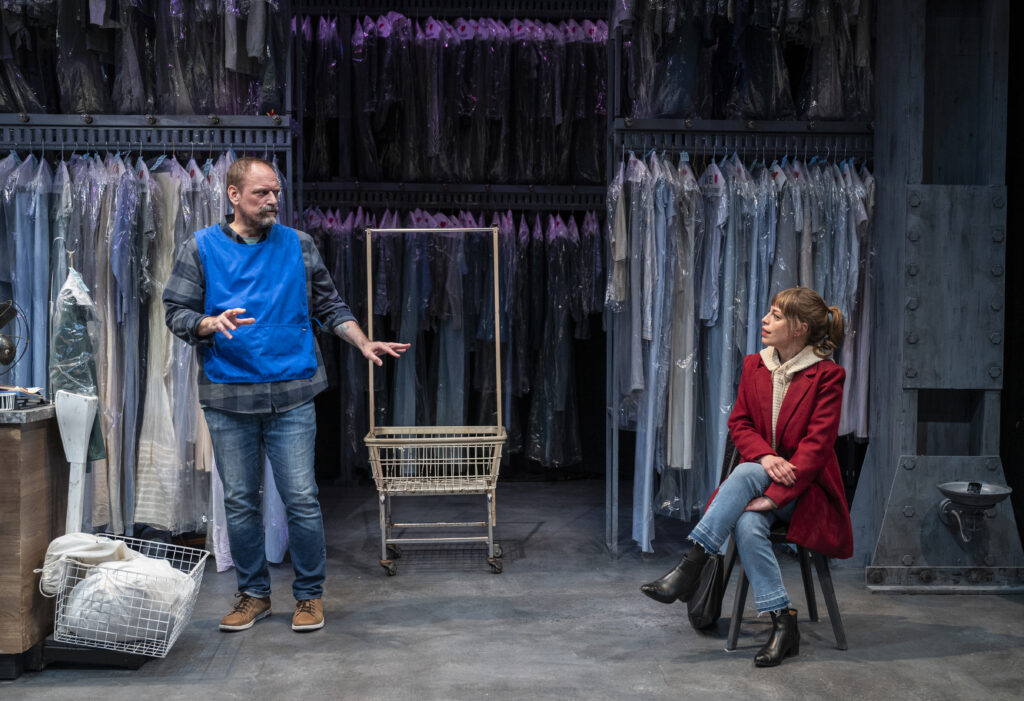
Northlight Theatre through May 12
Recommended
It’s hard not to be drawn to the quirky odd couple struggling to connect in Brooklyn Laundry. The play captures the awkwardness of meeting someone who is not quite right for you but on whom you decide to take a chance.
Its creator, John Patrick Shanley, is best known for Doubt; A Parable, which won a Tony Award and the Pulitzer Prize, and for the script of the movie Moonstruck,which earned him an Academy Award. His latest play, Brooklyn Laundry, is sweet and slighter than either of those but is brought to appealing life by the actors and the sure-handed human connection made by Director BJ Jones, who is also Northlight’s artistic director.
Cassidy Slaughter-Mason is a knockout as the insecure, decision-averse Fran who wanders into a Brooklyn laundry in a state of angst. Her ability to play strong women facing unbearable obstacles without self-pity impressed me in Raven’s The Luckiest,and earned her a Jeff Award for Best Performer in a Principal Role. Here Slaughter-Mason is equally strong as a woman trying to find a bit of joy for herself even as she faces an extraordinarily painful familial situation.
Mark L. Montgomery is Owen, the man who owns the laundry, and has had his own full load of pain and sorrow. It’s not clear what appeals to Owen about the hot mess that is Fran in the first scene but he asks her out on a date. What follows is a series of charming moments and heartbreaking circumstances as these two try to figure out what they want from each other. Montgomery has brought his estimable talent to many Chicago and Broadway stages, including to Northlight’s for Shanley’ Outside Mullingar, but this portrayal feels different. Here he brings Owen to life by animating him with a highly idiosyncratic but appealing physicality comprised of facial expressions, ticks and a gift of gab that comes and goes. The result is that Montgomery gives us an evening with an endearing oddball.
Jeffrey D. Kmiec’s set is nothing short of astonishing with its vertical and horizontal rows of racks of clean laundry. It’s almost as if all the local laundries had an orgy, procreated and moved in together.
But that is just one reason to see this show. Go for the acting, and for the opportunity to see the sorrows and joys of human connections.
Purpose

Steppenwolf through May 12
Highly Recommended
From the moment Jon Michael Hill opens his mouth in Purpose you know you are in for an evening of profound thought from a deeply intelligent and sensitive person with a deliciously ironic sense of humor. It turns out that you will also take a wild ride through the lives of his powerful political family that will keep you laughing even as you are amazed by the cruelty and wisdom of its members.
Branden Jacobs-Jenkins fierce play crackles with electric language, rapid-fire dialog, intense politics, the troubling dynamics of a deeply disturbed family that manages elegance, wisdom and leadership in the ruins it inherited and those it has created. I hope we will see more of his whip-smart work on Chicago stages.
Phylicia Rashad’s vision and her talented corps of actors transports us from the gut-splitting though the heartbreaking moments. There’s not a weak performance here; in fact, all are over the top in the best way possible offering layered interpretations of complex characters.
Meet the Chicago-based, well-connected Jasper family, reminiscent of the Jackson dynasty, as in Jesse. It is led by Solomon “Sonny” Jasper, a Civil Rights icon versed in religion and politics who, while revered, was never quite at the center of the action. Harry Lennix shows us his power, sorrow and cruelty as he moves between being committed to his ideals, worshipped by his followers and disappointed on multiple fronts. Jon Michael Hill plays Nazareth “Naz” Jasper, the runaway and perhaps prodigal son with the right doses of distance, understanding and acceptance. Glenn Davis is perfect as his tortured brother, Solomon “Junior” Jasper, whose return from incarceration for tax fraud has occasioned the celebration dinner at the center of the play. Alana Arenas gives a biting performance as his unhappy wife Morgan, who is all too aware of how being a Jasper is a cross to bear. A different wifely model is offered by Tamara Tunie as Claudine Jasper, who stands by her man while standing up to the world and protecting her male tribe of a famous father and two not-as-successful sons. Tunie’s portrayal of the perfect political wife who is as strong and manipulative as she is loyal hits home. Into this mess of family matters comes Aziza Houston, an idealistic young friend of Naz’s who finds herself with eyes increasingly wide open. Ayanna Bria Bakari captures the range in this pretty idealist who turns out to have some snap as well as sense.
Dede Ayite’s costumes couldn’t be better at expressing the personalities of each character from the bright flowing garments of Claudine to the somber, studied garb of her husband. Todd Rosenthal’s set evokes one of those lovely Bronzeville or Kenwood homes with its warm colors, tasteful furnishings, African art and shrine to Dr. King.
One doesn’t want to give away all the plot twists, turns and outright shocks in this world premiere but suffice it to say that they will keep you at close attention. And they will keep you laughing and sometimes sighing at the wisdom that emerges from hurt and ugliness. Purpose is sure to be a hit and it is a show not to be missed because it reveals so much about families, Black politics, religion and life as we should know it all delivered in a wonderful cascade of jewel-bright language by top-notch actors.
How I Learned What I Learned

Congo Square Theatre at Broadway Playhouse through May 5
Highly Recommended
How engaging and edifying to spend an evening with Playwright August Wilson, whom I consider the Bard of the Black American 20th century experience. Equally excellent is that Harry Lennix, an esteemed film, stage and television actor, plays Wilson.
Lennix expertly assumes the mantle and becomes the man – the beloved playwright whose 10-play “Century Cycle” about life in “The Hill” neighborhood of his native Pittsburgh, and in the universe of Blackness, remains relevant and still sings to us. In fact, Lennix stepped away from his powerhouse portrayal of the patriarch of a Chicago political dynasty in Steppenwolf Theatre’s well-reviewed Purpose, to do this one-man show. “We get a glimpse into the brain of August Wilson,” Lennix said in a WGN interview, “the events that led him to create some of the most memorable characters in the American theater canon.”
Wilson’s description of his early years and battles he endured for being Black make up this autobiographical show written three years before he his tragically early death of liver cancer at 60. It is full of the gems of his childhood and youth. One particularly poignant story reveals an essential lesson in respect and principles from his mother, who taught him that “Something is not always better than nothing.” I loved the parts about Wilson’s teenage years in the Carnegie Library of Pittsburgh. He spoke at length about playing hooky from high school at that library, and devouring everything on its shelves, in his acceptance speech after winning the 2004 Harold Washington Literary Award (full disclosure that I was on the selection committee and was honored to be able to inform Wilson of his prize at Goodman Theatre’s opening of King Hedley II). What a glorious education! And then there is the poetry of this piece, not surprising for a man who started off as poet, and was later called “theater’s poet of Black America.” Wilson’s plays are filled with poetry, in the brilliant monologues and the everyday exchanges of his characters, but here you get lines like “The hills frantic with houses. / The hills nippled with houses.”
The play is ideally directed by Ken-Matt Martin to showcase both Wilson and Lennix. Sydney Lynne Thomas’s set captures the lovely clutter of a brilliant mind with books piled everywhere, comfortable chairs for reading and writing, objects that trigger memories and stories, all under an arcing bookshelf that offers a halo to all these words and ideas. Surrounding that Rasean Davonté Johnson’s spot-on projections flash the relevant words and phrases of Wilson’s anecdotes. Reuben Echoles’s costumes allow Lennix to move through Wilson’s stories and ages with style.
How I Learned What I Learned is the perfect complement to Wilson’s plays. His comments illuminate his characters but you don’t have to see his plays to enjoy this show nor do you have to see this show to enjoy his plays. Each stand alone in their dramatic glory.
The best plan would be to see this and August Wilson’s Joe Turner’s Come and Gone in a spectacular production at the Goodman Theatre, the first theater to do the entire “Century Cycle.” You only have until May 5th to catch How I Learned What I Learned. This Chicago premiere is a fine way to mark the 25th anniversary of Congo Square Theatre, at which Harry Lennix is a longtime Board member. The way I see it is that there’s never enough August Wilson in our world.
Rosencrantz and Guildenstern are Dead
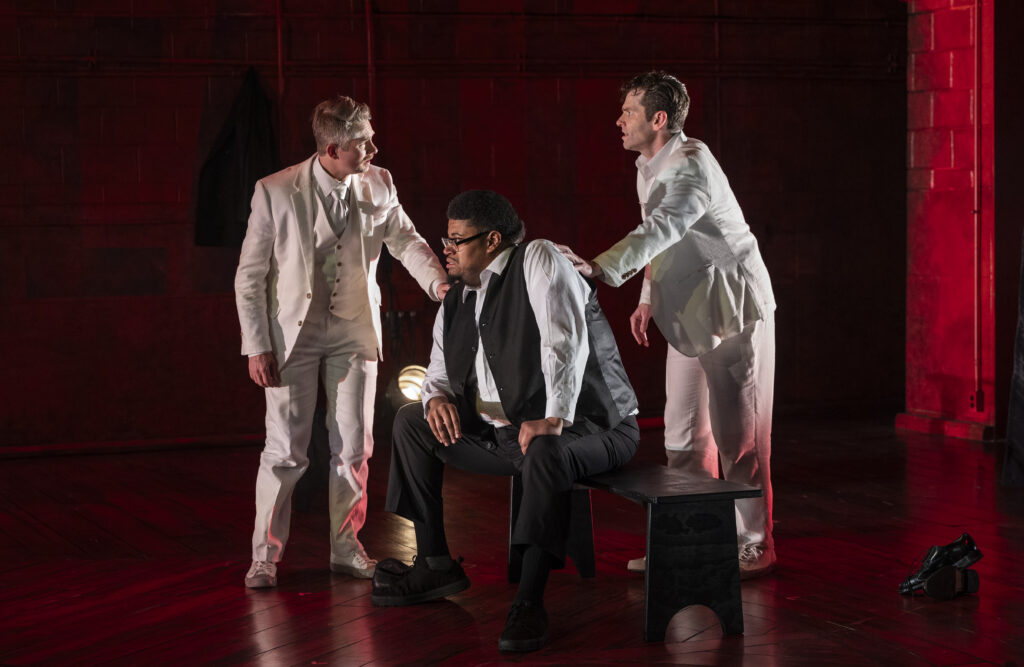
Court Theatre through April 28
Highly Recommended
What a joy it is to hear Tom Stoppard again in Chicago, and it’s a particular delight to see his linguistic acrobatics catapulted into tongue-twisting and physical magic courtesy of the captivating comedic acting now onstage at Court Theatre.
Rosencrantz and Guildenstern are Dead is a powerful farewell from Director Charles Newell, who has led Court for 30 years and will become its Senior Artistic Consultant this summer. In those decades, Newell often reinterpreted the classics, for which this theater and the University of Chicago to which it is connected are known, in often-arresting new ways. As artistic director, he welcomed Black plays, actors and audiences.
Stoppard wrote his absurdist play in the 1960s when artists, intellectuals and theater-goers around the world were still recovering from World War II, embracing Albert Camus, Jean-Paul Sartre, Samuel Beckett and the Existentialists, being mired in the Cold War and fearfully watching the shadows cast by the Soviet Empire. Stoppard, who used to refer to himself as a “bounced Czech” certainly knew what being crushed by the Soviets meant, and that sense of lack of control and unrelenting grappling with the inevitability of one’s fate wraps itself around his take on Hamlet.
Shakespeare’s brilliant Hamlet is, of course, a star in Stoppard’s universe, and his characters pluck and illuminate critical lines and moments from the classic play. This requires a facile cast, clever enough to keep up with both linguistic geniuses and be able to make quicksilver leaps from Shakespeare’s poetry to Stoppard’s more contemporary wit.
I’ve never seen Erik Hellman do anything but excel in any role but here, as Guildenstern, the smarter half of the R&C duo, he masters the mix of intelligence, contemplation of life and fate, irritation at and affection for Rosencrantz without ever seeming to stop for breath. Nate Burger’s Rosencrantz is an ideal sidekick, lighthearted, a bit slow on the uptake, clingy, taunting and loyal. As the head of the theater troupe that will replay Hamlet’s play within the play, and other critical scenes from Hamlet, Lorenzo Rush Junior is full of majesty and presence. He directs his corps of players with intelligence and purpose. The rest of the players in the ensemble are strong as well but Blake Hamilton Currie’s Hamlet deserves kudos for his ability to traverse a range of emotions, as one must expect from the prince of Denmark, while walking on palace walls and shipboard.
Newell’s direction and vision create a snap and buzz. John Culbert’s blazing red is perfect for this tale of murder, revenge and tragedy. Raquel Adorno’s costumes compliment the set. She starts Rosencrantz and Guildenstern in white suits, which they lose near the end of the play when they don the black acting/mourning garb of the other actors.
The only weak moment is the musical choice at the end, which undercuts an otherwise brilliant interpretation of this early piece that helped put Stoppard on the theatrical map. However, that’s hardly a reason to skip this show. In fact, even if you are neither a Shakespeare nor a Stoppard fan, go see this one if only for its razor-sharp language, penetrating questions, comedic moments and to say a grateful goodbye to Charlie Newell even as you hope for more such examples of making classic plays contemporary.
Desirable Dance Preview
It’s Spring and in Chicago that means the return of Alvin Ailey American Dance Theater. This season – and the prospect of another evening with the Ailey dancers – always lifts my spirits.
I first saw the Ailey company perform as part of the pioneering Chicago Spring dance series when I was 12. It changed my life. Even though I’d been dancing for nearly a decade, Revelations, Mr. Ailey’s piece about his Texas childhood and the solace its churches offered, pulled me to its heart. Almost everything Ailey is brilliant but this dance defines what true art is, a creation that can be enjoyed again and again over the decades, a classic offering new treasures with each encounter. Parts I shunned when I was in high school and college speak to me now.
I have probably seen Revelations 30 times in my 67 years. It never gets old. I find something new in each performance or simply delight in the genius of the choreography and dancing. I first saw Revelations with my parents, who initiated my love of the arts, and have taken many people to see it since – my children, friends, employees, volunteers, student teachers and students. The last time I saw Revelations was with my beloved late husband in 2013. He had remarked to me that I had never taken him to an Ailey performance, which was an astonishing oversight on my part. I told him I would be delighted to take him but warned him that if he did not find it as brilliant and moving as I did, I would have to divorce him. Fortunately, though not surprisingly, my Darling turned to me and said, “It’s brilliant,” as soon as Revelations ended. Our marriage was saved.
There is much more to AAADT than Revelations, which ends every performance. I still cherish the times I saw Judith Jamison, a supreme dancer and choreographer who took over the company when Ailey died, perform Cry, a dance Mr. Ailey choreographed as a birthday present for his mother. Ms. Jamison’s 1993 autobiography, Dancing Spirit, afforded me the honor of interviewing her during my public radio days.
AAADT is in Chicago at the Auditorium Theatre, an architectural gem envisioned as a palace of the people rather than the exclusive domain of the elite, from April 17 through 21. Don’t miss the chance to see this stellar dance company during its 55th Chicago engagement. Now that’s a revelation worth celebrating!
Alvin Ailey American Dance Theater
Auditorium Theatre through April 21
Highly recommended
Alvin Ailey American Dance Theater is back in town for its 55th Chicago engagement, which coincides with its 65th anniversary season, and the choreography and dancing are as sublime as ever.
Opening night started with Ronald K Brown’s Dancing Spirit, a tribute to Judith Jamison, the stellar dancer and choreographer who took over the company when Ailey died and is now AAADT’s Artistic Director Emerita. Jamison’s 1993 autobiography was also called Dancing Spirit. Brown’s choreography mixes dance styles from Cuba, Brazil and America, and is set to music by Duke Ellington, Wynton Marsalis and War, as a way of “conjuring” the dancing spirits who will showcase the regal presence, grace and magnanimity that marked Jamison’s career as an AAADT star, and her tenure as artistic director. The ensemble embodies this range of excellence but Hannah Alissa Richardson leads this corps with an elegance that reminds me of Jamison’s performances over the years. This intoxicating, fluid new work is indeed an excellent birthday present for Jamison, a gift that will keep on giving to all of us.
Kyle Abraham’s new work Are You in Your Feelings? is a joy to watch as the dancers pair and reconfigure to the choreographer’s mixtape of soul, hip-hop and R & B. Abraham has said the songs are ones he plays during his highs and lows, and that he wanted this piece to be a thank you to the musical artists and for their contributions to our culture. What’s on stage is an examination of love in all its configurations – playful, perplexing, frustrating, sexy, teasing and, in its best moments, in sync. Standouts in this corps are Ashley Kaylynn Green and Chalvar Monteiro, who bring passion and grace to every step they take.
Ailey dancers’ technique is always astonishing, not only for its precision but for the emotional intelligence that members of the ensemble bring to each piece. The synchronized dancing this year is especially spectacular. Nowhere is this truer than in the iconic Revelations, the classic closes every show and sends audiences into such ecstasy that it has an automatic encore with some lovely additional steps by the male dancers.
Having seen Revelations many times since its Chicago debut, I am always struck by how Alvin Ailey’s choreography with its crisp but sensual muscularity never ages. Ailey was 29 when he created this now-classic dance inspired by memories of the solace churches offered during his Texas childhood, and by the works of Activists and Authors James Baldwin and Langston Hughes. Revelations has 3 parts and each part has three dances set to spirituals, gospel and blues. The opening dance is “I Been Buked,” a study in synchronization, a symphony of coordination. The duet “Fix me Jesus” embodies the power of devotion and the possibility of redemption with its slow movements that require strength and a gracefulness made more potent by its slow pace. Each piece has its own texture and personality but it is the whole that converts one into an Ailey devotee. With a few gestures this man can summon profound faith, show the joy in a baptism, reveal the desperation of sinners running, revel in the gossip before Sunday services in a hot Texas church, capture devotion in a duet.
It is hard to imagine a year without the Alvin Ailey American Dance Theater in Chicago. So let your spirits be lifted this Spring by seeing one of its performances.
Love Song


Photos by Nomee Photography
Remy Bumppo through April 21
Highly Recommended
People toss around the phrase “love language” these days as if they were flipping pancakes but Remy Bumppo’s new show turns up the heat with a love of language that will whet your appetite, season your brain cells and make your tongue sizzle. What starts as a snappy show turns into a profound meditation on love and how it changes us.
We get two very different views of love, both completely engaging, courtesy of two couples. First come Joan, played by Sarah Coakley Price with the perfect snap and cluelessness, and Harry, whom Ryan Hallahan portrays as her perfect husband, ready to call her out on anything even as he adores her and provides the proper amount of libation whenever she requests it without question or judgment. They are young and in love but with a healthy candor and skepticism about each other. Their comic genius is present in their banter, reminiscent of Katherine Hepburn and Spencer Tracy but for a contemporary audience and with a bit more modern bite.
Joan’s brother is half of the other couple. Terry Bell ideally portrays the many sides of Beane, a man with emotional and mental challenges, which his loving sister tracks with sometimes irritating attention even if it is tempered by love. His love arrives in the form of an intruder and theirs are the lines that grab your heart even as your jaw drops in astonishment and admiration. The exchanges between Beane as he morphs from a quiet, withdrawn, lonely man into a person of lush fullness, and Isa Arciniegas, whose toughness as Molly is tempered but not buried by love, are breathtaking in their intense disturbing beauty.
John Kolvenbach has given us a perfect Spring play that calls to mind Alfred Lord Tennyson’s famous line about young men’s fancies turning to thoughts of love, and improves it by letting smart women in on the arrangement. Marti Lyon’s surehanded direction finds the humor and the heart of this piece. How delightful to be reminded that love transforms us by changing not only how we see the world but how we smell and taste it, experiencing emotions that set our imaginations – and passions – free.
The giddy love of language that permeates Love Song is enhanced by Joe Schermoly’s set that puts Joan and Harry in an apartment with young professional couple furniture and a fabulous urban view, and Beane and Molly in a dingy grey flat with limited accoutrements of life. Kotryna Hilko’s costumes reveal more about each couple.
Do everything you can to grab hold of these love stories so you can engage in the ecstasy of their language and the love they offer. They will make your heart sing!
Notes from the Field

TimeLine Theatre through March 24
Highly Recommended
Take the pulse of the state of Blackness in America with Anna Deavere Smith’s unstintingly honest portrayal currently at TimeLine. Notes from the Field offers a layered, and therefore insightful, view into what happened to our country’s educational and criminal justice systems to bring us to where we are. It is not a night without hope, but it is a night that will open your eyes and break your heart with its gripping words and powerful acting.
Smith’s latest offering is a series of 19 monologues culled from more than 250 accounts and interviews she did with students, teachers, prisoners, activists, scholars, leaders, politicians and victims’ families. Individually and as a whole they reveal the injustices that exist in our country as we continue to emphasize the incarceration over education and keep feeding the school-to-prison pipeline.
Smith burst on the national theatrical scene in the late 1990s with Fires in the Mirror, sparked by the 1991 race riots in Crown Heights, New York, and Twilight: Los Angeles, 1992, which offered multiple views of the Rodney King beating. These two installments in Smith’s “On the Road: A Search for American Character” placed her firmament of chroniclers of our times like Chicago’s own Studs Terkel but she focused on race, crafting plays from the excerpts of the thousands of interviews she did for each piece and acting them out with passion and presence around the country.
While Smith usually performs all the monologues in her pieces, Director Mikael Burke’s decision to divide the monologues gives us three stunning actors who easily pick up Smith’s mantle in Notes from the Field. Mildred Marie Langford, Shariba Rivers and Adhana Reid use but the barest of costumes, a jacket or shirt here and there, and profound dramatic power to morph from person to person with grace and passion. The idea of having women play men and Blacks play whites, Latinx, Asians and Native Americans is particularly poignant and effective in this show, as it has been in Smith’s past works. It is also a splendid showcase for three women to display their acting talent.
Each act has a knockout monologue. Rivers fully inhabits Pastor Jamal-Harrison Bryant in one of the evening’s most moving moments. She delivers his angry yet compassionate eulogy that offers comfort to the mother of the murdered Freddie Gray and to the Baltimore community seeking answers for why another Black man who did nothing wrong is dead after a police encounter, a eulogy that is a clarion call to action and a wake-up call to all who hear it. In the second act we meet an activist lawyer who founded The Equal Justice Initiative and the National Memorial for Peace and Justice who gives a sensitive and thoughtful summary of what we’ve heard. Langford’s portrayal of this scholar captures his compassionate analysis with the perfect mix of knowledge, despair and hope.
Together this theatrical team breathes new life into Smith’s examination of how our failures in our educational and criminal justice systems have undermined Black Americans and prevented them from experiencing the American Dream. They make true the subtitle to Notes from the Field, which is Doing Time in Education.
If all this scares or depresses you, take heart. This is a show that will also move you, make you laugh and serve as a call to action so act and see it before it closes on March 24th.
Matchbox Magic Flute
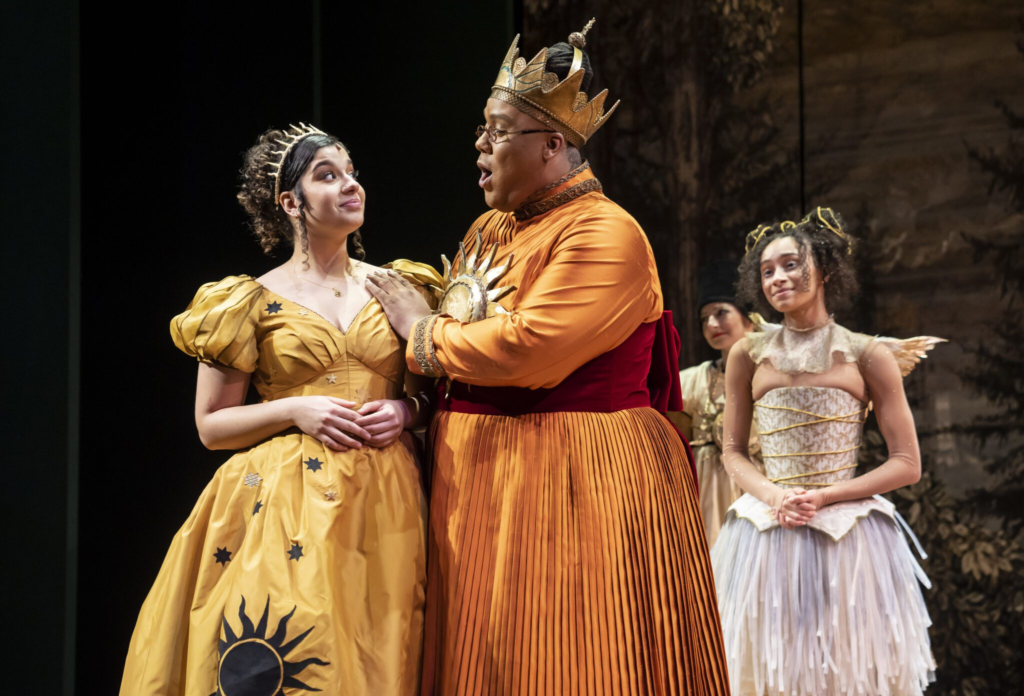
Goodman Theatre through March 24
Recommended
Catch this delightful confection before it closes this Sunday! Here is Chicago Director Mary Zimmerman’s diminutive but sincere valentine to Wolfgang Amadeus Mozart’s lovely opera The Magic Flute, which premiered two months before Mozart’s shockingly premature death at 35.
Think of this latest offering as reminiscent of the early days of Redmoon Theater, of Lookingglass Theatre Company and of Mary Zimmerman’s best work, which finds the humor in more serious works. This is vintage Zimmerman with all the antique trappings of the fanciful works of Redmoon, including the signs that look like they came from silent movies, and here are paraded across the state in the hands of an enchanting sprite.
This sprite, officially named The Spirit, is winningly played by Reese Parish, a senior at DePaul University who bursts with charm and talent, both understated in a mature way. Other standouts in the performance are Keanon Kyles, who plays the sorcerer Sarastro with majestic presence and a resonant voice that commands attention. The serious lovebirds are well-played and well-sung by Billy Rude as a calm and brave Prince Tamino and Marlene Fernandez as a sweet and slightly mischievous Princess Pamina. The comic lovebirds – Shawn Pfautsch as Papageno, the silly bird catcher looking for love and Lauren Molina as the winged beloved who preens and pecks to perfection – strut their avian ardor with passion while tickling us with feathers of humor as they trip through the famous “Pa-pa-pa” duet.
Ana Kuzmanić’s costumes are another tasty confection from the celestially-themed garments of royalty to the Mason-inspired robes and fezzes of the musicians and actors. Todd Rosenthal’s set proves that small is mighty with its doors and windows that offer many surprises as they flank the lush elegance of the set of Mozart’s time.
All of this is great fun and makes for an enjoyable evening but it is like a meal of appetizers that leaves one wanting a main course. Zimmerman’s certain talent for mining and charming audiences with the whimsy in iconic works is delicious but it also takes away from the power of Mozart’s opera, in which the Enlightenment has a starring role. We get a hint of that in Sarastro’s golden costume and wise presence and T.J. Gerckens’ lighting but to really grasp the transformative role of The Enlightenment on European thought and art, and on Mozart, we need more. It would be wonderful if those fezzes were but the start of an exploration of Mozart’s membership in the rationalist corps of the Masons who were inspired by the Enlightenment. Then, again, perhaps that’s asking a lot for a “Matchbox” Magic Flute. So see it for its whimsy and sweetness and make it an introduction to Mozart’s Magic Flute for any children you adore.
Given all the humor, it seems a shame not to recall the great line delivered decades ago by Tom Lehrer, the American musician, singer-songwriter, satirist, and Harvard University mathematician. “It is a sobering thought that when Mozart was my age,” he observed, “he had been dead for two years.”
Waste no time. Go to Goodman and laugh as they sing.
Anything Goes
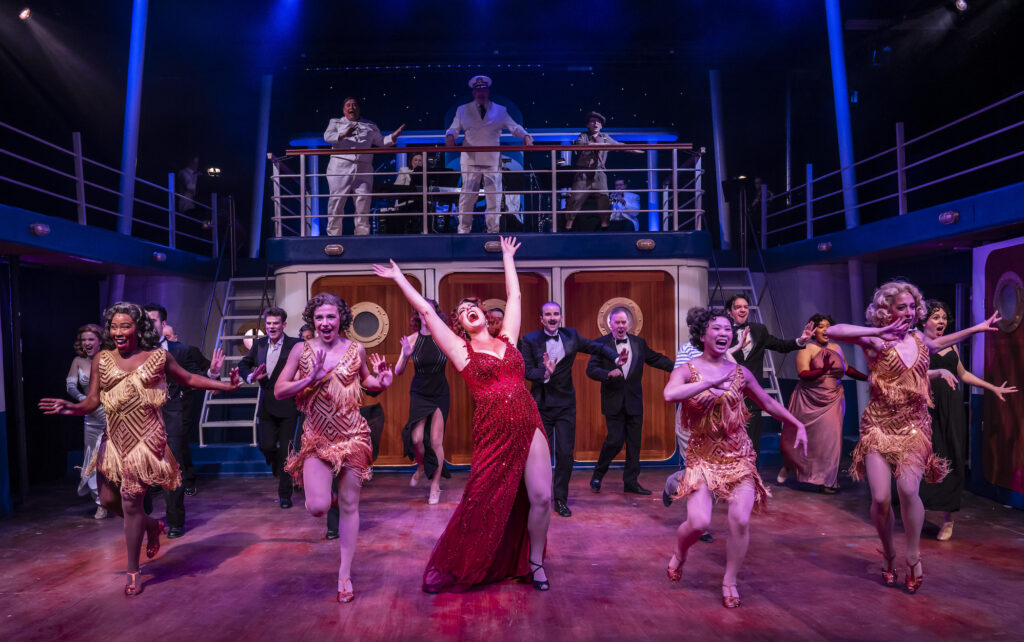
Porchlight Music Theatre through March 10
Highly Recommended
What better way to celebrate the 90th anniversary of the iconic Cole Porter’s Anything Goes than with Porchlight’s dazzling revival? The show starts with Cole Porter singing, the perfect way to begin an evening of brilliant songs, gorgeous dance and wild antics that will keep a smile on your face.
Music and lyrics are by Porter and include such brilliant standards as “I Get a Kick Out of You,” “Easy to Love,” “It’s De-Lovely,” “All Through the Night” and, of course, “Anything Goes.” The original book was a collaboration of British Author P. G. Wodehouse and Anglo-American Playwright Guy Bolton, later revised by the well-known Broadway team of Howard Lindsay and Russel Crouse. Crouse’s son Timothy, revised Anything Goes with John Weidman. Porchlight is using their commissioned 2022 version.
The storyline features the themes of its era with amorous pursuits that take place on an ocean liner bound for London from New York. Billy Crocker is a stowaway in pursuit of his beloved, heiress Hope Harcourt, who is engaged to a British lord. Also on board are nightclub singer Reno Sweeney and Public Enemy No 13, “Moonface” Martin who are helping Billy to secure his adored heiress.
The acting, singing, dancing and music-playing talent onstage is spectacular with not a loser on board this ship but there are a few standouts As Reno Sweeney, the mellifluous Meghan Murphy steals the show with her supple voice that goes from notes of simple beauty to full-throated glory without a pause. Her renditions of “Blow, Gabriel, Blow” and “Anything Goes” brought the audience to standing cheers. In every duet Murphy performs – especially “You’re the Top” and “Friendship” – she both steals the show and elevates her partner by making him shine too. That is a talent rarely seen on any stage. Cole Porter fans are accustomed to hearing these songs sung as solos. The chance to hear them as duets, which Porter intended, as battles of wits is pure joy.
Steve McDonagh as Moonface Martin is a delight of underhanded hijinks and marvelous touches. His traveling companion, Erma, girlfriend to a fellow mobster, is played with zest by Tafadzwa Diener, who delights in the attention of the ship’s crew.
Porchlight’s Artistic Director Michael Weber applies all the right touches to this delightful show and Tammy Mader’s choreography for the large dance numbers makes it De-Lovely. Jeffrey D. Kmiec’s set, with its upper deck, where a top-notch musical corps sits, and three revolving doors that enhance the madcap movements of the cast, is ideal. Rachel Boylan’s costumes are luscious and period-perfect. One can’t wait to see Reno Sweeney’s next dazzling outfit.
Whatever you do let nothing stand in the way of your seeing Porchlight’s spectacular staging of Anything Goes in its last week.Just go! Chicago’s talented Porchlight crew does Cole Porter’s musical proud.
2023 Raves
Just one of Those Things (And More): The Nat ‘King’ Cole Story

Stewart Music Emporium at Mercury Theater Chicago’s Venus Cabaret Theater through January 7
Recommended
You still have a couple weeks to enjoy the warmth and love of Nat ‘King’ Cole’s vocals courtesy of Gregory Stewart, Jr., the star of Just one of Those Things (And More): The Nat ‘King’ Cole Story. Mr. Stewart channels the lyrical talent and suave charm of Cole in his revue, which mixes song and the story of this long-time Chicago resident.
Cole was an African American pioneer — the first to host a national television show; the first to have a Las Vegas residency and the top-selling and only Black performer on Capitol Records. Like most African Americans, he faced intense racism. Reared by a minister father, Cole quit school at 15 to work as a jazz musician but became a singer the first time he was asked to sing.
Stewart performs a number of Cole’s songs, including “Unforgettable,” “Mona Lisa,” “Smile,” “Straighten Up and Fly Right,” “Route 66” and “Chestnuts Roasting on an Open Fire.” Musicians Will Oats on piano, William O. Whitehead III on drums and Isaiah Horne on bass are talented accompanists.
Writer and Director Janine Stroemer makes sure to include relevant Chicago details like Cole’s attending Wendell Phillips Academy High School. Stewart’s elegant suit, tux and tie are period-perfect. He works the cabaret venue and crowd expertly, moving between stage and a small set with family photos and awards.
If you want to spend a lovely evening with a man who seems destined for a more visible musical career, this is your show. If you’re a fan of Nat ‘King’ Cole or just someone who longs for the love songs of 1950s and 1960s, you’ll want to spend some time with Gregory Stewart and his trio.
Jim Henson’s Emmet Otter’s Jug-Band Christmas
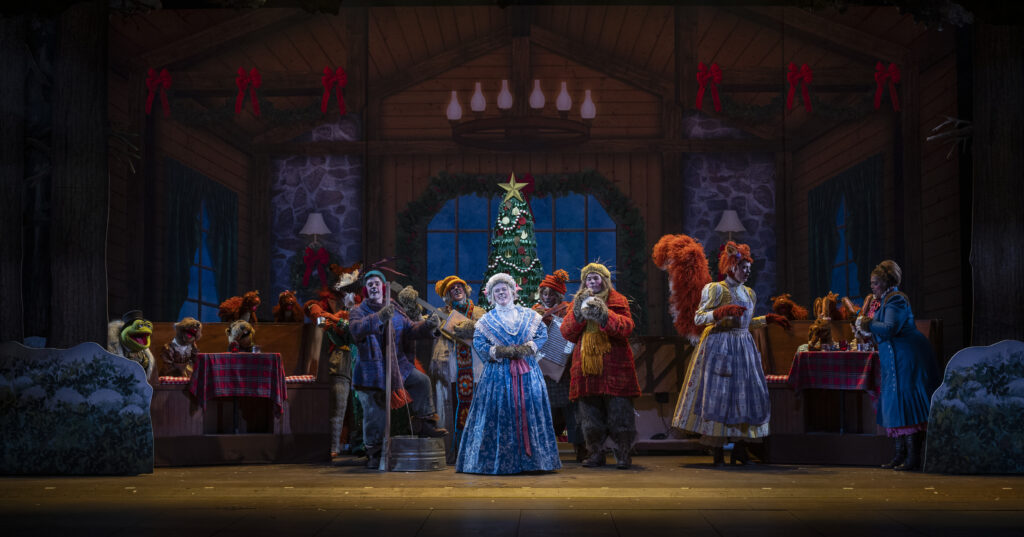
Studebaker Theater through December 31
Highly Recommended
Give yourself and your family a Christmas gift of a lovely 75 minutes of theater magic. Jim Henson’s Emmet Otter’s Jug-Band Christmas is one of those holiday shows that deserves to become a classic because of its sweet-hearted humor, heartwarming message, excellent acting and acrobatics by both humans and puppets.
The puppets almost steal the show, no surprise since they are Jim Henson’s, who is most famous for his puppet population of Sesame Street and his marvelous Muppets movies. Like those movies, and like the best children’s theater, this musical has something for everyone, which is to say that adults will be as charmed and laugh as hard as children. The adorable squirrels soared away with many audience members’ hearts during their flying lesson and their riotous efforts to grow trees in a winter wonderland.
The cast, studded with Broadway stars, impressed the two young ladies who accompanied me. They were most delighted by Madame Squirrel, played by Sawyer Smith with an athleticism that veered between cartwheels and maternal protectiveness in a manner both familiar but far more nimble than many of us can manage. Kathleen Elizabeth Montelione offered a calmer, sweet-voiced portrait of motherhood as Ma Otter, and Andy Mientus was her earnest and loving son Emmet Otter. Kevin Covert was an appropriately sly Mayor Fox, more than a bit slimy despite his mammalian rather than reptilian classification, and delivered an exemplary mix of irritation and arrogance as the emcee of the contest that is central to the show.
Anna Louizos’ woodsy set is so charming that it could be a series of adorable Christmas ornaments craved by anyone with a tree. Gregg Barnes cheery and colorful costumes pop with fun details that add to the show’s Christmas spirit.
Henson’s reputation will draw some. The music of award-winning Lyricist and Composer Paul Williams will attract others. Devotees of beloved children’s Author Russell and Illustrator Lillian Hoban will come to see the stage adaptation of their book, which also inspired the Emmet Otter TV show, another following. Not to worry though, you don’t need to know an of those artists or their works to enjoy Jim Henson’s Emmet Otter’s Jug-Band Christmas. And don’t fret if you can’t make the show before Christmas because it’s a great way to end the year but do catch it before it closes on December 31st.
The Lifespan of a Fact

TimeLine Theatre Company through December 23
Recommended
The notion of a different generation of journalist who looked at the world with sharp-eyed skepticism is at the heart of TimeLine’s current show. As provocative as it is, the question of an opinion piece versus a news story or investigative report is never fully made clear. In my 30-plus years practicing journalism, this division got harder and harder to see, partly because the world of journalism leaned ever further into the world of entertainment. I knew it was time to leave public radio when National Public Radio renamed the “Culture Desk” the “Entertainment Desk.” For me the brilliant Mike Royko, despite being trained as an “objective” journalist, was a columnist and therefore free to express his opinions even though they were occasionally benighted.
Such critical distinctions are central to The Lifespan of a Fact. Respected Journalist John D’Agata has written a profile on a young Las Vegas suicide that is also a contemplation on Las Vegas for the estimable Harper’s magazine. Its editor gives the fact-checking responsibilities to an eager intern who starts to find many factual errors in the piece. A three-way battle of wits and facts ensues.
It is a joy to see TimeLine Artistic Director P. J. Powers and Founding Company Member Juliet Hart back on stage because both are exemplary actors. Powers plays the journalist with a swagger made famous by such star writers as Truman Capote and Normal Mailer, and practiced by many white male journalists with less public profiles. Hart is Emily Penrose, the hard-as-nails woman editor who can handle the male journalism world. They spar with the younger intern Jim Fingal, impressively portrayed by Alex Benito Rodriguez impressive.
You’ll need to see the show yourself to see how matter of genre, truth and ethics are resolved. Whether you agree with the outcome or not, I promise you will leave TimeLine with lots to talk about.
Witch

The Artistic Home through December 3
Recommended
What would it take for you to sell your soul to the Devil? Over the centuries many have grappled with this Jacobean storyline but the question seems relevant today in a world overwhelmed by multiple forces of evil.
The Artistic Home offers a Feminist rethinking of the classic deal-with-the-Devil tale that brings an age-old story to a modern audience while adding some engaging intellectual and moral twists. Playwright Jen Silverman’s devil has all the necessary charm but he meets his match in a woman labeled a witch by her small village.
“There’s a very powerful strain of cynicism that has slowly infected us since this play first premiered,” says Director Devon Carson in his program note, “2023 feels like the putrid, liquescent corpse of 2018. And if we’ve learned anything in the last five years, it’s that soulless individuals do pretty well for themselves. I love that this play isn’t a cure for our collective infection, it’s a game of chicken.”
Indeed it is. Two of the actors are at the top of that game — Kristin Collins as the skeptical and plainspoken Elizabeth Sawyer, the aforementioned witch, and Julian Hester as the sexy and handsome Scratch, better known as the Devil. Their contest of wills alternates between erotic moments that stop short of sexual engagement and intellectual arguments about what a soul is worth and whether any of us can hold onto hope in this wretched world. In this pay named for her, this is one witch who can hold her own against a devilish force of evil. Also excellent in his portrayal of a man willing to make any deal with any devil for financial gain is Ernest Henton.
Kevin Hagan’s period set has the ideal gloom and abundance with its centerpiece of a feast worthy of Bacchus. The costumes are also period-perfect, bowing to Jacobean styles, but it is Silverman’s contemporary language that allows this production to bridge the gap between ancient and modern with some necessary humor to leaven the load. It is also the central questions her play pose: “What is the value of a soul” & “Is hope possible?” – two incredibly important questions in this political moment. Seize that moment and see this play for a modern take on an age-old but persistent dilemma.
The Lehman Trilogy

Photo by Liz Lauren.
TimeLine Theatre Company, Broadway Playhouse, Broadway in Chicago through November 26
Highly Recommended
It’s almost impossible not to be impressed by the sheer talent of the trio of fine actors who keep sold-out houses engaged for three hours and 20 minutes as they chronicle the beginning of the House of Lehman, better known as Lehman Brothers, Inc., which filed for bankruptcy in 2008. Three fine Chicago actors, Mitchell J. Fain, Anish Jethmalani and Joey Slotnick, take us from the arrival of the first Lehman, the son of a Jewish cattle merchant, on these shores through 160 years of Lehman history.
Their story begins in 1844 with the arrival of Henry who locates in Montgomery, Alabama and starts a dry goods store specializing in cotton through the building of a global financial services empire, eventually the fourth US largest investment bank. Henry and his two brothers quickly figure out that cotton, provided with free slave labor is the way to build their empire. As these three actors play generations of Lehmans to come, we see that unsavory, even despicable but clearly successful business acumen repeated by the family members who head and counsel the company. It is a capitalist cautionary tale, a dream or nightmare, depending one’s perspective. It is also the classic happy American immigrant story, one in which people from other countries arrive on these shores and assimilate, in this case on the backs of slaves, which should be particularly poignant for Jews. The tension in this play is one between the professional genius of the Lehman clan and the unethical measures and personal demons they must overcome to ensure their ever-growing success.
Perhaps it took a perspective from other shores to tell this multi-generational story. Italian Playwright Stefano Massini wrote The Lehman Trilogy, and it was adapted by British Playwright Ben Power. It was a London hit before heading for Broadway. The Chicago production offers more collaboration. It is a production by the esteemed TimeLine Theatre Company, skillfully co-directed by TimeLine veteran Nick Bowling and Vanessa Stalling, and featuring top Chicago actors including Timeline Company member Jethmalani, Slotnick, a Lookingglass Theatre Company ensemble member and Fain, whose graced many Chicago stages. This team collaborated with Broadway in Chicago and the buzz that started in Britain continues here.
You still have two weeks to catch this chronicle of capitalism that offers insight into one sort of American immigrant experience, along with some examples of how to success in business and life, as well as some warnings about what not to do. The more than three hours will fly by as you are drawn into the stories and dramas of the Lehmans.
Sanctuary City
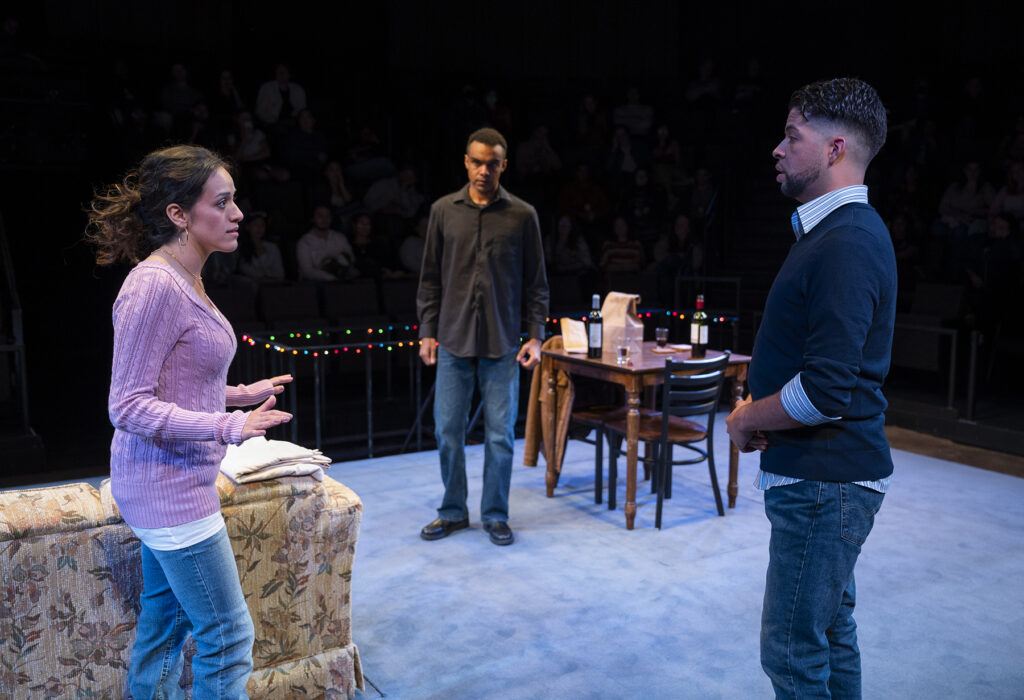
Steppenwolf Theatre Company through November 18
Recommended
Sanctuary City, which addresses some of the obstacles and challenges with which our own sanctuary city is currently struggling, is the first play from Steppenwolf Theatre Company’s celebrated Young Adult series to go on the main stage. That’s significant because Steppenwolf’s YA series is known to offer some fine work over the years. Playwright Martyna Majok, a Pulitzer-Prize winner and a University of Chicago undergraduate, herself immigrated from Poland as a child and her script, along with the directorial guidance of Steph Paul, manage to convey the mix of hope, fear, struggle, support and adolescence.
What intrigued, and continues to intrigue me about this piece, is how it is really two plays or, to be precise, a story of two Newark teenagers brought to America as children who meet again as young adults under very different circumstances. The first two thirds of the play are starkly presented, often with the two, Grant Kennedy Lewis as “B” and Jocelyn Zamudio as “G,” meeting under cover of night, spotlighted on the stage in staccato scenes with clipped, limited dialog reminiscent of the way teenagers talk to adults when they do not wish to be engaged in conversation. What ties these scenes together is the way in which these two young people offer sanctuary to each other as they talk about their desperate desires to pursue their American dreams even while they know the many obstacles that may prevent that. There is an aura of fear, uncertainty and the very real possibility of the loss of their parents to the unfairness of a country that is supposed to be a melting pot, a place that only theoretically opens its arms to immigrants. This part does run a bit long and might be more effective at a shorter length.
By the final third of the play, circumstances have changed radically and a third character — Henry played with ideal passion by Brandon Rivera — is now part of the drama. To reveal the plot in this section would be to spoil the play but suffice it to say that much of what audience members presumed from the first two-thirds of the play is turned around. This vast difference between the parts of the play seems to divide audiences. My theater-going friends and I have had a number of discussions with other theatergoers who like one part or the other. At first the divide appeared generational, with those closer to adolescence preferring the teenage first part while those more familiar with the often-complex and ever-changing politics of love and the world liking the last third of the play. In fact, people often liked one part and actively disliked the other part. Of course, there are outliers to any theory but what is clear is that this is a piece that divides audiences and provokes conversation rather than getting stuck in the “flavor-of-the-month” box. For that reason alone, you might want to check out Sanctuary City to see if it changes your thoughts on Chicago’s status and state as a sanctuary city.
This Bitter Earth

Fleetwood-Jourdain Theatre through November 12
Highly Recommended
A rich, layered and moving portrait of a biracial couple for whom love conquers opposing political views, class and race tensions and starkly different personalities is onstage at Fleetwood-Jourdain Theatre. It is a show not to be missed.
This Bitter Earth by Harrison David Rivers, a St. Paul, Minnesota-based playwright, impressively tackles activism, privilege, gayness, blackness with depth, sensitivity and humor in his richly layered love story.
This striking play is ideally directed by Fleetwood-Jourdain Artistic Director Tim Rhoze, and perfectly realized by a two-person cast. Matthew Lolar-Johnson plays Jesse, a thoughtful Black playwright who is very private about his work, with a fine array of introspective asides and romantic moments that create a lovely mix of intellect, sass and rage. One of his best humorous moments is his tirade about the saying, “There are no dumb questions.” It culminates in Jesse’s prediction that teachers who say this will live forever and should be dragged behind a car. Only in a play in which love between a couple has reached an authentic comfort level could such words be uttered. Tiemen Godwaldt is Neil, Jesse’s white beloved. He is also a Black Lives Matter activist whose roots are in East Coast privileged wealth.
These two flirt, cuddle and grapple over politics as they come to terms with who they are and test the limits of their love. Neil thinks Jesse is too apathetic but a revelatory moment comes with Jesse’s recounting of his dream that features a parade of Black literary and other luminaries, a list of Black artistic excellence and genius that dazzles. It is a splendid moment that shows a different, but equally important, face of activism. “We need to speak out,” says Neil later, noting that he is not limiting activism to those who are injured. “We need the allies.”
This gripping and amusing back-and-forth, peppered with moments of great warmth and affection, plays out on a spectacularly artistic yet political set. Sarah Kaiser-Amaral’s large black mural bursting with colorful figures, items and sayings, and inspired by the Artist Jean-Michel Basquiat, surrounds the actors as they move between empty picture frames that allow them to be together or separate as the moment dictates.
This Bitter Earth is a realistic love story, one that lets us see how much homophobia, racism, hatred, ignorance, right-wing extremism, and all the other isms that intrude on the lives we live can distort reality and ruin lives, not to mention the love that we are capable of having for each other. Fortunately, This Bitter Earth is ultimately a love story. Even with all its political debates, the message of this play that love can conquer all is supreme. It is a message that we must not lose sight of, one that should speak to all of us and unite us.
Seize the opportunity to witness this optimism and be part of this love before This Bitter Earth closes. You will come away moved and improved, perhaps even hopeful as you smile about what you have witnessed.
The Nacirema Society Requests the Honor of Your Presence at a Celebration of Their First One Hundred Years
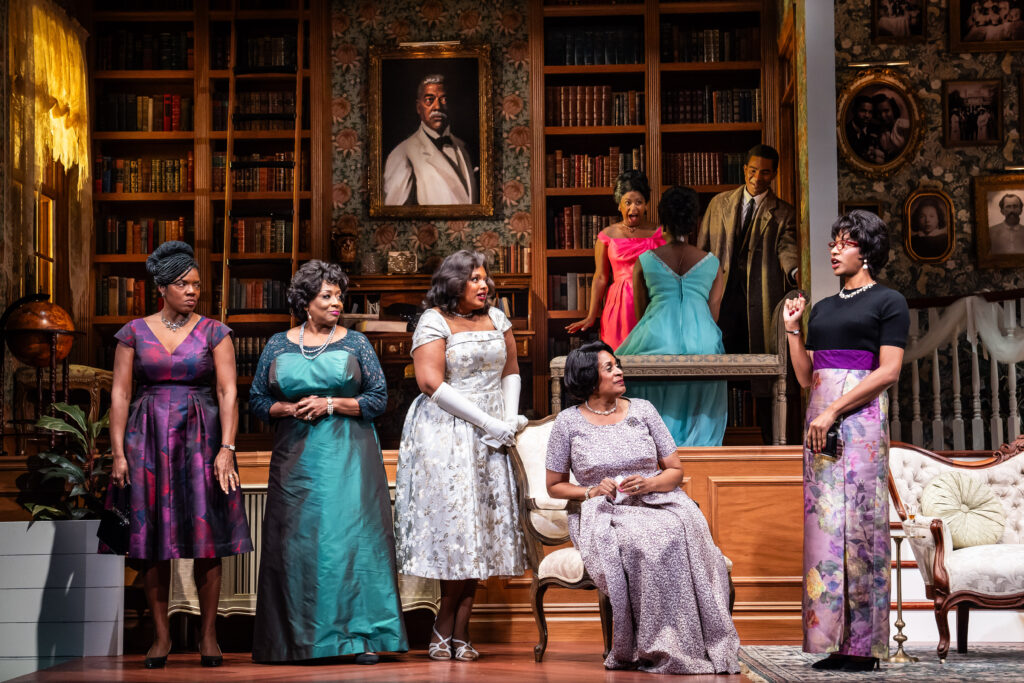
Goodman Theatre through October 22
Highly recommended
It’s hard to imagine a more deliciously wicked play that will have you laughing even as it tackles issues of gender, race and class with the snappiness, sensitivity and candor one expects from Playwright Pearl Cleage so accept the invitation from the members of The Nacirema Society and enjoy the antics of some of the most talented Black actors now working in Chicago.
The women are a particular triumph in Director Lili-Anne Brown’s cast, and she encourages them to not hold back. E. Faye Butler is the divine doyenne Grace Dubose Dunbar, an elegant black matron with uncontrollable control-freak tendencies, and a drive to always be top star in any firmament of Black achievement. She is clearly in charge of The Nacirema Society, a social club for wealthy African American women, in every possible way. Ora Jones shows, once again, her incredible range at a incredible variety of characters over her decades on Chicago stages. Here she is Catherine Adams Green, the somewhat ditzy best friend of Mrs. Dunbar, who is also invested in maintaining Nacirema standards in 1964 Montgonery, Alabama. The two are plotting to have Mrs. Green’s son marry Mrs. Dunbar’s granddaughter. Demetra Dee,excellent in younger roles at major theaters, is Gracia Dunbar, a spunky college-bound granddaughter with a mind of her own, and a desire to be a writer. She has no intention of marrying her childhood friend, Bobby Green, played charmingly by Eric Gerard, who did a brilliant comic turn in Court Theatre’s Arsenic and Old Lace, nor he her since he is in love with another in this romantic comedy. His lovebug is Lillie Campbell Jackson (played with passion by understudy Aja Singletary in the performance I saw), who turns out to have a surprising connection to the Dunbars that I will not spoil for those of you who want the full funny experience.
Three other women are essential to this drama. Tyla Abercrumbie, long a star on the stages of Chicago’s best theaters, and now equally respected as a playwright – last season her Relentless, earned the Jeff for best new play after its sold-out TimeLine run was remounted by the Goodman – is Alpha Campbell Jackson, a woman not of Montgomery’s upper echelon who challenges the divine doyenne with a demand. Her necessarily strong and sharp working-class presence is matched by the mostly silent counterpart of the Dunbar’s maid, Jessie Roberts, brilliantly played by Shariba W. Rivers, who says more with her face and body than many denizens of dramatic enterprises. It’s no small irony that Rivers portrayed an actress playing a maid in TimeLine’s Trouble in Mind last season. Into this volatile mix comes Janet Logan, a New York Times reporter who is idolized by the Dunbar granddaughter and is bent on correcting a previous story on The Nacirema Society – or perhaps getting the real story. The role is usually played by Jaye Ladymore, the Relentless lead, but was played with journalistic snap by understudy Diana Coates the evening I attended.
It’s been a joy to watch these actors on stages around Chicago, but it is an extreme and delicious pleasure to see them gathered for this deeper-than-you-thought piece that challenges class and gender stereotypes at the beginning of the Civil Rights Movement. Their interactions take place on Arnel Sancianco’s set, which achieves Goodman’s usual stratospheric standards from its double level living room, front hall and library of the Dunbars and the much less elegant kitchen of the Dunbar’s late maid that rises from the stage as a reminder of class difference. Samantha Jones’ costumes are period-perfect and great fun to watch.
This is a trip back in time that is worth every inflated penny of the ticket. Aside from a rollicking evening of amusement delivered by some of Chicago’s finest actors, you will find yourself marveling at how much has changed – and how much hasn’t – since 1964. Don’t hesitate to accept the invitation to celebrate The Nacirema Society’s first one hundred years!
A View from the Bridge
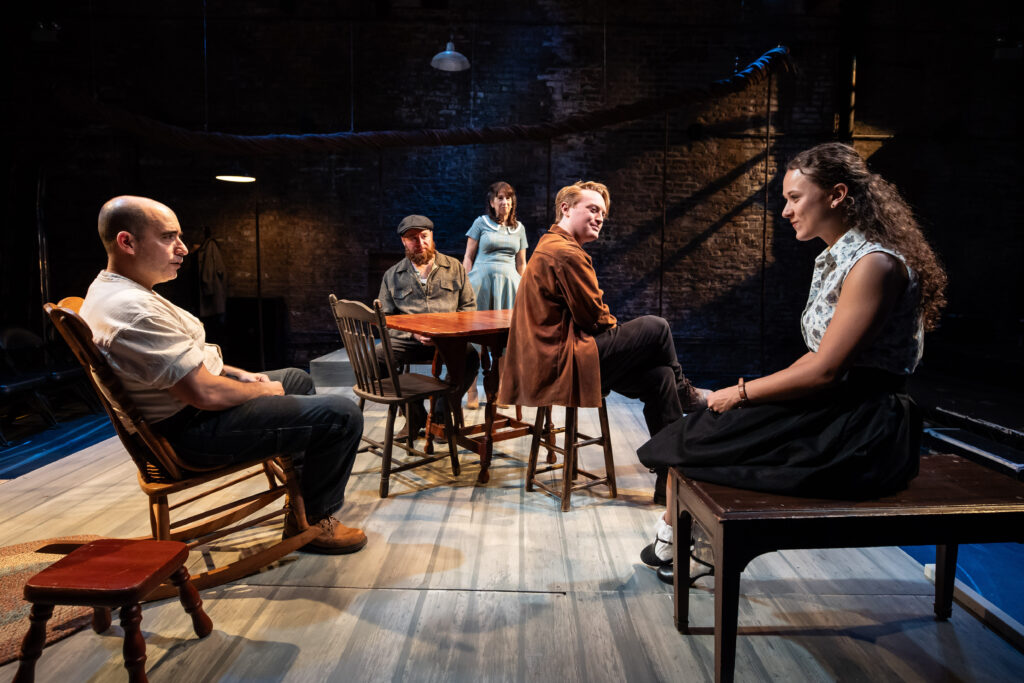
Shattered Globe Theatre through October 22
Highly Recommended
At a time when we are struggling to understand how we really feel about immigration, Shattered Globe offers us an historic perspective with its revival of Arthur Miller’s classic A View from the Bridge.
Written in the 1950s, at a time when Southern Italians were fleeing poverty only to encounter prejudice in America, Miller’s play is often remounted on stage and in film, and always seems to have something new to say.
Louis Contey directed the company’s last production of A View from the Bridge in 1993, when this country was experiencing an increase in Central and South American, as well as Asian immigrants, returns with his searing vision of this story for our time. What we get is Miller’s layered examination of assimilation in Brooklyn’s Red Hook working-class community of new and recent Italian immigrants. At the top of the ladder of assimilation is Alfieri, a lawyer who, while professional and educated, is an honest observer, our narrator and bridge with a clear-eyed view of the Italians of Red Hook. John Judd is all grace and insight in this role, so cooly brilliant that I realized how much I’ve missed his always sure and moving presence on Chicago stages, including his splendid turn as the tortured father in Court Theatre’s fine 2018 production of Miller’s All My Sons.
The next rung of the assimilation ladder is a family of three, now adjusted to working-class life on the docks. Eddie, played with the right mix of confidence and rage by Scott Aiello, works as a longshoreman. Eileen Niccolai is his wife Beatrice, in a reprisal of her role from Shattered Globe’s last production that has the right flash and deftness of someone who knows this housewife’s many obstacles and desires. Their family is completed by a beautiful niece, who came to live with them when Beatrice’s sister died. Isabelle Muthiah is a joy to watch as she navigates her little-girl love for her uncle, her desire to please him and her aunt and her need to grow into a woman.
At the bottom of the ladder, are Bea’s cousins, brothers who come illegally in the middle of the night, escaping the poverty and joblessness of their scenic Italian town. Marco, who is older, is played perfectly by Mike Cherry as a man of quiet strength and determination who wants to work a couple years to make enough to keep his children and wife alive. Rodolpho, the younger brother, is a blonde, the object of scorn and desire among the dark-haired southerners. Harrison Weger nicely captures the younger man’s dreams of becoming a singer and an American.
A View from the Bridge is not only about the immigrant experience. It is about lust in the epic Greek tragedy tradition. Eddie’s uncle’s improper affection for his niece is hard to watch. His rage at the love blossoming between his beloved niece and the blonde newcomer is palpable, bursting off the small set of their home as he attempts to break up the relationship by any means necessary, including accusing Rodolpho of being a homosexual. True to Greek tradition, Cassandra, the truthteller in the form of Beatrice, reveals her husband’s obsession for what it is, and the heartbreaking story builds to an ugly confrontation involving honor.
While many recent plays about immigration and immigrants tell us their stories or try to get at what we feel about immigration at a given moment, A View from the Bridge examines the inside of the immigration experience, offering a compelling interior view of one family and its struggles as it bridges the move from immigrant to American. It is a story that speaks across generations, countries and centuries. It is a view you will not want to miss.
Blues for an Alabama Sky
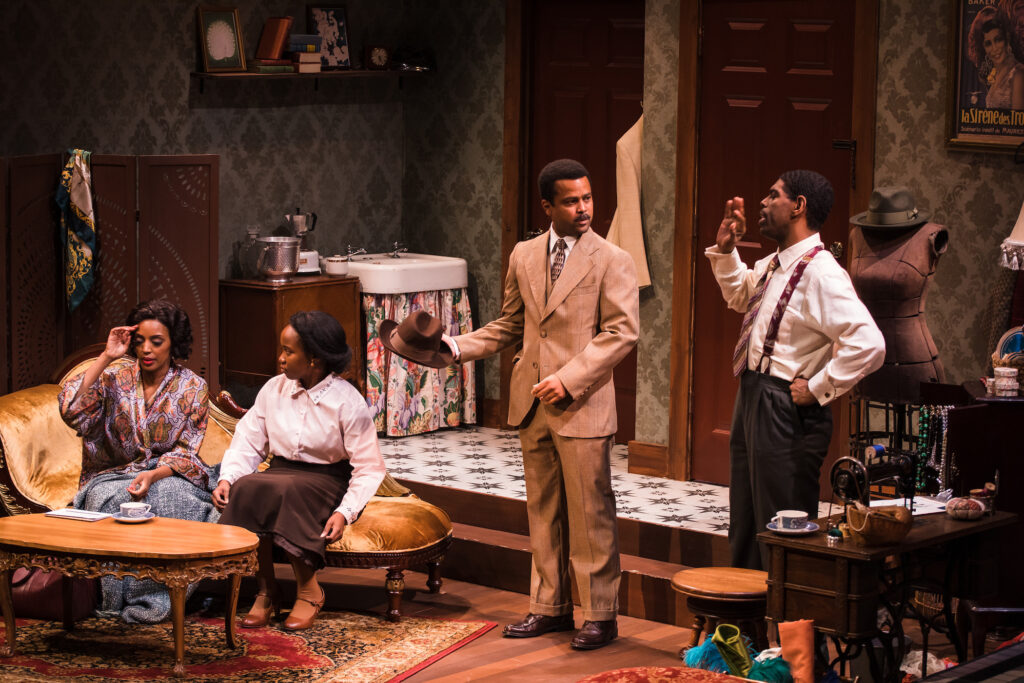
Remy Bumppo through October 15
Highly Recommended
We tend to focus on the artistic talents and intellectual power that characterized the Harlem Renaissance, and while I am of the mind that one can never hear enough about Black Excellence of any era, it is revealing/refreshing/enlightening to encounter the far more varied cast of characters who inhabit Blues for an Alabama Sky. This play is first in a city-wide celebration of Pearl Cleage, a prolific Atlanta-based writer who has written more than 30 plays, as well as novels, poems and essays. However, her plays have not often graced Chicago stages. Given Cleage’s remarkable artistic range, and her talent for exploring Black lives across centuries and class, this is astonishing.
Set in Depression-era Harlem, Blues for an Alabama Sky opens with jazz singer Angel, played by Tiffany Renee Johnson with tragic drama befitting a would-be diva, getting fired from the famous Cotton Club. As has been her pattern and her luck, she will be supported in every way by her friends. Primary among them is Guy, an openly gay clothing designer who dreams of life in Paris designing for Josephine Baker. Breon Arzell plays the larger-than-life dreamer and delivers many of the funniest lines in the fast-moving snappy dialog. Their warm duo is often joined by Delia, a thoughtful turn full of grace in the gentle but committed hands of Jazzlyn Luckett Aderele, who works with Birth Control Activist Margaret Sanger to bring family planning centers to Harlem, and Sam, a compelling portrayal by Edgar Sanchez of a respected doctor despite his penchant for hardcore partying who undergoes some changes.
The presence of the powerful and famous runs throughout Blues for an Alabama Sky from Baker to Sanger to Adam Clayton Powell whose Abyssinian Baptist Church was a leading force in Harlem history. A stark contrast to these diverse four arrives in the form of Leland, a conservative rural Alabaman new to Harlem who is instantly smitten with Angel. With his low-key steadfast insistence on his ways, Ajax Dontavius captures the conservatism of a country man encountering the big city, particularly Harlem, that many in the early waves of The Great Migration must have experienced.
Like much of Cleage’s work, issues of racism and sexism, and the double burden Black women bear, are central to Blues for an Alabama Sky. Johnson’s Angel and Aderele’s Delia offer particularly moving words and insights into two very different ways of being a woman. The three men also offer their interpretations of what women should be from Guy’s adoration of the glamorous Josephine Baker, who escaped America’s racism and found fame in France, to Sam’s support of women struggling to avoid unwanted pregnancies to Leland’s push for a traditional obedient wife. What emerges, and takes your heart, among all the snappy lines and laughs, is the relationship between Delia and Sam, both of whom are committed to change and serving their communities.
A Taste of Soul
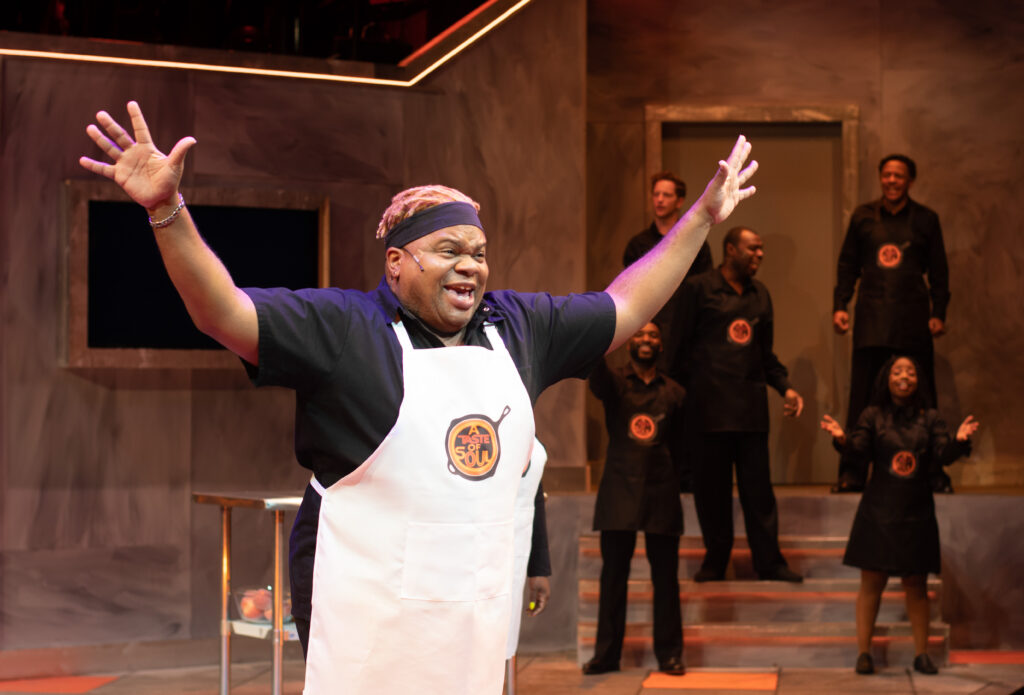
Black Ensemble Theater through October 29
Highly Recommended
Spend a joyous clapping-and-toe-tapping couple hours being served soulful hits in Black Ensemble Theater’s latest from Playwright and Director Daryl D. Brooks. What makes this show so much fun is its premise that the audience is at a live show taping, enjoying a multi-course meal of sweet and savory soul hits prepared by a charming pair of singing chefs who share their mouth-watering recipes and season the show with the usual amazing Black Ensemble talent coming from nine sous chefs with songs to sing and stories to tell.
Our Head Chef hosts, the wickedly skeptical Thee Ricky Harris and the good-natured Quiana McNary, spice things up with their introductions and, in the case of Harris, knowing and irreverent facial expressions and comments. One tasty treat is that many of the songs sung by the actors portraying such superstars as Aretha Franklin, Sam Cooke, Marvin Gaye and Al Green aren’t always their best-know hits, which adds icing on their famous cakes. Standout performances come from McNary as Aretha Franklin with the right mix of elegance and passion, Harris in an appropriately over-the-top version of Little Richard’s “Tutti Frutti,” Britt Edwards, who captures the sexy intensity of Tina Turner and Makenzy Jenkins who channels the sultry Al Green in his classic “Let’s Stay Together.” A host of other singers are celebrated here too offering tasty tidbits in this extended musical meal that includes blues, jazz and some soulful white artists.
This show makes excellent use of technology to display soul stars’ photos and recipes. The set complements this repast with its pair of chefs’ tables in front of a huge oven that sometimes serves as a smokey stage door for the singers. Come hungry to this feast that will leave you full of fine soul.
Cat’s Cradle

Lifeline Theatre through October 22
Highly Recommended
Lifeline Theatre’s wacky, laugh-out-loud adaptation of Kurt Vonnegut’s iconic novel captures its essence, navigating the supreme horrors and ironies of World War II as well as the fears and idiocies of the post-war era, a time when so many of us were unable to disconnect from the staggering reality of nuclear warfare. It’s a sober subject, an angst that remains for families that were forever altered by that war and its aftermath. And yet John Hildreth’s spot-on adaptation deftly honors Vonnegut’s hallmark mix of humor and horror, parody and tragedy, sarcasm and profound human connections. It’s almost as if he and the large cast that bursts with talent under the able direction of Heather Currie have grabbed a line from Cat’s Cradle – “Eat, drink, and be merry, for tomorrow we die.” – as their leitmotif and let it animate each moment of this play.
Everyone on stage struts their dramatic stuff, reminding us of what this theater company can do when it is at its best. That includes employing artists who can adapt literature, as well as direct and act in those adaptations. Lifeline Artistic Ensemble members Currie, Patrick Blashill and Anthony Kayer, playing two of the most amusing scientists ever to grace a stage, are joined by Lifeline regulars Shelby Lynn Bias, Shea Lee and Mandy Walsh. Newcomers Tony Bozzuto, the journalist/narrator who easily goes from dopey to intense, Vic Kuligoski, Jocelyn Maher and Johnard Washington, as the charismatic cult leader, steal many scenes. The cast uniformly shimmers with energy and wit, easily morphing between multiple roles. The actors’ zeal is enhanced by pitch-perfect costumes that embrace the spirit of this show and of Vonnegut’s sardonic humor. It’s almost as if Aly Amidei employed “whimsy” and humor as mantras in her sartorial selection process.
Don’t miss this delightful but deep kickoff of Lifeline’s & Chicago’s Fall season. You don’t have to be a Vonnegut fan to enjoy this one but it may inspire you to read Cat’s Cradle again. I promise you’ll laugh and cry at the stage and page versions of his classic story.
Birthday Candles
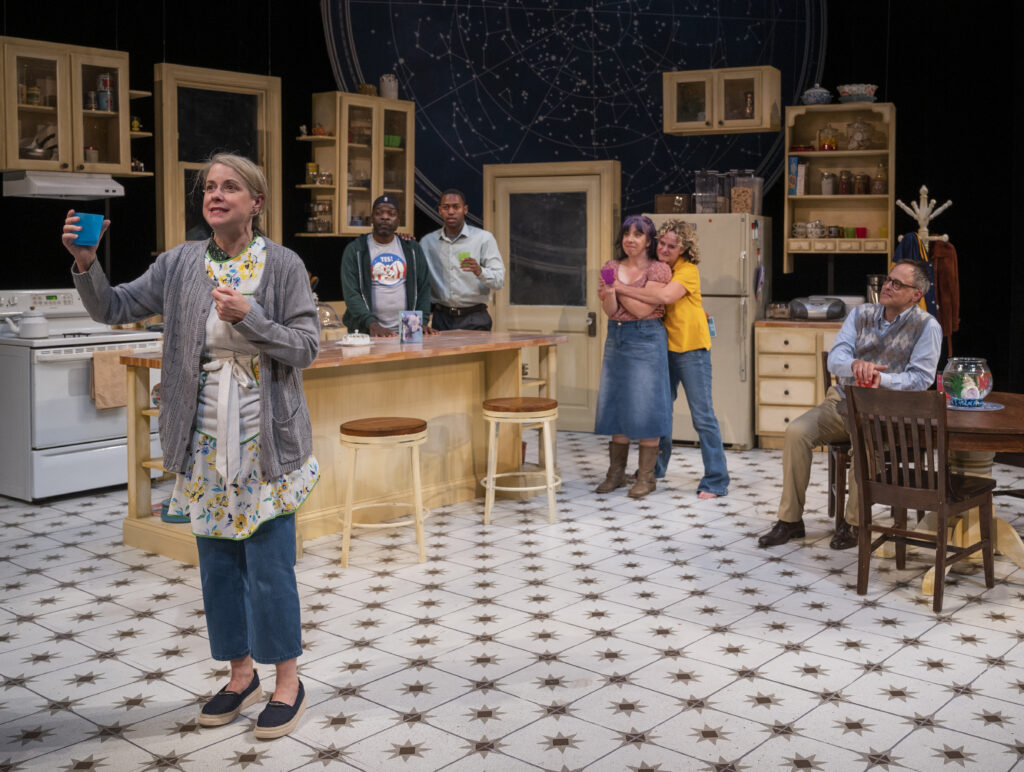
Blakewell, Timothy Edward Kane. Photo by Michael Brosilow
Northlight Theatre through October 8
Highly Recommended
Birthday Candles is the sort of art that wraps its arms around you and finds a home in your heart, bringing moments of joy and sorrow with the memories of its beauty and profundity. Noah Haidle’s play, now in a luminescent production at Northlight Theatre, is both epic and intimate. Its moments of family magic range from profoundly wise to laugh-out-loud funny as it moves from moments of revealing beauty and quirky individuality to the most ordinary ones of our shared lives. There is a stunning beauty in these interactions. The result is an intensely perceptive and passionate piece about humans, and how we cope with love, life and death.
No small subjects these but Director Jessica Thebus, a considerable talent, gives an added glow by sharing her connection to Birthday Candles because of the recent death of her mother, Mary Ann Thebus, a radiant presence on Chicago stages for decades. No doubt their closeness and shared life in the theater increases the warmth and grace of this Chicago premiere, and brings out the best in her stellar acting corps.
Color-blind casting deepens the universality of this story. Four of the six actors morph between different roles from the same family, playing successive generations, which adds the marvelous quality of families looking alike from parents to children. The show belongs to Kate Fry, a splendid Chicago actor who plays Earnestine Ashworth. We first meet her when she is 17 and watching her mother make her special birthday cake. In the full heat of passionate adolescence, Earnestine is declaring her desire to be different. That cake anchors the play, and we travel with her through the highlights and heartbreaking moments of the next 84 years marked by her annual preparation of her mother’s cake. Fry animates her journey through marriages, motherhood, love and grief with her usual perceptive and deft genius. She plays opposite her true-life husband, the always impressive Timothy Edward Kane, who carries a torch for Earnestine from their childhood.
The other four actors, Cyd Blakewell, Samuel B. Jackson, Chiké Johnson and Corrbette Pasko, more than hold their own. Jackson is especially engaging as Earnestine’s son, growing into manhood and standing by his plainspoken and neurotic wife, portrayed with charming bluntness by Pasko. Sotirios Livaditis’ set with its starry floor in the bright quaint kitchen surrounded by the stars of our velvet blue solar system complements the script and showcases the actors, as does JR Lederle’s lighting design.
Birthday Candles is a holistic experience, an event that is not to be missed if you want to experience, understand and delight in the large and small moments of life and love. I’ve been devoted to Chicago since 1964, and seen some exquisite shows over the years, but this is one that still stands alone. It continues to hold me in its tight embrace, and I hope it never lets me go. Do yourself a favor and drop everything you are doing; find someone you love and go see Birthday Candles.
Personality: The Lloyd Price Musical
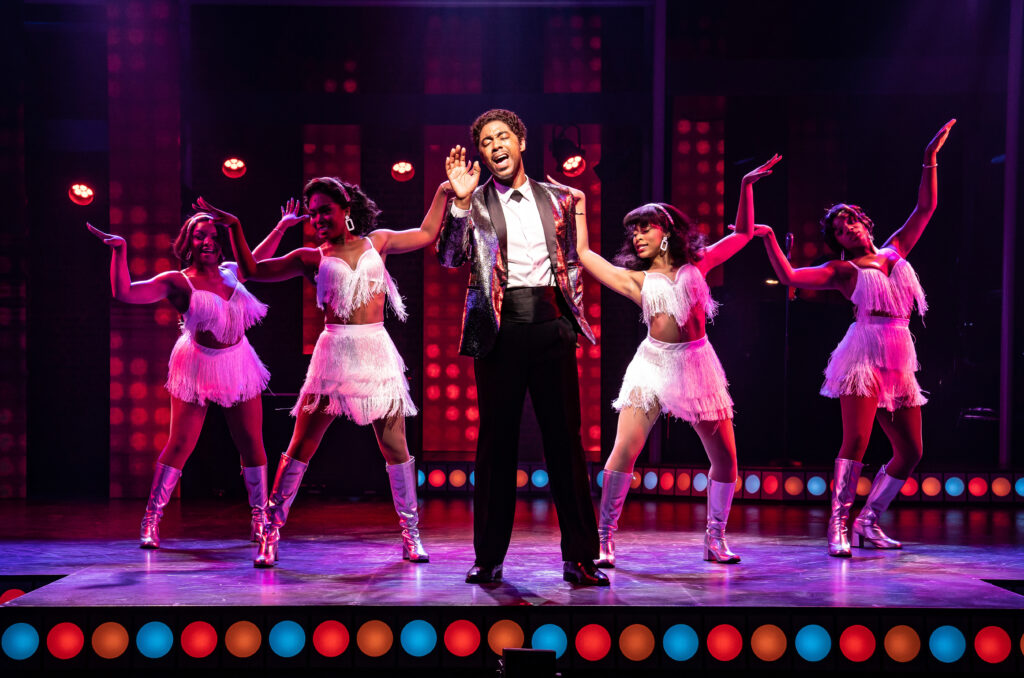
Studebaker Theater through July 30
Highly Recommended
Delight in many joyful noises as you meet a man you will want to know more about – Lloyd Price. You may know his early hit, the 1952 “Lawdy Miss Clawdy” that made him the first teenager to sell more than a million records, earning him a Gold Record. You might recall his later hits, “Stagger Lee,” “I’m Gonna Get Married” and “Personality.” But as you dance along to this musical’s exuberant renditions of those songs, you will meet a man who is so much more than you thought.
A Louisiana native, Price had a life full of successes and firsts. “Lawdy Miss Clawdy” made him a crossover artist who appealed to Blacks and whites. The Rock and Roll Hall of Famer was the first Black man to open a New York nightclub just below Harlem. Price was the first recording artist of any race to create his own record label. His irrepressible entrepreneurial spirit led to his manage singers, promote Muhammad Ali’s boxing matches, dip into real estate and even venture into the food business. “Mr. Personality” was an early champion of Little Richard, and claimed to put Sam Cooke on the map by suggesting he give up the gospel sound and replace Jesus with “Darling” in “You Send Me.” That moment alone is worth the price of admission. Predictably Price’s accomplishments happened despite the relentless racism he faced throughout his career.
The beauty of Personality: The Lloyd Price Musical is that it tells these stories with passion, excellent acting, snappy dancing and, of course, fabulous singing. Saint Aubyn gives us an engaging Lloyd Price full of affable charm but far from blind to the limitations his race imposes. Darian Peer is a sweet and naïve youthful Price, the country boy with a big and beautiful voice. Stanley Wayne Mathis is solid as Price’s long-time partner, loyal friend and protector who has a bit too much going on on the side but comes across as valorous nonetheless. Miles Boone delivers the perfect-over-the-top Little Richard with his rendition of “Tutti Frutii” that surely has Little Richard rockin n’ rollin in his grave.
Even as it hits all the right notes with its professional acting, singing, choreography, sets and costumes, at its heart this show is just plain fun. What better way to spend a summer evening? You still have 11 more chances to see Personality: The Lloyd Price Musical before it closes July 30 Make sure you spend an evening with this talented crew.
2022 Raves
Blue Heaven
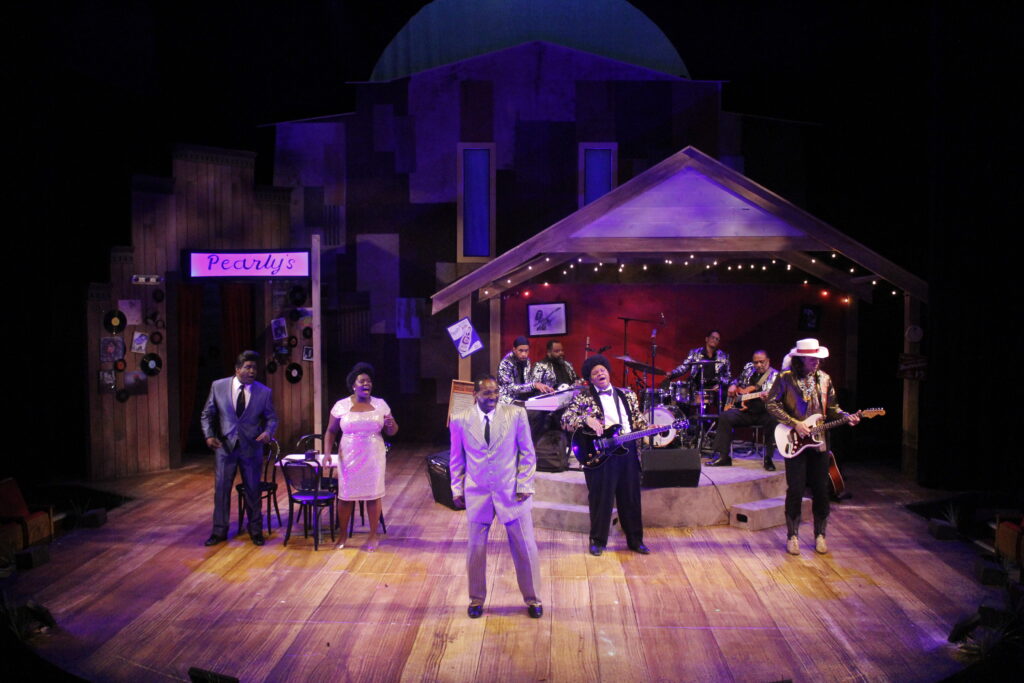
Black Ensemble Theater through November 27
Highly Recommended
Give thanks for the blues by taking in the new show at Black Ensemble Theater before it closes on Sunday. In a charming conceit, BET Producing Managing Director Daryl D. Brooks, who also directs this play, takes his audience past the pearly gates for performances by some of the great blues artists. This means audience members are treated to the usual high level of Black ensemble singing and music but Brooks’ storyline is stronger than some BET past plays, and the music is heavenly.
The premise is that each singer/musician wanders into Pearly’s for some songs and stories and to welcome the newest member of the celestial blues choir. First comes Chester Arthur Burnett, better known as Howlin’ Wolf, played with calm elegance by Lyle Miller, a BET regular who’s appeared in more than 50 productions. He’s joined by Willie Mae “Big Mama” Thornton, portrayed with no-nonsense spunk by Miciah Lathan. Next to the party is McKinley Morganfield, AKA Muddy Waters, played by Dwight Neal, a 20-year BET veteran who starred as Muddy Waters in the theater’s Howling at the Moon. The three swap stories and songs before Stevie Ray Vaughan shows up, convincingly portrayed by Billy Rude. As the blues stars share memories and war stories, the theme of the play begins to emerge. Each has had to pass through a ritual of forgiving themselves for one of their earthly transgressions. By the time Riley B. King AKA B.B. King shows up, a nice mix of cheer and confusion from Aaron Reese Boseman, they are ready to guide him.
Every member of this cast is appropriately stellar in both singing and playing, and the four-piece band led by Adam Sherrod, casts much celestial light as it takes them through 24 blues classics, including “I ain’t got nobody,” “Hound Dog,” “Ball and Chain,” “Hoochie Coochie Man” and “The Thrill Is Gone.” Between the songs are stories of how whites took this music and made money on it, and the many challenges Black performers and artists faced. There are homages to blues singers of the past, like Bessie Smith and Ma Rainey and the music scene – and all of this in a mere 90 minutes.
You still have a few days to catch Blue Heaven. What a lovely way to celebrate this classic American African-American music that started in the South and is now beloved around the world!
Measure for Measure

Photo by Liz Lauren
Chicago Shakespeare Theater through November 27
Highly Recommended
Measure for Measure, now in a condensed but arresting and revealing production at Chicago Shakespeare Theater, is proof for any doubters of the genius of the Bard and the reason his plays remain relevant. Director Henry Godinez sets his version in 1950s Cuba as Fidel Castro is coming to power. The move from Vienna works well, and Godinez’ vision and direction allow us to see just how prescient Shakespeare was about sexism, sexual abuse, power imbalances in gender relationships, the danger of dogma. One can’t help but marvel at the man who had figured out the Me Too movement centuries before that name was coined, and has long offered scathing portraits of the abuse of power that fit right into the recent global move to the far right.
Godinez’ Measure for Measure starts in a Havana nightclub with much salaciousness. Under the rule of the laid-back Duke Vincentio, corruption is eclipsing the rule of law. He plans a trip, appointing the upright Angelo as his deputy. The Duke returns, disguised as a monk, to see how his minister’s reforms are going. Angelo turns out to be no angel, and has decided that fornication will lead to death. A young novitiate, the sister of the first man condemned to death, pleads for her brother’s life but she is more effective in awakening Angelo’s lust and he demands her virginity in exchange for her brother’s clemency. A complicated trick takes place that resolves the play and brings justice to all.
The star here is Kevin Gudahl, a sublime CST veteran, who nuanced interpretation of the duke as both good but ultimately clueless ends with his exposure as a flawed, possibly evil man. Here Cruz Gonzalez-Cadel plays Novice Isabel with a mix of naivete and passion but isn’t persuasive as the woman after whom Angelo lusts. Adam Poss as Angelo offers a chilling portrait of the dangers of dogma, lacing his political rigidity with an all-too-sexual one – pun intended. Comic relief comes from Elizabeth Ledo, another veteran of the works of the Bard, as a slickster connected to the nightclub, and Joe Foust as Constable Elbow, who is a little too attached to that nightlife and his libations.
The vintage footage that plays throughout the play is an effective backdrop that captures the party-time playground Havana was to many in the 1950s while reflecting Godinez’ sorrow about what happened to his beloved Cuba. This transition works just as well for any country undergoing a radical move to the left or the right.
Measure for Measure has long been called one of Shakespeare’s “problem plays,” along with All’s Well That Ends Well, plays that move from comic moments to psychological tragedy, and that offer credible multiple perspectives without passing judgment on any side. This analysis, it seems to me, is problematic, since many of Shakespeare’s “great” plays – Othello and The Merchant of Venice among them – offer multiple perspectives that more recent directors have used to help us to see racism, antisemitism, power and lust.
You have a few days left to see how Godinez and his talented cast turn this “problem play” into a compelling parable not just about Cuba but about our lives right now. Don’t let the opportunity pass.
Swing State
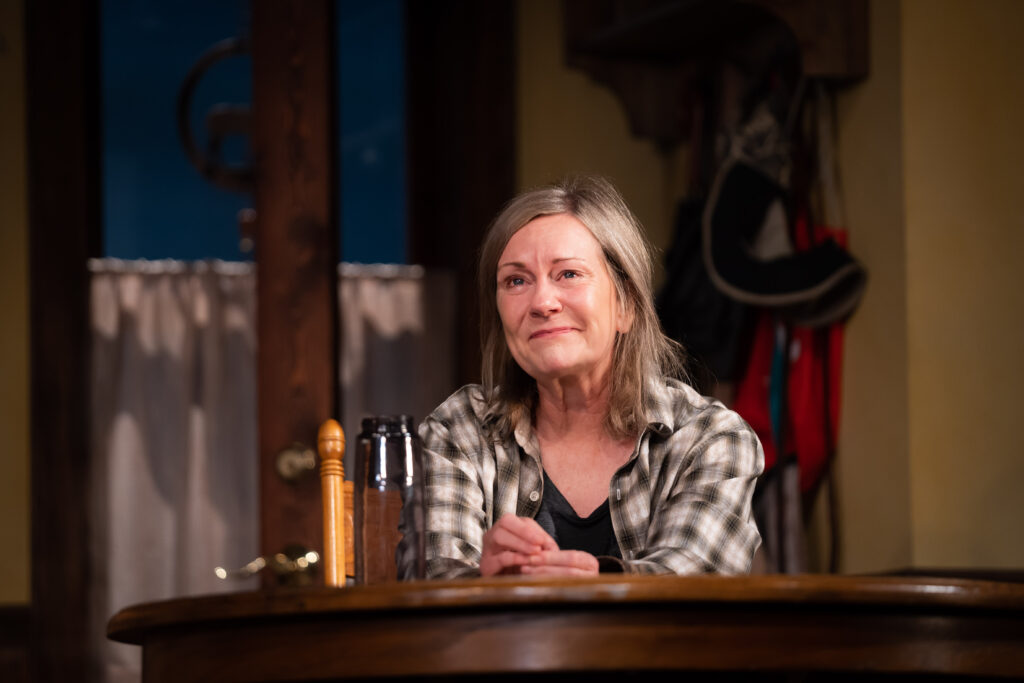
Photos by Liz Lauren
Goodman Theatre through November 13
Highly Recommended
In this election season, one might expect Swing State to be about politics, and indeed it is about the divisiveness of our current political climate, but it is also a deeply personal play that captures the emotional swings we endure as we live out our political and more human passions and beliefs.
From the moment she walks on the state & breaks eggs with grim, determined rage, Mary Beth Fisher is a marvel but then this goddess of the stage has yet to make a false dramatic move in the decades I’ve enjoyed her work, even when she is trapped in an atrocious play.
Swing State is not a bad play; in fact, it is a terrific one, the latest from Rebecca Gillman, a playwright with a penchant for tackling the pressing political and social issues of the day through intimate and perceptive stories told by admirable moral people often thwarted by their circumstances and the events and institutions that rule them. Her newest play offers Chicago a theatrical trifecta – Gillman’s 10th Goodman mainstage production in her 25-year collaboration with the theater, directed by outgoing Goodman Artistic Director Robert Falls and starring Fisher, long a Goodman favorite.
Fisher plays Peg, a recent widow who is caught in unrelenting grief over the death of her beloved husband as she continues their work trying to reverse climate change in their small-town Wisconsin corner of the world. As a pandemic widow myself, everything about Gillman’s character and Fisher’s perfect portrayal rang true from the pendulum swings — perhaps we should call it “swing state” — between the ceaseless and suffocating grip of grief and rage about the death of the love of your life and the desire to go on. I found myself sighing in recognition and tearing up. But one need not be widowed to relate to Fisher’s Peg because her widowhood and its implicit loss are a metaphor for the larger losses that climate change, capitalism, corporatization and the many other horrors of modern American life have wrought. All this could be preachy and maudlin but Gillman’s script, Falls’ fine direction and the splendid cast keep it realistic, wickedly funny and moving.
Kirsten Fitzgerald, another star of Chicago stages, is fierce and foolish as Sheriff Kris, Peg’s bureaucratic nemesis. Bubba Weiler is spot on as the troubled young man Peg and her husband took in, a person who knows Peg as well as she knows herself. Anne E. Thompson is lovely as the sweet Dani, trying to make a new life as an assistant sheriff to her Aunt Kris.
The set is perfect with its everyman-and-woman Middle Class kitchen and iconic den. Both could be in any house in rural Wisconsin or any Midwestern or suburban home of a certain class.
Swing State is a play that stays with you, not only for the clean but elegant writing and the superlative acting but for what it tells us about ourselves. In its embrace, we learn more about grief and loss, both personal and global, about the need to fight for change even in the face of what appear to be insurmountable obstacles, about the importance of who we love and what we value. Make sure you find the time to savor this moving play. You will come away a better person with a more intimate sense of how the personal and political connect.
Alma

Photo by Jenn Udoni
American Blues Theater at Rivendell Theater Ensemble through October 22
Highly Recommended
Alma, a strong new play, is a splendid example of how individual stories illuminate universal themes. In 70 minutes, this compact two-person piece manages to say much about mother-daughter relationships, the dreams parents have for their children, the immigrant experience and how Americans treat those who come to our country. Benjamin Benne’s play is part of Destinos, the Chicago Latino Theater Alliance’s 5th Chicago International Latino Theater Festival, and it fits perfectly in the festival yet crosses many borders thanks to fine writing, sure directing by Ana Velazquez and top-notch acting.
Alma, played by Jazmín Corona with a passion that makes everyday interactions sing and humanizes overwhelming obstacles, crossed the border illegally 17 years ago hoping to partake of the American Dream. She lives in a simple one-bedroom apartment in La Puente, California, with her U.S.-born daughter, Angel. A stunning Bryanna Ciera Colón as Angel matches the dynamism of her mother as they tangle over whether she will take the SAT. The play focuses on their love, their dreams and their conflicts, displaying the tensions between immigrants and their first-generation children as both struggle to fit into the cultures and countries they know. What caring parent doesn’t want the best for their progeny? For Alma, Angel’s perfect SAT score is the culmination of the American Dream and their debate about its value is a window offering a clear perspective on how hard it is to live up to a parents’ expectations, especially when they are heightened the immigration experience and all the wishes and hopes that entails.
Looming above all this is the women’s fear that Alma will be deported or worse. Not that much has changed in the last seven years but the play takes place as the 45th president is about to take office, an event that looms over every interaction. That reality offers insight into how our racism and anti-immigrant government policies can undermine a mother daughter relationship. Despite such horror, and the normal mother-daughter conflicts, the relationship these women have is full of deep love and respect. Amid these ugly and terrifying political realities, this is a story of hope, in no small part because of the strength and perseverance of these two admirable women. Let this play wrap its arms around you. It will make you laugh even as it brings you joy and a better understanding of the challenges immigrants face.
Stew
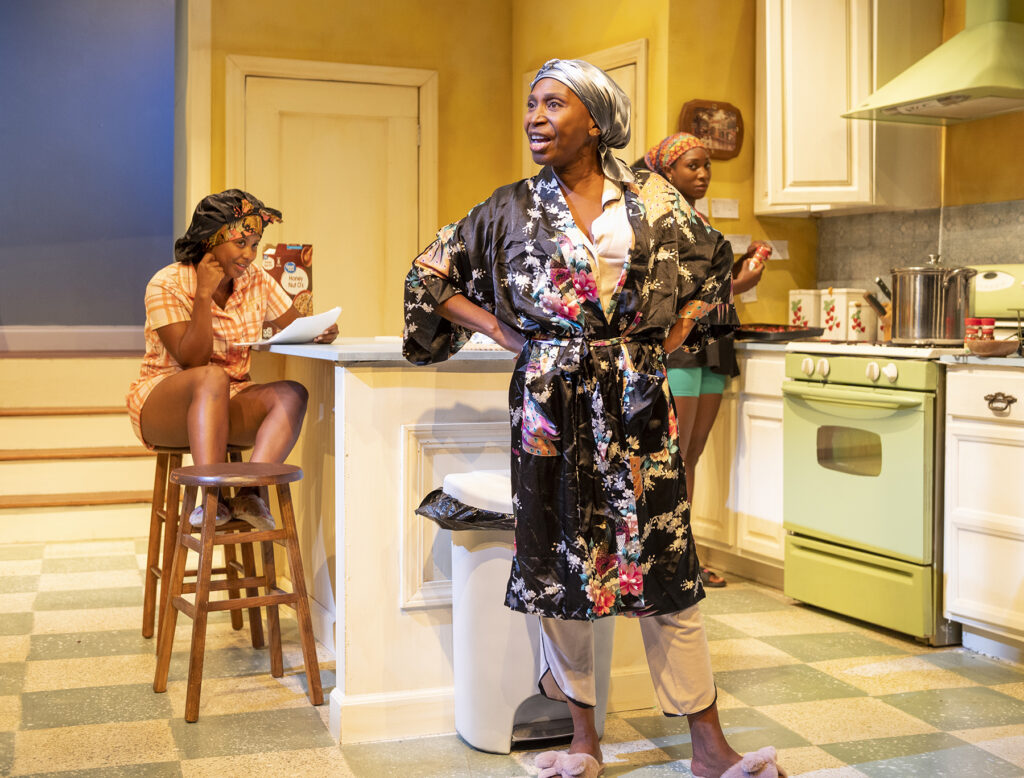
Photo by Michael Brosilow
Shattered Globe Theatre through October 22
Recommended
Stew offers up a rich broth, layered with the pain of a family facing troubles, its ingredients a complex mix of mother-daughter relationships, all turned into a savory soup seasoned with Shakespeare. Women rule in Zora Howard’s play about a mother whose older daughter and granddaughter return to the familial home where she lives with her younger daughter. Though no men appear in this play, they are present in regular mentions and as forces who drive their women’s love, disappointment, fury and grief. This play is indeed a stew, the actors & plotlines mimicking the layering that the family matriarch sees as essential to her delicious culinary creation. It takes time to make & the first batch needs to be tossed because her daughters let the beans burn. The metaphors for motherhood, daughterhood, family and love are meaningful. Each woman contributes a different taste or element to the familial stew and each brings it to a boil at some point.
As Mama, Velma Austin is the matriarch in every sense of the word. Her presence fills up her period-perfect kitchen with its avocado appliances. Her every move is perfect, from her joyful dances around the kitchen while she bops & sings to gospel while stirring her stew to her conversations with her daughters and granddaughter to her heartbreaking portrayal of Queen Elizabeth mourning her dead babies in William Shakespeare’s Richard III. The cast is strong and supports Austin. Mama’s older daughter Lillian, played by Jazzma Pryor, comes home with domestic problems that she struggles to discuss with her mother. Her daughter, Lil’ Mama, wrestles with learning her lines for a Shakespeare performance and imbuing them with the right passion and heartbreak. Mama’s younger daughter Nelly, played by Jasmine Cheri Rush, is also hiding a personal issue.
Heavy as this sounds, the often-humorous dialog, and Malkia Stampley’s directing, keep the audience laughing and engaged. There is a certain beauty in the boisterous banter of these mothers and daughters, one that sometimes includes all talking at once, a slice of life that is so familiar and comforting. Find the time to enjoy this ode to the females in the family.
Clyde’s

Photo by Liz Lauren
Goodman Theatre through October 16
Highly Recommended
Playwright Lynn Nottage’s latest is a hymn to the savory range of sandwiches constructed with love, mouthwatering delights that succeed despite their unlikely ingredients. The sandwiches become a metaphor for the diversity of the characters as they become a corps.
Set in a diner run by a woman who is the devil incarnate, despite her unlikely name of Clyde, this play tells of the ex-cons she hires to labor in misery in her kitchen. On opening night understudy Danielle Davis soared as Clyde, stunning in her cruelty and sizzling in her skin-tight outfits, perfect makeup and spiky nails to match her spike heels, never falling from the heaven she created for herself to the hell in which her employees toiled. Like Lucifer, she presides over fellow former prisoners, using that knowledge as a control mechanism. Her crew grows close despite her cruelty. The magic in her kitchen comes from Montrellous, played with yogic calm by Kevin Kenerly. His every move and word are intoxicating and you want to sample his creative sandwich creations and then follow him to whatever cult he creates. Montrellous’ monologues amaze, like his ode to food that starts with a shopping trip others might consider mundane until he unearths the perfect artichoke and describes how he prepared it, culminating in glorious, savory cuisine. His soliloquy on sandwiches, which he praises as the great equalizer, is just as moving. As Letitia, Nedra Snipes is the worried mother, caught between her concerns about what’s happening at home, her stresses from work and her admiration for her male colleagues as they create sandwiches to tempt every palate. Reza Salazar is Rafael, the cook who is sweet on her and devoted to bettering himself, one sandwich at a time. Jason, played with appropriate anger and edginess by Garret Young, comes into this tight-knit group as the odd man out. He earns his culinary stripes as they all work to survive while turning out sandwiches and meeting the demands of the never-satisfied Clyde.
Watching these four actors move around the realistic kitchen set with speed and care is like watching a well-choreographed dance. The humor is fast and wicked but Nottage’s play, snappily directed by Kate Whoriskey, offers more than wit and belly laughs. So many plays, novels and other art try to show us the good in criminals but fall into cliches or fail in other ways. Clyde’s soars here with its five vastly different characters whose stories about what landed them in jail offer poignant individualized portraits. This is a wicked good time with a heart and soul that will persuade you of the significance of sandwiches even as it makes you think about the goodness of people who spent time in prison. Don’t miss it!
The Most Spectacularly Lamentable Trial of Miz Martha Washington

Photo by Michael Brosilow
Steppenwolf Theatre Co. through October 9
Recommended
Welcome to Miz Washington’s fever dream. Like the best complex dreams, it is a wild ride filled with horror and humor but this dream is also a nightmare about slavery and the complicity of Martha Washington and her famous husband George, in slavery. Would we like to believe that the “father and mother” of our country – at least from 1789 on – declared slavery a moral stain and renounced it? I certainly would but that is not true nor is it the story this play tells. Here we have Miz Washington, delirious on her deathbed, surrounded by her slaves. They all know that that her husband’s will freed them at her death, which makes nursing her through this illness beyond impossible.
Cindy Gold brings her considerable acting chops to the difficult role of Martha, far from a heroine in this matter of human chattel. Gold must humanize her without making her seem ridiculous or hateful – except as often as necessary. She does this admirably, surrounded by a cast bursting with talent. They are so strong collectively and individually that all need to be named – Sydney Charles as Priscilla, Carl Clemons-Hopkins as Davy, Celeste M. Cooper as Doll, Nikki Crawford as Ann Dandridge, Victor Musoni as William and Donovan Session as Sucky Boy. For 90 minutes, this enslaved corps explores our original sin through Hip-Hop, a trial, vaudeville, a game show – this being the least successful of the lot – conversation, song and dance. While the performances by the enslaved are often hilarious, playwright James Ijames cautions against seeing this work’s laughter “as light or fun.” Rather “it’s more like showing one’s teeth,” he explains at the start of his script and in the program notes. “Their laughter is hostile. Loud! Laughter is a weapon.” That laughter, a strong current throughout this play, binds the historic with the contemporary, the facts with the fantasies, the humor with the horror. The fantastical costumes and set, with Miz Washington’s bed moving around the stage, add to the “spectacularly” fevered pitch of this play.
There is tons of talent on this stage and director Whitney White keeps it moving so that the actors and their audience are swept up into this high-speed trek through our ugly history of slavery. It is a story worth watching for how it makes you laugh and marvel at the moment, and keeps you thinking long after that.
Chagall in School

Photo by James Sherman
Grippo Stage Company at Theater Wit through October 8
Highly Recommended
The lure of Chagall in School is its success with balancing art, ideas and revolution while leavening those heady subjects with humor. James Shermans’ new play is about the several years in which Marc Chagall returned to his Russian hometown of Vitebsk, assembled a faculty of artists and started a free school for anyone who wanted to make art. And there the fun begins. Sherman’s play puts its audience right in the middle of a series of intense discussions about the meaning and power of art but there are plenty of laughs as the artistic corps tangles and faces the limitations of Russia in the years right after the Bolshevik Revolution. Director Georgette Verdin is equally effective whether its intellectual debates or high jinks. The actors clearly enjoy the lively dialog, whether it is passionate or playful acting makes this an enjoyable evening with arguments and ideas that resonate after the show.
The humor is definitely Jewish and Russian, critical of the politics of the moment and the realities of being Jewish in a country of pograms, which is most appropriate since Chagall was both. That irreverent but honest style works especially well as the characters face bureaucratic and political obstacles. John Drea is charming as a boyish, optimistic Chagall, pursing his dream of art for all as he revels in the love of his snappy wife Berta. Yourtana Sulaiman, a stunning beauty, plays Chagall’s no-nonsense beloved and main supporter with charm, wit and an edgy empathy. Daniella Rukin brings the required spunk to her portrayal of Russian Artist Vera Ermolaeva, who succeeded Chagall as the head of the People’s Art School in Vitebsk.
Art animates this play thanks to Erin Pleake’s excellent projections of paintings by Chagall and his artistic colleagues that appear behind the actors, deepening our understanding of their identities. Becca Duff’s costumes are period perfect.
This play illuminates a part of Chagall’s life that may not be familiar to his fans and deepens our appreciation of what he created on canvas. When it opens, Chagall in School seems like it will be a light-hearted comedy about a Russian-French artist but Sherman’s deft use of comedy goes beyond making you laugh out loud. It draws you into some of the age-old debates about who decides what art is, how one’s life inspires art, how art and life intersect, what role politics plays in art, who should have access to art. Those pressing questions, along with the promise of some good belly laughs, is reason enough to spend an enjoyable 90 minutes with a show that is more rewarding than it might first appear. My prediction is that this one will be performed as often as some of plays for which Sherman is best known so catch this world premiere while you can.
Arsenic and Old Lace
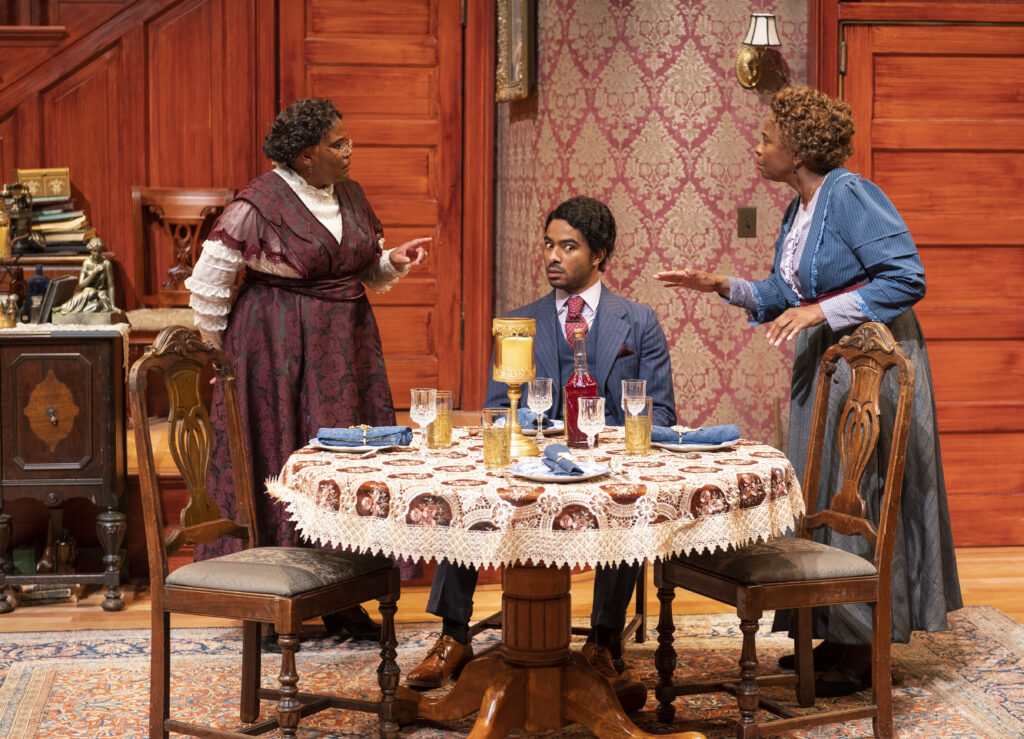
Court Theatre through October 2
Highly Recommended
Spend a hilarious evening with the compassionately murderous Brewster sisters, their delusional and criminal brothers and their charming nephew.
The cast is stellar. The sisters, Abby and Martha, acted with understated excellence by TayLar and Celeste Williams, are ideally cast, playing off against each other with a clear bond of sibling love and irritation. Their collaborative deliverance of lonely old men makes perfect sense to them as the kindest way to disappear their victims’ sadness. It is wonderful to see Williams back on stage after too long an absence. Brewster brother Teddy, played by Allen D. Edge with proper military and presidential presence, thinks he is Theodore Roosevelt. When he is not busy building the Panama Canal in their basement, he parades around happy in his delusions. Eric Gerard, as their nephew Mortimer, the only one troubled by what’s going on, is a marvel of graceful comic movement and timing, not to mention cartloads of charm. The arrival of the fourth Brewster sibling, Jonathan, a criminal brother, played with menace by stage veteran A.C. Smith, turns everything more topsy turvy.
This is a play with so many antics and humor as to leave you gasping with laughter. Clueless cops cavort among the sisters sweetly serving their poisoned elderberry wine to gentleman visitors, including another Chicago stage veteran, Allen Gilmore, unaware that other criminals are present. One amusing running gag is that the plastic surgeon who slinks along with Jonathan has made him look like Boris Karloff, the actor who portrayed Jonathan in the 1941 play and allowed his name to be used in the 1944 film. Another is that Mortimer is a newspaper theater critic, which leads to many slights to the knowledge, intelligence and judgment of those who review plays.
Director Ron OJ Parson, deeply respected for his brilliance with August Wilson’s work and more serious plays, shows himself to be equally adept with comedy. His touch even extends to how the actors use every part of the set, which is a perfect period reflection of the aunts down to every detail. Watching the siblings use of the stairs is a hoot, as are the moves Mortimer makes that marry acrobatics with ballet. The fact that all the Brewsters are Black and all the other characters are white adds a delicious and telling edge to the story.
Having never seen the play nor the famous movie, I came with a fresh perspective to this show and left utterly delighted. Mr. Parson has said he wanted to make people laugh because we all need that at this time. He succeeded. Don’t miss this delicious evening of hijinks and humor.
National Merit

Photo by Bari Baskin, Time Stops Photography
Boho Theatre at Theater Wit through September 25
Recommended
National Merit will take you right back to high school and the tense times of high-stakes testing. It’s not a journey full of happy nostalgia but it is one accurately portrayed in a world premiere of Valen-Marie Santos’ play. Nimbly directed by Enrico Spada, this piece offers a fresh and authentic take on high-school juniors in a high-scoring cohort who are fiercely competing to be National Merit Scholars. The high stakes, intense battles and emotional woes are played with real passion that captures and offers us insight into the late teenage years by a corps of seven young actors, many still in college. All are good but a few particularly interesting characters stand out. Ariana, well-acted by Maddie Powell, shows how deep intelligence leads to nuanced understanding and makes it hard to select a simple answer on such a test. Sripadh Pulligilla brings a sweetness and smarts to Yash, the son of Indian immigrants. As buddies Camila and Cisco, Tatiana Bustamante and Alex Rocha, remind us of the intensity of high-school friendships. Amber Washington plays the sole African American in the group with appropriate rage that finally allows some of her classmates to see what being a token means and come a bit closer to understanding racism. Justin Kuhn does a nice turn as the clueless white male whose pranks too often touch cruelty.
The opening audience reminders playfully evoke the testing atmosphere, a mood continued by the set, a spot-on recreation of a high-school classroom with its depressing desks and irritatingly cheerful motivational posters.
There’s a certain tragedy in the fact that we are still battling the very real limitations of standardized testing, especially for those of us who lived through the 1960s when it seemed that finally a consciousness was emerging about these tests’ inability to subtly measure intelligence because they were so focused on giving high scores to those who learned how to take the tests. Alas National Merit proves that this was but a brief phase. It nicely updates the old battles with its multi-racial cast and plot lines that demonstrate how universal this particular competition remains. This play will make you ponder what we really know about intelligence and whether such stresses are necessary.
My Brother Langston
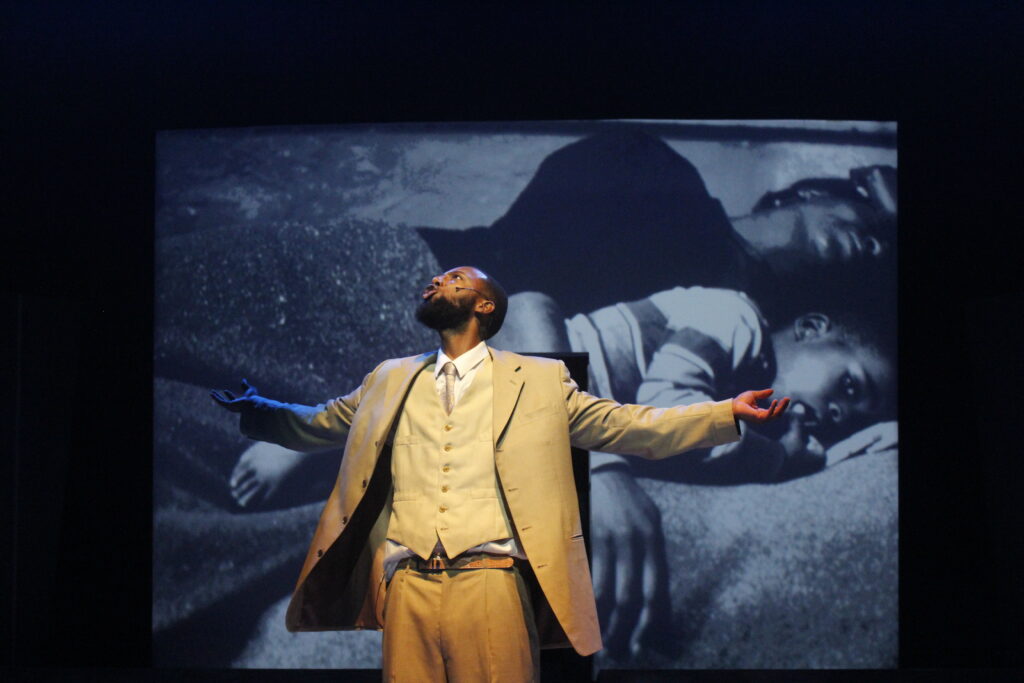
Black Ensemble Theater through September 18
Recommended
One of the delights of My Brother Langston is how much of Langston Hughes’ poetry is given dramatic form. Among the 10 poems featured is “The Negro Speaks of Rivers,” the first poem that brought Hughes acclaim when it was published in the NAACP’s The Crisis in 1921. Its recitation marks the start of many journeys – artistic, intellectual, emotional, political and geographic – that the young writer and social activist will make in this show that focuses on his early years. Those journeys are enhanced by Hughes’ poetry from less familiar poems to his iconic “Harlem” poem, with its famous lines “What happens to a dream deferred? /Does it dry up / like a raisin in the sun?” Playwright and Director Rueben Echoles, a Black Ensemble stalwart, nicely pulls in major influences, from Hughes’ admiration for Walt Whitman and Carl Sandburg to his delight in the Jazz of his time to his love of the richness of Harlem, where he was to become a leader of the Harlem Renaissance.
As Hughes, Chris Taylor offers an upbeat portrait but not a simple one. His portrayal is beaming, engaging and it affably yet passionately conveys the way Hughes’ art drew from his life, whether it was memories of his adored maternal grandmother, his less-than-perfect parents, his college years, his possible love affair with Countee Cullen, his friendship and work with Zora Neale Hurston and more.
The fine singing and exuberance dancing that is a hallmark of Black Ensemble is impressive especially since the cast numbers only five. Their work is enhanced by big-screen projections of settings and compelling visuals, and by the always-stellar Black Ensemble musicians. It’s a pleasure to see André Teamer, a senior Ensemble member, in a range of roles from Hughes’ father to Cullen. Nolan Robinson plays Hughes’ close stepbrother with warmth and sweetness. Reneisha Jenkins and De’Jah Jervai expertly inhabit a number of roles, moving through the women in Hughes’ life from family members to artists like Billie Holiday.
This new show is, in some sense, a lesson but not a boring one. Rather this exploration of Langston Hughes’ early years bursts with life and well-written lines, whether spoken or sung, giving its audience much to contemplate and enjoy. It will leave you wanting to know more about this beloved artist and activist.
Hurricane Diane
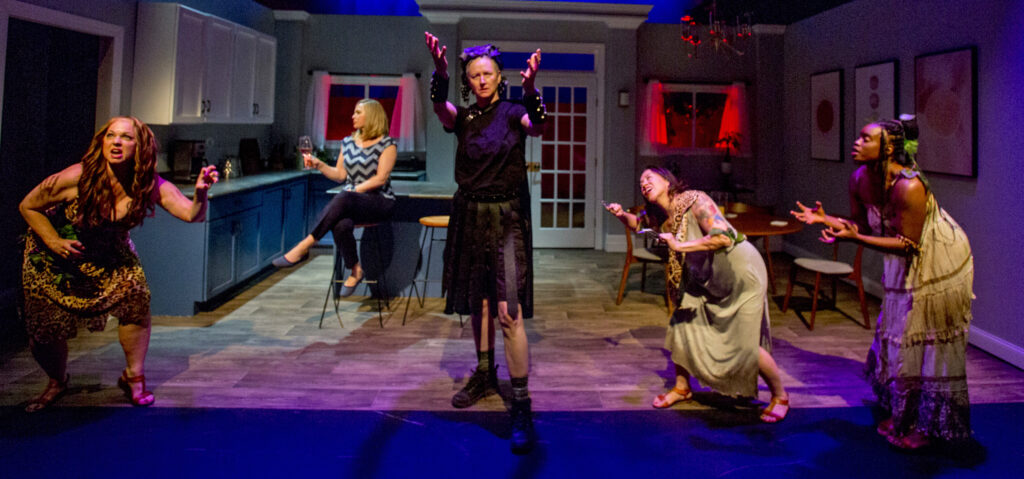
Theater Wit through August 14
Highly Recommended
Imagine a comedy about climate change. Hard as it is to fathom, Madeleine George’s blisteringly funny new play tackles the horrors we face with humor at the highest and lowest and all levels in between. It starts with he Greek goddess Dionysus, riotously portrayed by Kelli Simpkins, storming into a suburban New Jersey cul-de-sac determined to save the world by using the old Olympic trick of disguise to fool the mortals. She becomes Diane, a lesbian gardener/landscape designer who works her wiles on four suburban female friends. Seductive words tumble from Diane’s lips, along with references to Greek mythology, bitingly funny quips about pop culture, suburban life and much more. Simpkins, long a favorite on Chicago stages, is excellent in this comic role. The suburban women are no slouches either. Jazmin Corona, Aneisa Hicks, Carolyn Kruse and Lori Myers camp it up without ever quite falling into the stereotypes they play.
The set design is clever. A suburban kitchen is transformed by a change in flowers and garden views that summon up the personality of each of the New Jersey women. The costumes are perfection as they channel every character from corporate to “married to the mob” to hippie-dippy to Eileen Fisher finesse. The whole 90 minutes will have you chortling and howling with laughing as you marvel at the breakneck wit and depth of George’s dialog, and the perfect portrayals of her characters expertly directed by Jeremy Weschler. The return of this playwright to Theater Wit – Weschler also did a fine job directing her wildly funny and smart “Seven Homeless Mammoths Wander New England” eight years ago – is most welcome.
Make no mistake though this is a play about the battle between what humans have done to the earth and how the earth can be saved. Go for the humor, stay for the message but whatever you do don’t miss this one. Fortunately this 2019 Obie-winning Best Play has been extended to August 14 so you have plenty of time to enjoy it.
Summer and Smoke
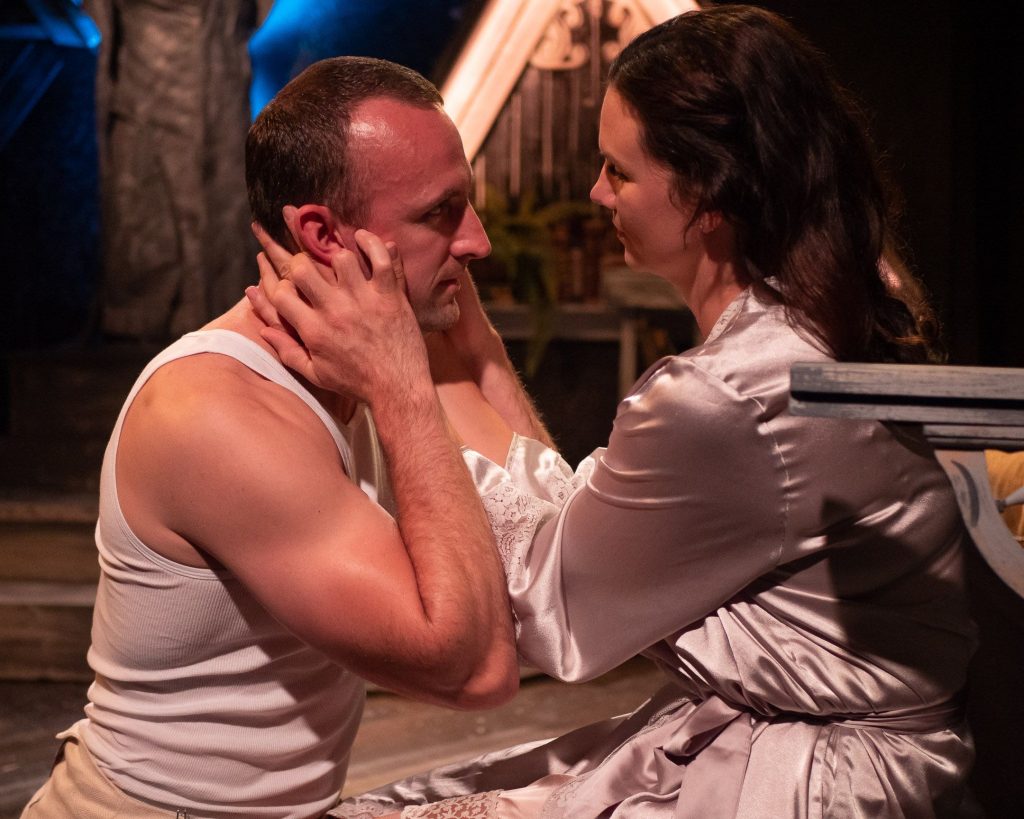
Violet Sky Theatre through July 31
Recommended
Spend a steamy summer evening with a classic Tennessee Williams drama about the battle between love and passion, sexuality and spirituality. Summer and Smoke, in an impressive inaugural show for Violet Sky Theatre, captures the essence of the struggle between Alma Winemiller, the deeply intelligent but nervous and unmarried minister’s daughter, and John Buchanan Jr., the son of the beloved doctor next door. This son, now a doctor himself but also a rake and wild lost soul, is home for the summer, reigniting Alma’s lifelong love for him. The chemistry sizzles between Alma, played to perfection with a complex mix of smarts and nerves by Lindsey Zanatta, and John, portrayed with the right touches of tortured raffish cad by Joshua J. Volkers. There is heat on the spiritual side as well. Much is made of the fact that Alma means “soul” in Spanish and there are important angels in this play, including the one who dominates the stage.
Aside from the leads, Debra Rodkin is particularly wonderful as Mrs. Winemiller, Alma’s mother, adding depth, humor and a nice dose of wickedness to the role. Despite all the drama and sexual tension, including some surprises and twists that one expects in a Williams play, there is humor here, which the rest of the cast provides with relish.
The set works particularly well at complementing the hot summer nights in Alma’s family home and the very personal encounters in the doctor’s office with its period pieces that summon up the early 20th century South. One particularly nice touch is the partial wood-framed window sills that flank the stage, allowing the actors to gaze out into the audience and muse or watch the other characters’ comings and goings. It’s a marvel to convey so much in such a tiny space but Kevin Rolf’s splendid scenic design and Chad Lussier’s atmospheric and appropriately dramatic lighting, along with Eden Blattner’s sure directing, make that happen.
Fans of Williams’ work – this play was written and produced in the same period as A Streetcar Named Desire – will enjoy this show. It’s a fine introduction to a great American playwright for those who have yet to experience the wonders of Tennessee Williams.
Pearl’s Rollin’ with the Blues: A Night with Felicia P. Fields
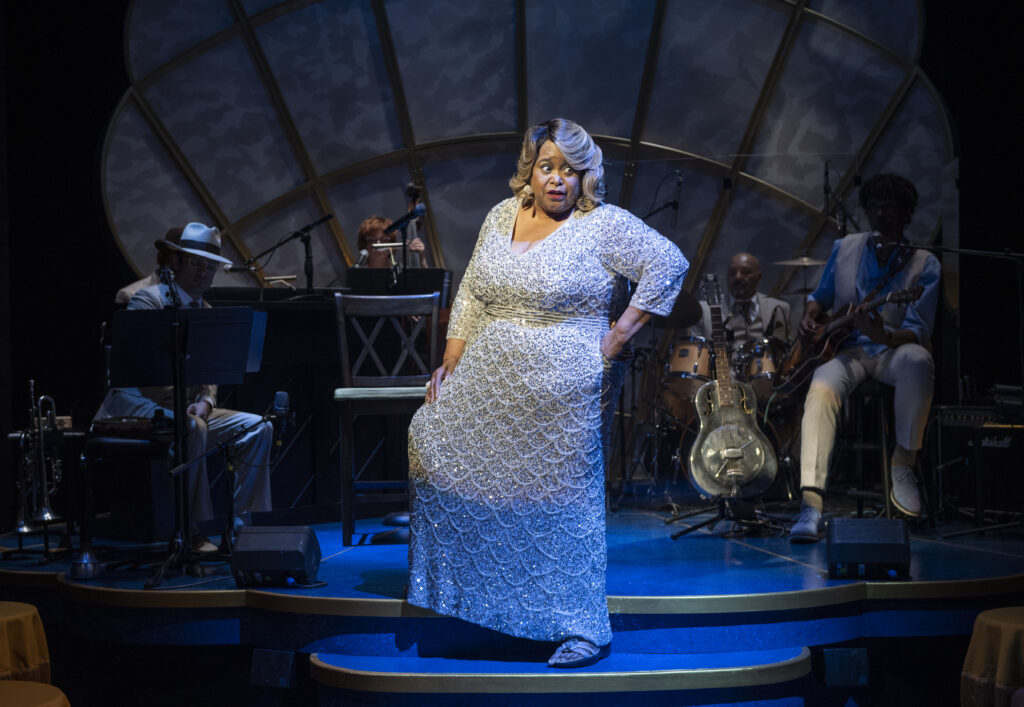
Writers Theatre through July 24
Highly Recommended
An evening spent in the company of Felicia Fields is guaranteed to be a pleasure because of her rich and versatile voice, dramatic chops and wicked sense of humor. Pearl’s Rollin’ with the Blues: A Night with Felicia P. Fields is no exception.
It is a warm and personal evening framed by Fields’ strong emotive voice and filled with fine music and song from her accompanying musicians, good-natured ribbing of the music corps, a bit of wicked repartee with audience members in the first row of club tables, some tales of her youth and a wide range of songs. Part of the appeal is the force of Fields’ personality, her tell-it-like-it-is style with the right doses of sauciness and seriousness, and her ability to express and interpret songs but the show is taken to a different level by Fields’ view that the Blues can include happy emotions too. She starts with the classic “Wang Dang Doodle” before heading into “They Call Me Big Pearl / Built for Comfort.” Felicia’s middle name is Pearl and the song fits her as well as the sparkling, opalescent dress that hugs her form. So do some of the other vocal choices of the evening. “My Stove’s in Good Condition” pays homage of the sexiness of Blues great Bessie Smith’s spicier numbers. “You Can Have my Husband” is another charmer. The closers “Everyday I Have the Blues” and “Blues Is All Right” offer a fine finish.
Esteemed Director Ron OJ Parson, who has worked with Fields on many shows and co-created this one, makes sure his star sparkles. So do her musicians. Chic Street Man is the show’s music director and guitarist. His style is a bit more folksy than feels right sometimes but his rapport with Fields is clear, especially when she mocks the simple lyrics of “Hey, Hey, Baby, Hey.” His gentle amused response is that the song is Big Bill Broonzy’s. Dapper Ricardo Jimenez plays a mean horn and harp. Julie Poncé’s years of experience flow out of her out on her bass. Frank Menzies conducts with character and masters the keyboard with style and finesse.
Spend an evening with this musical crew and you will experience a rainbow of blues.
Choir Boy
Steppenwolf Theatre Co. through July 24
Highly Recommended
Here is a perfect ensemble experience both for the singing and the ensemble acting by a corps of five young men in a Black all-male school. Under the sure direction of Kent Gash, these young men move with an authenticity that captures the way teenagers interact with each other and the world, fine group work that reveals many unspoken truths about each character and the group. It is a joy to behold.
While the characters in Tarell Alvin McCraney’s excellent Choir Boy each have elements that are familiar the writing and acting transcend typecasting. Leading the crew at opening as Tyler Hardwick as Pharus – Jos A Banks is now in that leading role – who struggles with his desire to be part of his school’s community and a fully out gay man despite intense homophobia and hate from his classmates. Gilbert Domally is persuasive as his seething nemesis, who spits out the homophobic slur that starts the play and is somewhat protected by his uncle the headmaster. The most moving portrayal comes from Sheldon D. Brown as AJ, Pharus’ all-heart roommate whose size and strength offer armor that allows him to be a compassionate and wise soul. All these gentlemen give nuanced performances, moving deftly from anger to joy, humor to hatred, as they burst out of adolescence and into adulthood. The one disappointment is La Shawn Banks, a wonderful actor, who plays the headmaster in far too comic a way. His is the one portrayal without depth.
The set matches the beauty of the songs with its elegant arches and striking lighting. The shower scenes are particularly striking and beautiful. None of it could have happened without McCraney’s lovely play, one that glitters in its gorgeous complexity and humanity. As he did with his other plays performed at Steppenwolf, where he is an ensemble member, and in his Academy-Award-Winning movie Moonlight, this playwright manages to make the mundane shimmer as he guides us to new insights. Make this play a part of your life.
The Luckiest

Raven Theatre through June 26
Highly Recommended
What’s so wonderful about The Luckiest is how it takes what could have been an unbearably tragic situation and shines the light of love and humor on it using three fully realized characters who are believable and engaging.
The stories that form the return to Chicago stages are often tragedies, stories of death and dying, loss and love, but many offer humor as well and The Luckiest leads this corps. Director Cody Estle has just the right touch for Melissa Ross’ tale of the smart, strong and funny Lissette who has to come to terms with her diagnosis of ALS and seize as much control of the situation as possible. Cassidy Slaughter-Mason does a brilliant turn as the spunky young woman, from the opening scenes of banter in a budding friendship to the silent woman in the wheelchair who can still smile and is still in control. Christopher Wayland is Peter, a soft-spoken gay man who develops a friendship with Lisette at a party, a friendship that grows and never slips into the stereotypes of gay-straight relationships. That relationship is at the center of this play and the tenderness between these two makes you want to walk onto the stage and be part of the magic they share. The other relationship here is more fraught. As Lisette’s mother Cheryl, Tara Mallen, a veteran of the stage who rarely takes a false step, perfectly conveys the challenging role of a strong mother of a strong daughter, always wanting to respect her child’s independence and tenaciousness, and even admiring it while wanting to take over and make it all right. Not surprising that the two don’t necessarily see how similar they are.
The result is a play that stays with one thanks to this mighty trio of actors, well-directed in a lovely, funny and moving play, manages to be up-to-the-minute – when Lisette’s mother and her friend share their war stories about dating apps it is warm and the dialog is funny and delicious – and profound at the same time. The playwright never shies away from showing the anger about living with a wasting disease, anger felt by all who love the person diagnosed, as well as the rage over the loss of control of one’s body. Yet she, and this cast, director and crew, imbue this piece with dignity, humor, intelligence, friendship and the complexities of mother-daughter relationships.
The Luckiest has been extended until June 26th. Make sure you see it before it leaves us.
The Chinese Lady
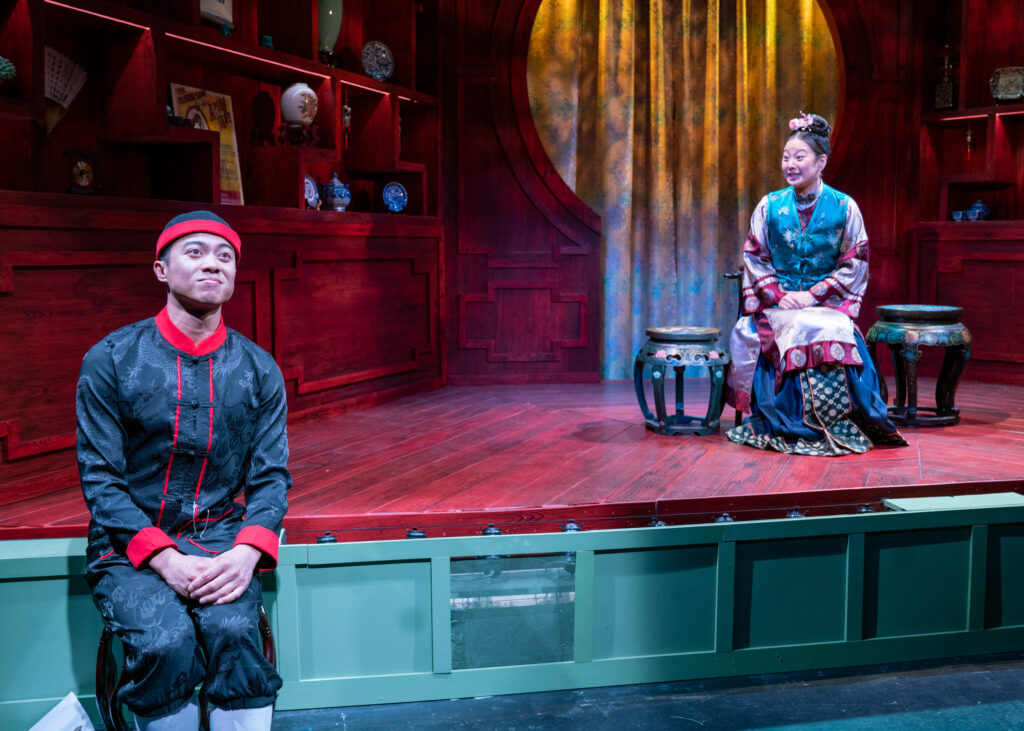
TimeLine Theatre Company at Theater Wit through June 18
Highly Recommended
From the moment the actor sits on the edge of the stage in jeans and a t-shirt before the play begins & looks carefully at her audience as it engages in pre-show chatter, the tone is set. It is one of curiosity and kindness, and her focus, along with her smiles, set the stage for what is to come.
When we next see Mi Kang she is transformed into the 14-year-old Afong Moy, and is wrapped in beautiful Chinese silks sitting in a jewel box of a room, also rich with the silks, artworks and furniture of the Silk Road. Afong explains that her family has sold her into service for two years during which she will be displayed for an admission fee. This enterprise is, Afong explains, a false construct but an important act of cultural diplomacy. She hopes to help Americans understand the Chinese who are beginning to come to these shores. For those who pay to gawk at Afong, listen to her commentary, watch her serve tea and promenade on her small feet, this creature fits right into the American fascination with the other and grotesques. It comes as no surprise that Afong’s act is eventually taken over by P.T. Barnum.
Kang expertly chronicles Afong’s life, using charm cut by candor to explore the American interest in her, express disappointment over the lack of deeper understanding of or appreciation for Chinese culture and walk her audiences – the ones she addresses as she ages in the play as well as her contemporary audience sitting in a Chicago theater. The arrival of Chinese immigrants, followed by the ugly history of anti-Chinese sentiments and laws in this country are woven into her narratives. Kang handles the clever conceits and weighty concepts of Lloyd Suh’s play with aplomb.
In a smaller but incredibly important role is Glenn Obrero as Atung, her translator. It quickly becomes clear that he is so much more. Here is an actor who knows how to play second fiddle in an impressive range of keys. Their interaction is tense, funny, almost warm and essential to the play.
At heart this is a play about the difference between looking and seeing, about the American obsession with the other, about our inability to overcome our prejudices and fear of foreigners. It has a timeliness now with all the recent hate crimes against Asians but it is a play for all time as it reveals our interest in looking that so rarely evolves into our ability to see. That makes it universal and essential for any theatergoer. Although it closes on June 18th, TimeLine Theatre Company has added virtual viewing options so you can catch this moving and important piece.
A Theatrical Trio of the Highest Order
A trio of iconic plays closing this weekend offers some dramatic gems that were meteoric in their respective centuries and continue to shine in ours.
Seagull

Steppenwolf Theatre Company through June 12
Highly Recommended
Start with Anton Chekhov’s Seagull in a brilliant translation by Steppenwolf Ensemble member Yasen Penyakov, who also adapted and directed it. His version of this inter-generational contemplation of art, love & family captures the melancholia of its Russian characters but also their humor, so often lost in American productions. The late Sheldon Patinkin, a brilliant director himself and teacher and mentor to many in Chicago theater, once told me that the problem with most American productions of Chekhov was that bad translations lost the humor. His Uncle Vanya, also at Steppenwolf, where Patinkin had deep ties, and featuring Austin Pendleton, was the first laugh-out-loud Chekhov I experienced. Penyakov’s Seagull is the second. No doubt the stellar cast of Chicago’s well-respected actors – Keith Kupferer, Sandra Marquez, Caroline Neff, Jeff Perry, Karen Rodriguez, Joey Slotnick, Namir Smallwood and Lusia Strus, with fine turns by newcomers – help make this version soar but the magic Penyakov works is estimable and leaves one with many questions and thoughts, as well as lovely images.
Edward Albee’s Who’s Afraid of Virginia Woolf

Invictus Theatre Co Chicago through June 12
Highly Recommended
Next head to Invictus Theatre Co for an appropriately searing production of Edward Albee’s masterpiece Who’s Afraid of Virginia Woolf. It’s hard to top the stunning movie with Richard Burton and Elizabeth Taylor as the warring older couple or the unforgettable 2012 Steppenwolf version with Tracy Letts and Amy Morton but this tiny storefront equals it, and offers a better youthful duo as the eager new professor and his spouse. Letts gave us a whole new take on George and his pairing with Morton brought out the love in their relationship. That is present here too in James Turano’s exhausted but cruel George and Andrea Uppling’s shrill and smart Martha. In this production, perfectly directed by Charles Askenaizer, every member of the famous foursome is fierce, including the young couple. Keenan Odenkirk as Nick, the bright young biologist, is the right mix of charm and smarm. Rachel Livingston as Honey, reinvents the role as his initially dingy but ultimately not-so-slow wife. The period-perfect set in this tiny theater makes you feel that you are part of this disastrous evening. As with any classic, the play comes alive with this fine new version. Young Nick can now be read as the shiny but not intellectual future of higher education, ready to do anything to get ahead without a care for or clue about history, a terrifying thought. And so Who’s Afraid of Virginia Woolf moves more generations with its tragic love story and meditation on success, power and love.
Two Trains Running
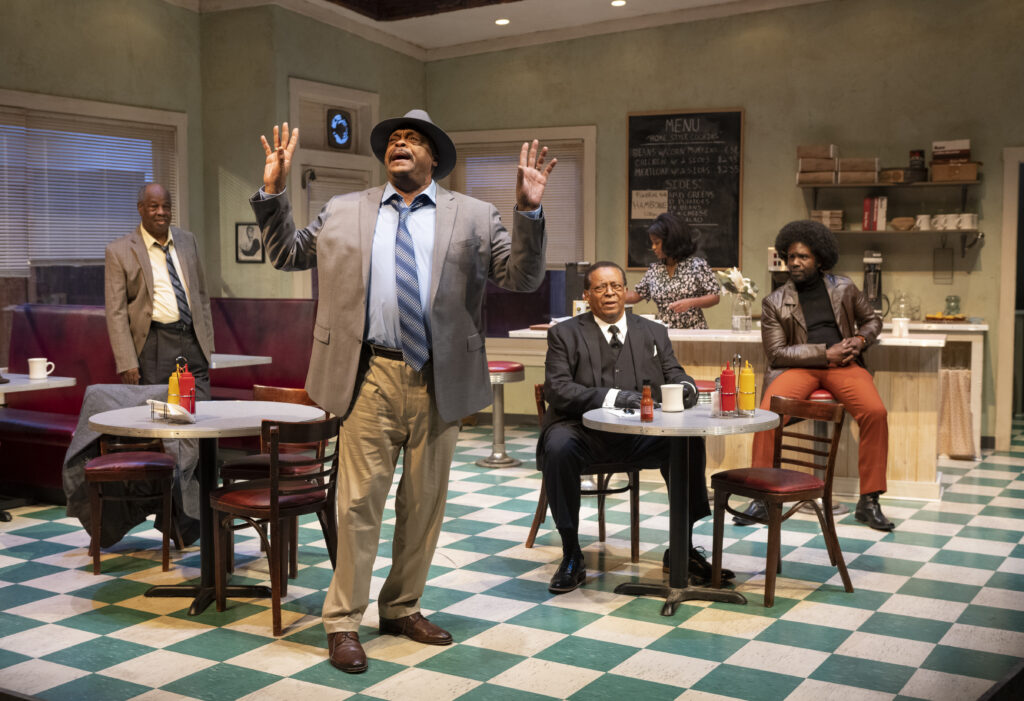
Court Theatre through June 12
Highly Recommended
Finish with August Wilson’s Two Trains Running at Court Theatre where a splendid cast does the bard of Pittsburgh proud with its interpretation of this Wilson’s1960s play from his set of 10, one for each decade. This is one of my favorites of Wilson’s opus, and I’ve seen many lovely productions of it but Ron OJ Parson applies his usual directorial magic to this one. His cast is ideal. A.C. Smith offers his hallmark mix of bluster and facial expressions that are worth a million words. Ronald L. Connor is all slick fashion and business as Wolf, the manager of bets for “the Hill,” the Pittsburgh neighborhood where Wilson’s plays take place. Kierra Bunch is a fine blend of tough and tender as Risa the waitress. Jerod Haynes is the just-released-from-jail young man who romances her with his unusual sense of equity and hope. Alfred H. Wilson is the wise Holloway who seems to try to stay out of trouble but knows the score on everything and everyone. Cedric Young presents an OCD version of West the undertaker that works even as it amuses. Joseph Primes manages a range of emotion in the most limited role with just a few words at his disposal. Together, in a perfectly realized old-style restaurant, this corps brings this lovely story to life, capturing the heart and soul of each character as well as the decade in which they struggle to exist.
At the Vanishing Point
Each one of these three plays deserves its place in the firmament of drama, and each one of these productions insures its place there. Don’t miss any of them.
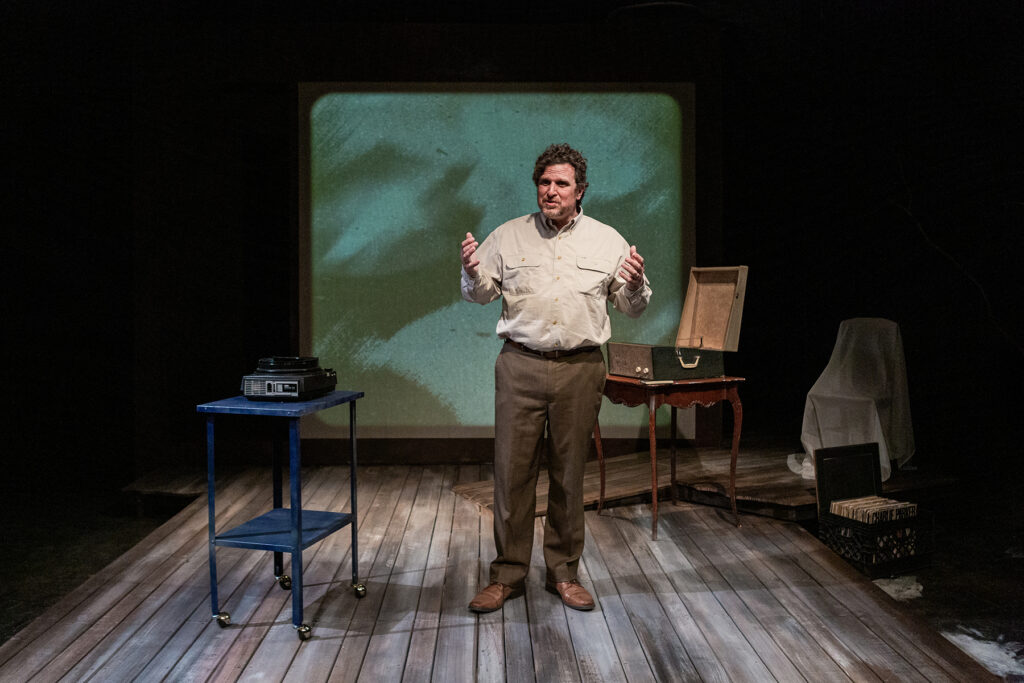
The Gift Theatre at Filament Theatre through May 22
https://thegifttheatre.org/shows-events/at-the-vanishing-point
Recommended
From the moment he takes the stage, and he is the first one to do so, Paul D’Addario, engages you. It is not only that the man is a fine actor – always has been – but that the ophthalmologist and amateur photographer he plays is so engrossingly smart and passionate and quirky, and D’Addario so brilliantly inhabits him, using every gesture and smile to bring us into his mind and life.
He is our introduction to what turns out to be an exploration of a Kentucky town and how its inhabitants, in a series of monologues, remember the events they have experienced and others from their town’s history. Most of the characters and actors are strong but none reach the level of D’Addario or his eye doctor. What we get is an often lovely, and sometimes funny, view of this community of ordinary people living often full and passionate lives. This is not an uncommon dramatic approach but it works here for the most part, especially as the individuals and stories connect. The piece seems especially timely now, as many of us still exist in partial isolation, as it stresses that community can be found even when we are apart. D’Addario, who makes a second appearance, is the intelligent and compassionate string that connects us and keeps us on the line. His radiance in this role is not to be missed.
Spring Awakening
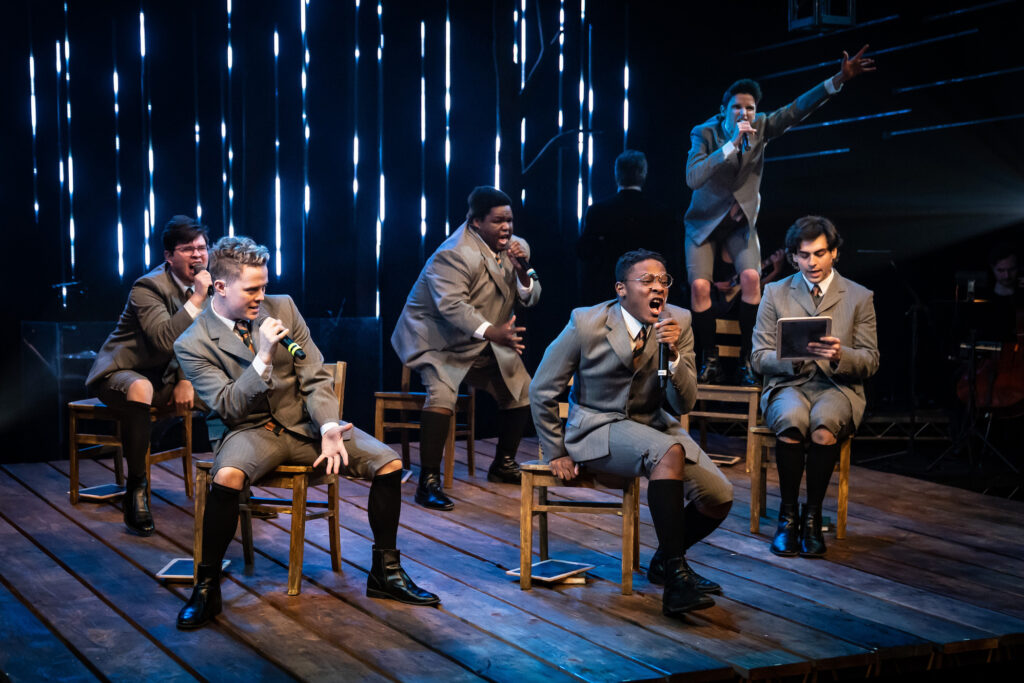
Porchlight Music Theater at the Ruth Page Center for the Arts through June 2
Highly Recommended
Imagine a teenage version of Der Struwwelpeter, the 1845 book of cautionary tales that terrified so many German children. Add rock music, adolescent angst, puberty, profanity and 19th century German repression and you get Spring Awakening, a rock musical now in a compelling production by Porchlight Music Theater. There have been a number of productions of the 1891 German play, including off-Broadway and Broadway versions that won multiple Tony Awards, but Porchlight, as always, finds the gritty, angry essence of the piece.
Brenda Didier works her usual directing and choreographic magic on this story of three teenagers who explore their growing sexuality in small-town Germany running smack into German provincialism and fighting it at every step. Didier’s deft touch hits all the right notes to complement the score that alternates between rock rage, teenage passion and adolescent melancholia. Her trio is excellent, as are the teenagers who form their youthful community, and the two older actors who master multiple roles with relish, but the standout is Quinn Kelch as Moritz. He oozes punk rock rage but cools it down with a David Bowie aura that works brilliantly, and his versatile face and comic timing are a delight.
The total package captures and conveys the ups and downs, the mood swings of anyone’s turbulent teens, but more particularly these young people’s, trapped as they are in an especially punishing and judgmental Germany. Don’t miss this unique American musical.
All’s Well That Ends Well

Chicago Shakespeare Theater through May 29
https://www.chicagoshakes.com/plays_and_events/allswell
The besetting problem with All’s Well That Ends Wells is that it doesn’t. That makes this particular tragi-comic Shakespeare play a tough one to do. Not that other of the Bard’s plays don’t have their challenges – consider The Merchant of Venice, Othello, The Winter’s Tale – but over the decades, in the hands of brilliant directors and actors, some at Chicago Shakes, we’ve gained new insights as we’ve watched the Bard’s classic works reimagined, proving their enduring genius. Recall CST Founder & Artistic Director Barbara Gaines’ first King Lear,in which she illuminated the actions of that troubled king by seeing him as a man in the early stages of Alzheimer’s. Astonishing.
No matter what lens one uses, All’s Well That Ends Wells proves difficult. A Feminist lens is impossible. It put the play squarely in the province of Taming of the Shrew, a play that is nearly impossible to do in our time. While it’s true that most of us know someone who showed terrible judgment in love, it’s still a stretch.
So it’s particularly impressive that this production is an enjoyable one — as long as you don’t get too annoyed with Helen for being so smitten with the loser Bertram. Alejandra Escalante plays the orphaned daughter of a countess’ doctor in a charmingly straightforward way, as a woman who isn’t made so stupid with love that she can’t plot to make matters turn out as she wants. The antics of those with whom she devises her plan are amusing enough to take your mind off the stupidity of the pursuit. The fault is in the play and not with the actors. Dante Jemmott does his best with the immature Bertram.
The real stars here, not only because their characters aren’t mired in qualities that exasperate or horrify us, are the countess and the king, both played by long-respected and stellar Steppenwolf actors. Ora Jones brings classy calm and strength to the recently widowed countess, who is caught between being mother to Bertram and guardian to Helen. Francis Guinan’s King of France regains his regal strength after Helen cures him and is persuasive in every breath. I’ve never been disappointed by either of these actors in my decades of Chicago drama and, yet again, they prove perfect here.
The other saving grace of this production is the wit and humor that Director Shana Cooper and her cast, which has no weak links, bring to the play. Even with the central problem of a truly mismatched couple, there are moments of joy here that are not to be missed, and a spunkiness and charm that are infectious as we join this excellent cast in watching the events unfold.
Intimate Apparel
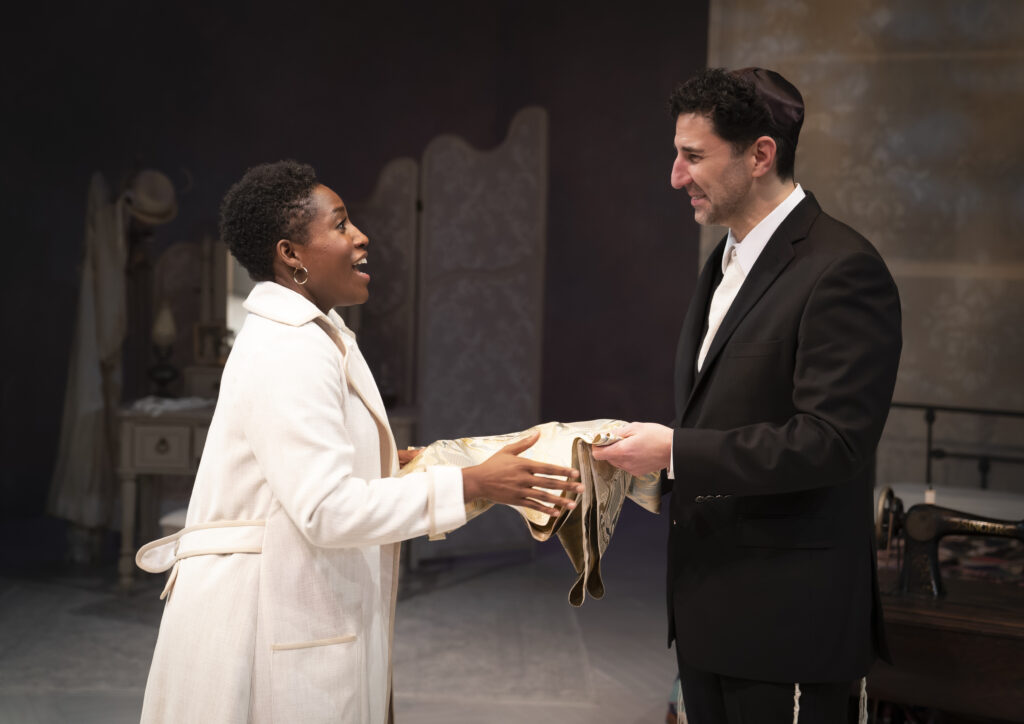
Northlight Theatre through May 15
Highly Recommended
The cast shimmers like a fine piece of silk in this lovely production of Lynn Nottage’s Intimate Apparel, a play about a Black seamstress who uses her admirable skills to create a reputation and a nest egg with the beautiful lingerie she creates for wealthy Manhattan women. As Esther, Mildred Marie Langford, combines steely determination about her profession with longing for love. Her every move is graceful and beautiful to watch. She finds a soulmate in a Jewish fabric merchant, played by Sean Fortunato, who shares her love of fabric. The scenes in which they touch and talk about the fabrics are filled with the sensuality of silks and chiffons, as well as their longing for each other but race and religion prevent their match. Afraid of being a spinster, Esther seeks advice from the woman who runs her boarding house. In that role, Felicia Fields, already a force in Chicago thanks to her splendid singing and acting, doesn’t have to sing a note to embody a bustling, big-hearted busybody who knows the score.
A letter from a lonely Caribbean laborer lifts Esther’s spirits and the two begin a courtship by correspondence that ends in marriage. The marriage founders and Esther must face her the resulting devastation of her dreams.
At its heart this is a play about longing and loneliness, and a very personal one by Nottage, the only woman to have won the Pulitzer Prize for Drama twice. Director Tasia A. Jones brings out that loneliness and longing with her sure hand. A versatile ivory set with splashes of color highlights the sumptuous fabrics. Stunning period costumes in the same color scheme round it out, as does sensitive lighting and the effective use of black-and-white photographs.
It is a holistic production but the stars are the actors. Fortunato and Fields are well known to Chicago drama fans for decades of brilliant portrayals at many theaters. Both have shone in a wide range of roles, from tragedy to comedy. Langford has also graced Chicago stages with intensity. The only problem with this role is that she is far too beautiful for the plain woman it requires.
Spend some time with this play not only for the beauty it offers but for the emotions and dreams it explores.
Rasheeda Speaking

Shattered Globe Theatre production at Theater Wit through June 4
Recommended
Rasheeda Speaking is not an easy play to watch because of the racism, which is so hateful & automatic it sears one’s soul. What makes it even harder to watch is that so little has changed since it premiered at Rivendell Theatre Ensemble in early 2013 or off Broadway two years later or for that matter since African-Americans were allowed to work with whites in offices.
Reviews of the play by the late Joel Drake Johnson have always been mixed, no doubt because racism is such a difficult subject and perhaps because there was a certain suspicion about a white man writing such a raw play about racism. Some critics said it wasn’t probing enough; others that it was really about office politics rather than race. It seems to me any effort to address racism is essential. What’s important now is that seen through the lens of the Black Lives Matter Movement, Rasheeda Speaking takes on new meaning. Perhaps the relevant question is was this playwright prescient or simply aware of the relentless river of racism?
Without a doubt, the production’s intensity comes from Deanna Reed-Foster as Jaclyn Spaulding, the Black employee who returns after 5 days away to find herself in the middle of a plot to have her removed or transferred, which is spearheaded by the surgeon for whom she works. Reed-Foster is a force as she navigates the many sides of her character and the racism and office politics she faces. Drew Schad is perfectly slimy and manipulative as the surgeon who wants her out. As the newly minted office manager promoted to carry out the surgeon’s scheme, Daria Harper nicely captures a woman caught between wanting to be ethical but being susceptible to an evil boss who plays on her weaknesses.
In Director AmBer D. Montgomery’s capable hands, this production hits the right notes of rage without losing the nuances of office politics. The set, which could have stopped at functional, offers an opaque back wall, a bow to the characters’ behind-the-scenes manipulations, and the not-so-subtle ways in which we try to hide what we feel and how we act.
If you want some insight into the omnipresence of racism and office politics, do see this play. If you want to better understand some of what is behind Black Lives Matter, this excellent cast will offer illumination.
On the Greenbelt

On the Greenbelt Strawdog Theatre Company Production at Links Hall through May 28
Recommended
We’ve learned so much about loss in this never-endemic that we can understand how the looming death of a beloved mother could unmoor us and throw our generally happy family into crisis. What is harder to deal with are the horrors and decisions someone dying and in great pain, and those who love them, have to overcome and make.
These are explored in On the Greenbelt, which centers around a daughter who seems to have already been dysfunctional but completely comes apart in this situation. Karissa Murrell Myers’ play has many good qualities. Its dialog is smart and realistic and its characters are well-rounded, thoughtful and kind people with whom you want to spend time. Even with the tragedy they face, their love for one another is apparent as they navigate the painful illness and death of their spunky and devoutly Christian mother.
Director Jonathan Berry ably explores these themes of love and loss with a cast that has some real stars. Jamie Vann gives us a devoted but realistic husband with a sensitivity and sense of humor that shine through. Dan Lin plays the loving son with a lovely lowkey mix of calm, tenacity and terrific comic timing. Alexis Ward is impressive as his closeted sister’s girlfriend, a no-nonsense but empathic force in this play. The problem is the daughter, who is at the center of this drama. She is hard to like even when we finally understand why she is acting out. Kathryn Acosta does her best with the always-drunk and angry Jules, whose family stands by her despite her abusive and childish nature.
Nevertheless this is a play worth seeing, not only for its smart dialog and stellar acting, but for the way it grapples with love and loss, something so many of us have or will endure. This one will give you insight, make you laugh and touch your heart.
Relentless
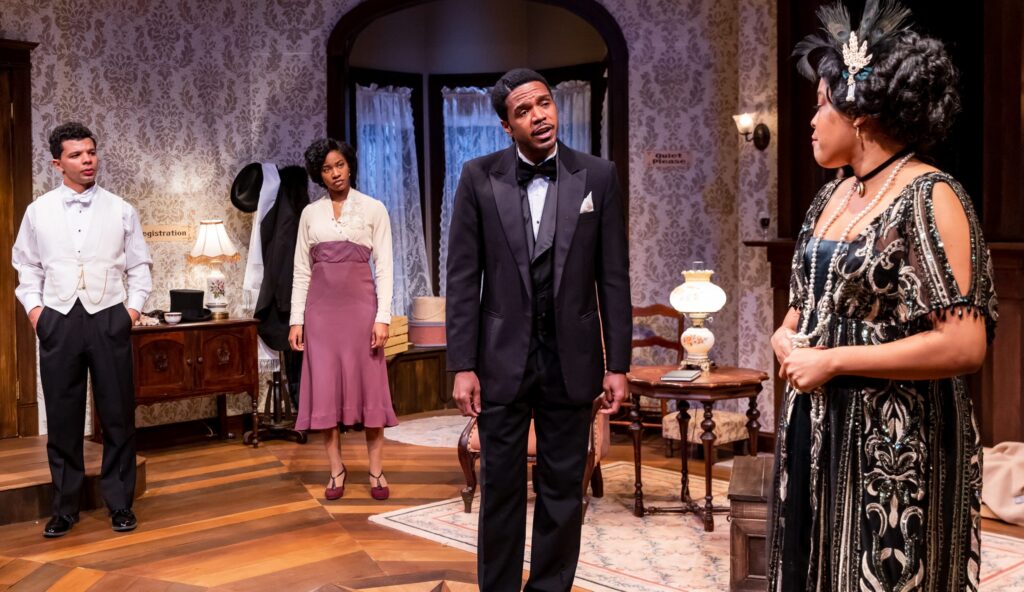
TimeLine Theatre Company Production at Goodman Theater through May 8, 2022
Highly Recommended
I have never in my life seen the same play within two months but I was so taken with Tyla Abercrumbie’s Relentless that I had to see it again. It did not disappoint. In fact, it delighted me anew, and made me renew my insistence to friends that they rush out to see what I am even more certain will become a classic. I was thrilled when the Goodman Theatre decided to remount this play so quickly, and even happier to report that this production is as fine as and nearly identical to the original with the same director, actors, set and costumes. The profundity of the piece is intact. The humor continues to make one laugh out loud. The dialog still sparkles, stings and inspires. The intimacy and ideas remain. This was the first play for the gentleman who accompanied me, and his reaction was as enthusiastic as mine. All of this allows me to stand by my original rave, which is below.
There are so many marvels in Tyla Abercrumbie’s Relentless, a compelling and stirring TimeLine Theatre Company world premiere, that it’s hard to know how to begin the list. This is a new play about two Black sisters coming to terms with the death of their mother as they sort through her West Philadelphia home in 1919. Yet it feels completely contemporary.
Janet, perfectly played with all the right snap and righteous crackle by Jaye Ladymore, is the older sister, a nurse with no time for nonsense and a firm sense of the injustice present in the world that needs eliminating. She discovers some of her mother’s diaries and is immediately drawn in to their secrets and surprises much to the dismay of her socialite sister Annelle, a layered turn by Ayanna Bria Bakari, whose focus is on fashion and socializing. As they navigate the complexities of who their mother was, and how they will survive in this time after World War I and heading into the Chicago race riots of 1919 with its relentless reminder of racism, the sisters are joined by Annelle’s doctor husband, a solid turn by Travis Delgado, and the couple’s progressive winemaker friend, charmingly and strongly played by Xavier Edward King. The Boston couple hope he will be Janet’s intellectual and romantic match. There are three other characters, all as finely cast and played as this foursome, but to discuss them would take away some of the surprises of the play.
The dialog throughout is deep but funny, whip smart, and at a natural speed that accompanies the talk of deeply intelligent people as they grapple with gripping and troubling issues. The costumes and set are a joy to behold, rich and fulsome. Ron OJ Parson, an estimable Chicago director, has given us his hallmark exemplary work here. Another marvel is that despite its three-hour run time, the audience was completely engaged.
One more marvel: Playwright Tyla Abercrumbie is an accomplished and admired Chicago actor, both for her stage and television work. She’s also known for her poetry. Full disclosure that we are friendly so I know how smart and thoughtful she is. I long ago nicknamed her “the most beautiful woman in Chicago theater.” What a pleasure and privilege to discover that she is also a fine playwright with the ability to craft a piece that offers depth, humor, intelligence, despair and hope.
Despite its newness, Relentless already feels like a classic because it possesses the qualities of truly great art – genius, content, beauty, vision and the ability to transform those who experience it. This may be the best show of the year so do whatever you can to see it before it closes.
Molly Sweeney

Irish Theatre of Chicago at The Chopin Studio through May 8
Recommended
This play charms from the start. Standing center stage is a beaming Molly Sweeney, recalling with affection how her father, a judge, took her around their garden when she was a child and taught her how to identify each flower and plant despite her blindness. Her joy is palpable, and it quickly becomes clear that her father’s floral forays also provided his adored daughter with enviable power, independence and confidence.
So why would one want to change such an idyllic existence? The late Irish dramatic master Brian Friel explores this question in his three-character play. Interrupting Molly’s peace are a tortured young man whose medical career depends on her salvation and her enthusiastic but strong-willed husband who believes that restoring her sight will make her happier. The operations to make her see do not turn out that way, and Friel’s prods us to ask all sorts of questions about the choices made. Is it better to stay in the world of joy one has created or risk trying a different world? Should anyone allow others to make such a major decision for them? The gender issues here are hard to miss. Molly is comfortable in her blind body but is talked into an operation to restore her sight by two men who don’t get along and have each faced professional failures. In a series of alternating monologues Carolyn Kruse conveys Molly’s joys and regrets with winning depth. Matthew Isler is her eager husband, who makes us understand that this operation might just be the one plan of his that works out. Robert Kauzlaric is persuasive as the doctor who jumps at the chance to fulfill his promising career after some setbacks.
Engage with the exploration of moral and medical dilemmas in the lovely language of Brian Friel. This one stands with the other well-done Irish dramas that this company has brought to Chicago.
Spay

Rivendell Theatre Ensemble through May 1
https://www.rivendelltheatre.org/
Highly Recommended
Spay, a stunner now in a world premiere at Rivendell Theatre Ensemble, offers a raw but real portrait of the opioid epidemic in a mere 90 minutes. This gripping play by Madison Fiedler, a North Carolina native and recent graduate of Northwestern University, takes on addiction in a way that will grab your the heart while it kicks your stereotypes out the door. The result is that what could have been an unbearable searing story is transformed into an illuminating tale of insight into how addition happens and what it does to addicts and those who love them.
Set in a small Virginia town, Spay takes us into the home of two sisters whose mother’s overdose sends them in very different directions. Rae Gray, known for her ability to bring life to complex roles, is Noah, a heroin addict who has lost custody of her child to her older sister. That together sister Harper is played with toughness and grace by Krystel NcNeil, who has now taken in her younger sister and is demanding she kick her addition. The sisters love each other but Harper is no longer willing to be trapped and torn apart by Noah’s addiction nor will she let it hurt her nephew not in her custody but she is cleareyed about the difficulty of Noah’s obstacles. Spencer Huffman is Noah’s handsome boyfriend, a dealer who truly loves and values her. The scenes between them are some of the sweetest in the play and ones that defy the dysfunctional way in which love lives of addicts and dealers are often portrayed. Tara Mallen, a pleasure in any role and Rivendell’s artistic director, is the well-meaning do-gooder from an organization that offers a heartbreaking solution.
Director Georgette Verdin brings the perfect touch to this compelling new play with a fine cast so that we never sink into despair. Rather we are drawn into the loves of these complex characters and forced to confront our own understanding of addiction.
If you are trying to understand the opioid epidemic or just want to welcome a promising young playwright whose work is being interpreted by a fine dramatic corps, this is a play you should not miss. Like all good art, it will grab you and make you think.
Once Upon a Mattress
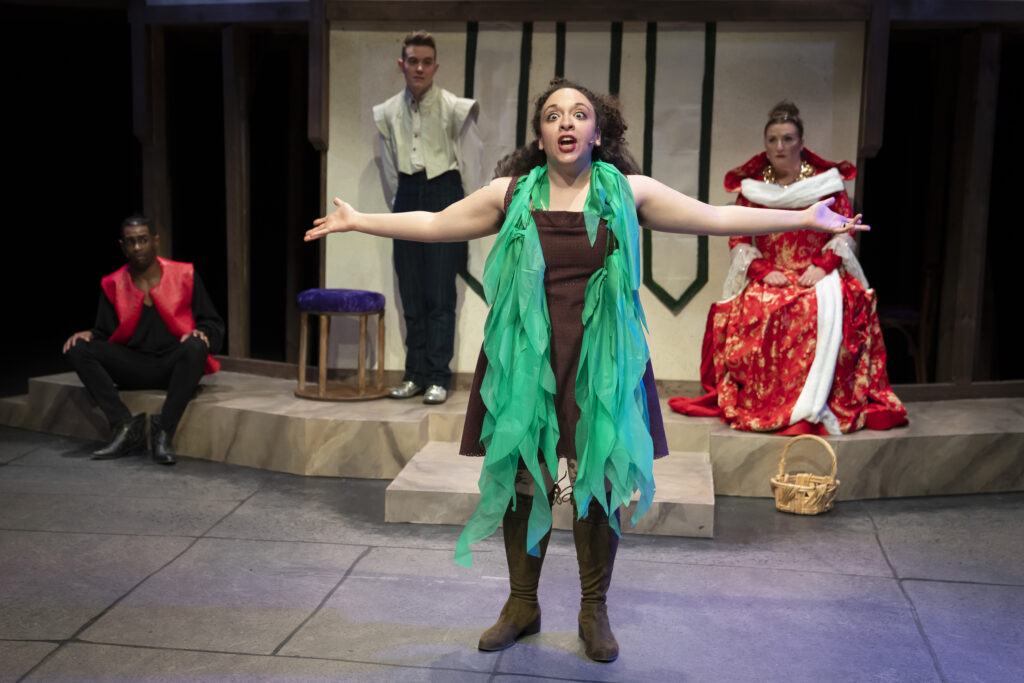
Theo Ubique Cabaret Theatre through May 1
Highly Recommended
What a delight: An up-to-the minute adaptation of Hans Christian Andersen’s 1835 “The Princess and the Pea” is currently amusing audiences at Theo Ubique. The talent at Theo Ubique brings its usual excellent singing to the 1958 proto- feminist and fairly adult musical Once Upon a Mattress, and transports it into this century with a gender-blind cast.
Standouts are Anne Sheridan Smith as Queen Aggravain, the pretentious and overbearing mother who puts many princesses through impossible tests to win the hand of her son Prince Dauntless. Her subjects are unhappily prevented from marrying until the prince is wed. This evil queen meets her match in Princess Winnifred the Woebegone, played with strength and heart by Sonia Goldberg. The perfect outlier, she makes the most of a moat-swimming princess of the marshes who just happens to be a fine singer. Everyone in the cast has their moment of great fun under the direction of Landree Fleming but, most of all, the fun they have is infectious. The classic fairytale elegance of the costumes is punctuated with some witty modern touches. The live music by Director Jeremy Ramey and his team of talented musicians adds much to the charming and sometimes wacky songs, as well as the lovely voices.
Enjoy an evening of silliness that will lift your spirits and hit the right notes musically and politically, even as you laugh with this show.
Good Night, Oscar
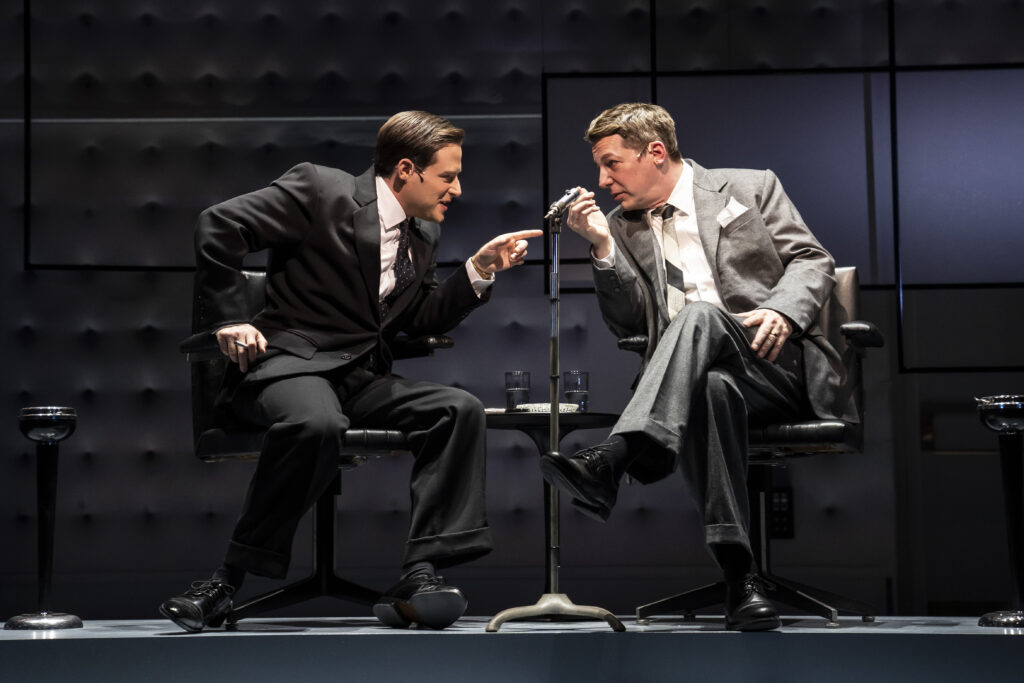
Goodman Theatre through April 24
https://www.goodmantheatre.org/Oscar
Highly Recommended
Good Night Oscar is a 90-minute trip – and I mean that in every sense of the word – through the romanticized days of early television that is packed with excellent one-liners that get one musing about such issues what television could have been, the American obsession with grotesques, the battle between art and capitalism, mental illness, drug addition, the cruel edge of humor and virtuosity.
It is the tale of a four-hour pass that gets the multi-talented but bitter Oscar Levant, an American concert pianist, composer, music conductor, author, radio game show panelist, television talk show host, comedian and actor, onto the set of TV talk show Host Jack Paar, the second host of The Tonight Show. In some sense everyone behaves according to plan but that plan has much pain despite the fast-flying jokes.
The media spotlight has been on Sean Hayes, an Emmy-Award-winning actor, host and producer, and with good reason. He nails Levant, capturing his brilliance and mental struggles. He even plays the piano beautifully. But others deserve equal credit. Emily Bergl is a perfect June, Oscar’s beautiful, tough and devoted wife, who gets it on so many levels and arranges the pass to put him in the spotlight. Alvin Finney is the elegant medical student who is tricked into this plan and holds the moral ground in the show while blasting away some nasty stereotypes about race and class. Ben Rappaport is Paar, a man is comfortable on both sides of the matters at hand, slickly moving from defending art and ideas while making fun of California naivete to advancing his career on the backs of less calculating personalities. Peter Grosz is the perfect mix of corporate timidity and nerdy slime as David Sarnoff, a king-maker of early television. John Zdrojeski is an elegant George Gershwin, who is Levant’s mentor, ideal and source of inadequacy. Ethan Slater is the starry-eyed assistant, eager but unknowing enough to let celebrity blind him into real trouble.
None of this would be possible without the brilliant script by Doug Wright. His I Am My Own Wife took the world by storm, and found its place as a star in Chicago’s dramatic universe. Director Lisa Peterson brings a sure touch and an equally impressive pedigree. She wrote An Iliad, another Chicago star that shone in multiple productions at Court Theatre and the Oriental Institute. Together, with this fine cast, they guide this play to the higher ground so it never slips into the mediocrity that marks so much of television. Rather this one delves deep and keeps us laughing and thinking. Take the time to see one of the best talk shows around.
Laced

About Face Theatre at The Den Theatre through April 16
Recommended
What starts with a tragic, violent event becomes an ode to survival and friendship. Three bartenders arrive at their popular queer bar to discover it has been vandalized. Standing the midst of the trash and graffiti, they are there for each other as they try to figure out how this happened and who is responsible. Mariah Copeland, Aida Delaz and Collin Quinn Rice are ideal as the three work friends who are there for each other despite their different personalities. Individually and collectively, they keep the story moving through past and present. Playwright Sam Mueller’s piece alternates between flashbacks that offer background, scenes of mourning for what has been lost and the power of recognizing the need to move on. Director Lexi Saunders deftly manages these transitions. The behind-the-bar scenes, including choreographed dance the bartenders do in the happy chaos when the bar is busy are particularly delightful, as are the moments of commentary and gossip about patrons.
What really stays with one though is the bond of friendship that is clear from the start and grows stronger as the trio comes to terms with what happened and finds a way to move beyond it. This play could have easily become preachy or platitudinous about the horrors of such acts of violence and the need for community and support but it does not thanks to a fine artistic team that includes the actors, director, playwright, set designer and technical crew.
The result is a play that tells us about the horrors of the violence we face but also offers us the hope of friendship, strength and community. It is the tonic we all need now.
King James

Steppenwolf Theatre through April 10
https://www.steppenwolf.org/tickets–events/seasons/2021-22/king-james/
Highly Recommended
Award-winning Playwright Rajiv Joseph engages even the most diehard sports haters with his charming play about a friendship between two fiercely intelligent and devoted fans of “King” LeBron James. Their mutual admiration for this basketball star from Akron, Ohio is the connector for these two Clevelanders, a quirky white businessman and a Black short story writer. Their banter is a delight to behold as it jumps from their love of LeBron to their hopes, fears and dreams to nearly everything about their lives in our troubled world. Count it a Midwestern pleasure to witness the Cleveland pride that runs through this story, revealing Joseph’s affection for his roots.
Glenn Davis, Steppenwolf’s co-artistic director, and Chris Perfetti tackle their roles as the dueling duo that bounces between fandom, easy friendship and fury with a gusto that still allows them to inhabit their characters in natural and believable ways. Director Kenny Leon makes sure that the snappy dialog never dips into that smart sitcom space but stays in a higher universe where the mundane can be appreciated and laughed about even when the profound is at play. Todd Rosenthal’s turning set – one side is a hip formula wine bar, the other a knick-knack store that has to be any collector’s fantasy – returns spectacle to Steppenwolf’s stage.
The tone is set by the irresistible Khloe Janel, who DJs from a balcony. Watching their joyous smile deepen as they bop along to Marvin Gaye’s rendition of the national anthem at the 1983 NBA All-Star Game sets a tone of such calm joy as the audience settles in that you know you are in for a great game. Whether you are a sports fan or not, make sure you get courtside seats for this show. It will delight you while you’re watching the moves and stay with you once you’ve left the arena.
The Lady from the Sea
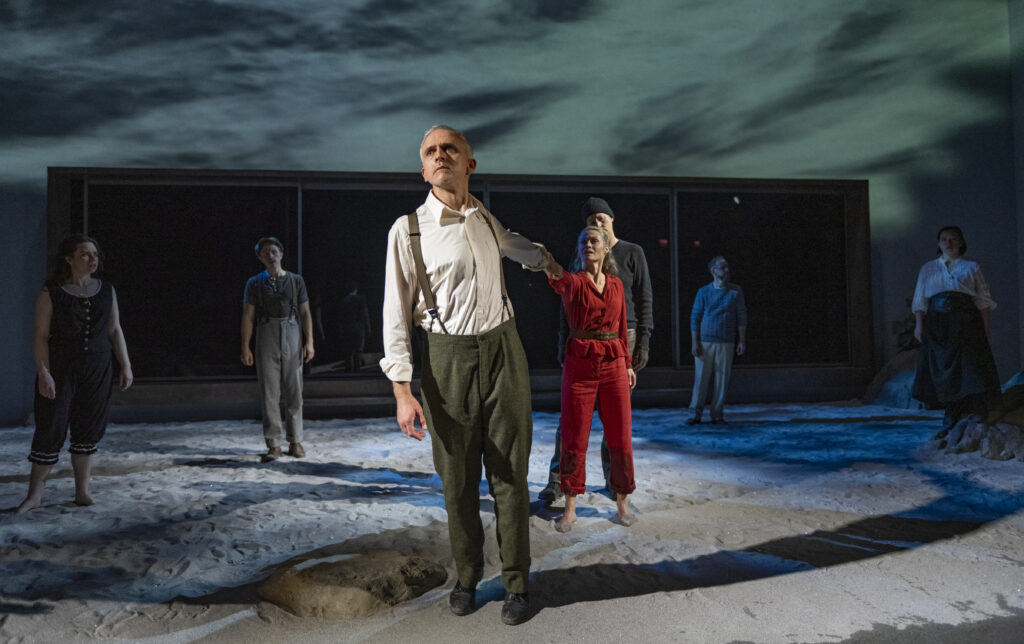
Photo by Michael Brosilow
Court Theatre through March 27
Recommended
Though it may be unfamiliar to Chicago audiences, The Lady from the Sea has captured the interest of creative spirits for some time, among them Vanessa Redgrave and Charlie Chaplin. She starred in a 1973 production. He started but never finished a film about Henrik Ibsen’s 1888 play.
There is a certain trepidation about seeing a rarely produced play by a famous playwright. One wonders if the rarity is because it is simply bad. Fortunately, that is not the case with Court Theatre’s production, which opened after a two-year pandemic delay that resulted in the commission of a lovely new translation by playwright Richard Nelson. The stellar cast delights in its natural ease with the roles, and the result is a charming cocktail. Imagine taking your Ibsen mixed with Anton Chekov and a splash of Ingmar Bergman, delivered with the comedic chips of Chekovian ice it requires. These actors pull it off, and manage the more emotionally fraught moments as well. From the first scene, the painter played by Dexter Zollicoffer, sets the tone. The Wangel family – Gregory Linington as the doctor father, Tanya Thai McBride and Angela Morris as his daughters, and Chaon Cross as his wife, also known as The Lady from the Sea – are at the center of the drama but it is Cross who is the focus as she struggles with her freedom and her passion. What she wants is the ability to determine her own life.
Indeed the question of what women want and what they should be runs throughout this piece, as each female ponders her fate while correcting clueless males. Will Mobley, as the educated former tutor, and Samuel Taylor, as the dying artist, offer comic foils incapable of insight. Kelli Simpkins is menacing as the former lover, representing the tempestuous sea, come back to claim her lady.
The set and the costumes have elements of bleak modernism and Victorian curves. The Lady from the Sea is in rich colors and often pants while the daughters vacillate between traditional garb that later include daring but still proper pants. Water is fittingly present through, behind the sliding panel and creeping onstage in the play’s second half so that all to be in the sea at some point. What is less effective is director Shana Cooper’s dance choreography. We already understand the dynamics and tensions between characters so these breakaway moments pull us out of the play without adding new insights.
At the end of the opening, a woman in front of me told her companion that Ibsen kept writing the same play. There is some truth in that though this play has a happier ending than the slammed door in A Doll’s House. Then again, although we’ve come a long way, women still too often lack true freedom of choice let alone genuine equality. For that reason alone, this Ibsen cocktail is worth drinking, perhaps even again and again. Besides how often do you get to see an Ibsen play with a happy ending?
Solaris

Griffin Theatre Company at Raven Theater through March 27, 2022
Recommended
Polish Writer Stanislav Lem’s Solaris has been interpreted in many ways. The author said two films did not like because they did not capture his novel’s exploration of the limits of human rationality. How fitting that Griffin Theatre’s return to the stage is to remain true to Solaris’ literary roots with an adaptation that is fitting for our times.
Without giving too much away, this is the story of a scientist trained in psychology arriving at a remote space station where three other scientists, one of them her teacher, are studying the distant ocean planet of Solaris. They have been cut off for some time and there are many surprises in store for their visiting colleague. At its center, this is the tale of the conflict between head and heart, of how scientists wrestle with their emotions when they infringe on their professional lives.
If you are a fan of the plays by Scottish Playwright David Greig, you’ll appreciate his return to Chicago with this adaptation of Lem’s 1961 novel. The directing by Griffin ensemble member Scott Weinstein, whose award-winning reimagining of Ragtime remains with me, saves the show from seeming much too talky. The set for this sci-fi drama is spectacular in its minimalism with its stark, high-tech angles and sliding panels.
On opening night, it took a few minutes for the actors to fully inhabit their characters in a way that made us forget we were watching a play. When that happened it was an engrossing experience with lots of ideas and ethical dilemmas floating through our dramatic galaxy, accompanied by enough passion to keep it human. The corps of young scientists, played by Isa Arciniegas, Nicole Laurenzi and TJ Thomas, bring a human touch to their intellectual and ethical positions. John Drea is passionately present as the perplexed lover. Alexandrya Salazar is a vision as a beautiful otherworldly child from her first appearance holding a perfect orange. Although his presence is virtual – how appropriate for our current Zoom existence – Larry Baldacci, as the lead and senior scientist Gibarian, steals the show. His words are the first image of the play, setting us up for his obsession with finding out about the distant planet. But it is the line from his diary that strikes at the story’s – and our – core: “We are human, this is the problem.”
Embrace your human and intellectual self and see this show that explores loneliness and loss as it limns the border between our work and our personal lives.
Blues in the Night
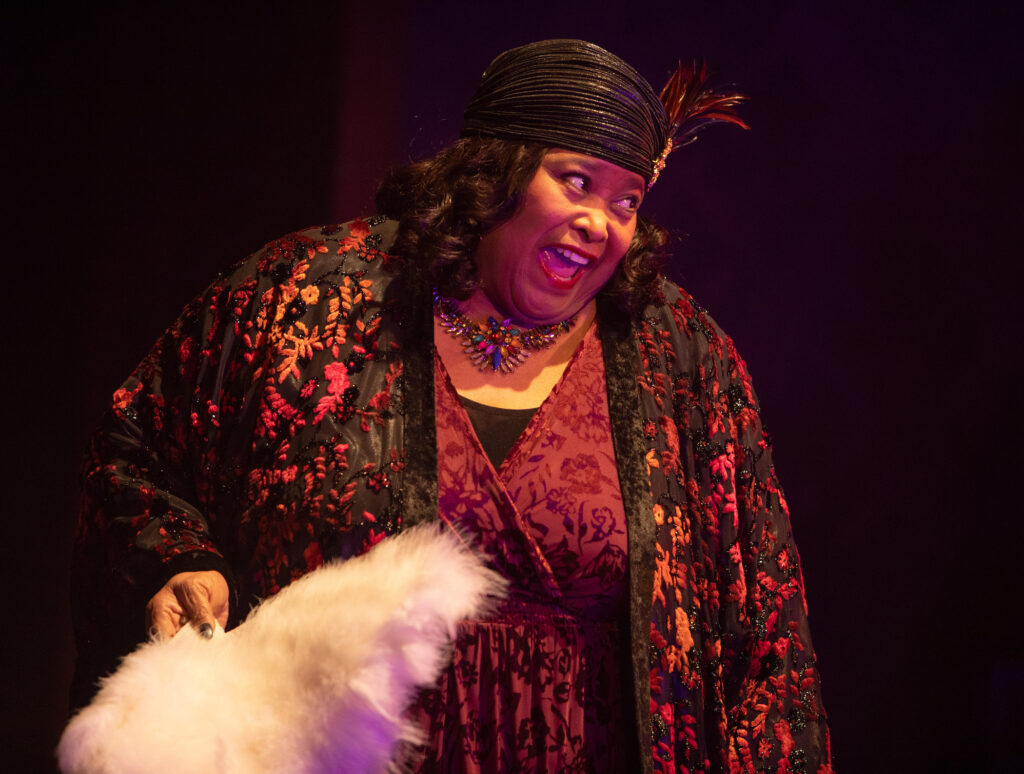
Photo by Anthony La Penna
Music Porchlight Theater at the Ruth Page Center for the Arts through March 20, 2022
Highly Recommended
Felicia Field’s face alone is worth the price of admission to Blues in the Night, whether she is fixing her stare on someone in the audience or glancing over her shoulder with a wicked smile or simply lifting an eyebrow. And it goes without saying that her legendary singing is a joy to hear, especially when it’s accompanied by her delightful and often humorous acting. Not that anyone else in this fine cast is a slouch. Donica Lynn, Clare Kennedy and Evan Tyrone Martin all belt it out beautifully, and with some charming and passionate acting. Terrell Armstrong is a dancing force who supplements the songs with grace and beauty. The band, led by Maulty Jewell IV, offers excellent accompaniment, and an occasional foil to Fields, though sometimes the musicians need to take it down a notch so as not to drown out the singers.
This musical revue, set in 1938 in a South-side Chicago hotel, takes us back to the birthplace of the Blues by weaving together the stories of these four singers. Ironically the show offers as much joy as it does sorrow, and that’s a good thing because we all need some happiness these days. Blues in the Night features classics like “Stomping at the Savoy,” “Taking a Chance on Love” and “Nobody Knows You.” Of course, in the spirit of Blues great Bessie Smith, some of the best numbers are the wicked ones. Fields nearly steals the show with her naughty “Take Me for a Buggy Ride.” The female trio, with its age and experience range, works especially well in saucy songs.
Your spirits will be lifted by this exuberant show that brings Porchlight Musical Theatre back to the stage.
When There Are Nine

Pride Arts Center through March 13, 2022
Recommended
If you seek a sense of the human side of the Notorious RBG, and how the late Supreme Court Justice was able to blend her warm, rich personal life with her political commitments, this is your show. Talia Langman expertly captures Ruth Bader Ginsburg at all ages, even her stooped but indomitable posture later in her life. She also passionately conveys Bader Ginsburg’s dedication to gender equality and her fierce Feminism. Equally impressive is Gabe Estrada as Martin Ginsburg, her devoted spouse, partner and supporter who happens to be a great cook. What a pleasure it is to see such an equal and loving partnership, one that seems the classic version of the marriage of Vice President Kamala Harris and Second Gentleman Douglas Emhoff. Langman and Estrada show the depth and joy in such a union, and Estrada emanates pride in his wife without ever seeming false or weak. Another star is Nicholia Q. Aguirre as the substitute caregiver for the day. She turns out to be the dream caregiver, full of warmth and profundity, delivered with calm and kindness by Aguirre. This trio is supported by seven female actors who inhabit a range of characters from mothers to protesters to card-playing Supreme Court colleagues. They admirably provide some of the lighter moments amid the serious issues being addressed here.
Sally Deering’s play is engaging, and Director Sam Hess keeps it from veering into soapbox or soap opera. On opening night, there were a few moments when the acting was not quite up to snuff but that is bound to improve. If you’re feeling blue and need a tonic for these times or a reminder that there are smart, loving people fighting for women’s rights and equality, this play is your pick-me-up. If you are an RBG fan, you won’t want to miss it.
Fireflies
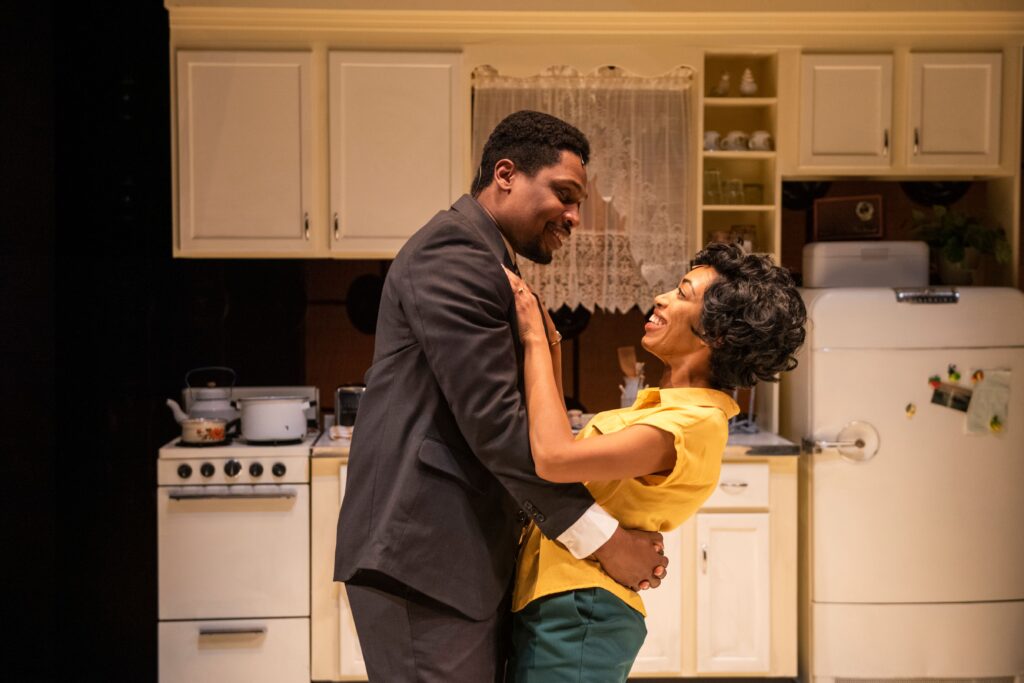
Northlight Theatre through February 20, 2022
Recommended
The ferocity of the acting in Donja J. Love’s Fireflies at Northlight Theatre is a tragically perfect match with the early days of the Civil Rights Movement. It is almost impossible to take your eyes off Chanell Bell and Al’Jaleel McGhee as they offer audiences the welcome complexity of two people who sometimes love each other despite serious moral shortcomings. This intimate and intense two-person drama, performed to the drumbeat of racism with undercurrents of sexism and homophobia, is bursting with the intriguing ambiguities and moral questions all too familiar to those who lived through these times. The playwright, actors and director beautifully explore the painful and sometimes unbearable balancing act that anyone with brains and a heart experienced as they veered between the hope of the Civil Rights Movement and the despair of the reality of racism. The set is exquisite with its backdrop that starts with the fire of the 1963 Birmingham’s 16th Street Baptist Church bombing that killed four little girls, and moves through other acts of violence before offering a transformative hope. Two critiques: The ending needs a bit of trimming and the play is such a fine mix of intimacy, despair, rage, joy and hope expressed by two fine actors that the microphones and auditorium voices are not necessary to convey all that is offered here.
Mr. Dickens’ Hat

Northlight Theatre through January 2, 2022
Transport yourself back to the time of Charles Dickens without having to see another version of A Christmas Carol. The delights of Mr. Dickens’ Hat are abundant in Michael Hollinger’s new play with music. The story of a hat shop filled with characters who could have sprung from the pages of Dickens takes its inspiration from a tragic train wreck in which Dickens used his hat to give water to those dying around him. That hat holds a place of honor in this play as the beacon of a Victorian hat shop. Thieves plot to steal and sell the hat, only to be thwarted by two young people, both devoted fans of the author. The charm of the tale is its mix of Dickensian characters, complications and hard times – pun intended – with modern asides and delicious comedy. Six actors handle multiple roles expertly under the imaginative direction of David Caitlin. It’s a pleasure to see veteran actor Nick Sandys back on stage in such a fine corps of talented performers but the one who elicits great laughter with his deft physical comedy is Mark David Kaplan as the absent-minded hat store owner and the bumbling criminal accomplice. For those of us who reached our lifetime quota of Christmas Carol after decades delighting in the wonders of the Goodman Theatre’s version from childhood through parental escorting, this is a welcome respite.
2021 Raves
Love Actually? The Unauthorized Musical Parody

Right Angle Entertainment at the Apollo Theater through January 2, 2022
Even if you loved the movie, as my family and friends did, you will have a hard time not laughing as this energetic, antic and talented cast of six tears through their 85-minute send-up, playing more than 50 roles, changing costumes 144 times and managing 42 flips of some decidedly unattractive and ill-fitting wigs. It is breathless wicked fun. Particularly amusing is the way cast members call each other by the names of the actors who starred in the Love Actually movie. Then there are the send-ups of some of the famous scenes from Keira Knightley with her irritating teeth prominently displayed to full frozen advantage to Harry Potter’s Snape as Emma Thompson’s philandering spousal unit to a cross-dressing Joni Mitchell. What keeps this show from sagging or getting stupidly silly is the smart script, snappy directing, spectacular cast so good that it would be unfair to single out anyone, riotous wigs and costumes. Even if you didn’t actually love the 2003 movie you will likely enjoy this send-up. Get in the spirit of season by howling with laughter at this holiday hoopla.
Irving Berlin’s Holiday Inn
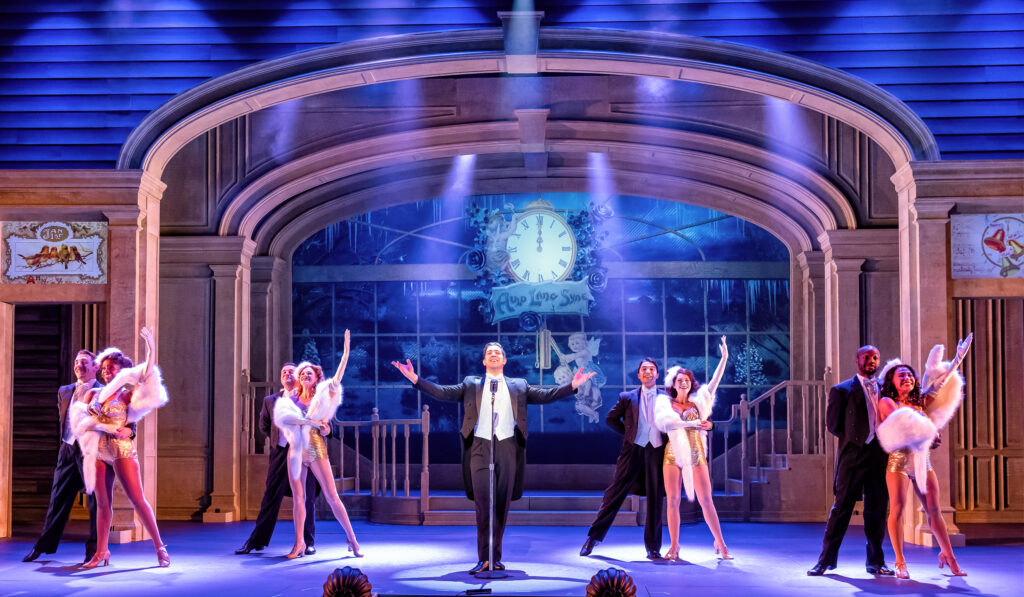
Drury Lane Theatre through January 9, 2022
Delight in songs of one of the shining stars of Tin Pan Alley with this lovely production of Irving Berlin’s Holiday Inn that gives new energy to the classic film. It’s hard not to sing along to Berlin’s brilliant tunes but the pipes and tap-dancing skills of this stellar cast will have you so absorbed that you can spare your seatmates. The iconic “White Christmas” aside, this show is full of classics Berlin created for other holidays so you get a full musical calendar with hits like “Stepping Out with My Baby,” “It’s a Lovely Day Today,” “Heat Wave,” “Shaking the Blues Away,” “Cheek to Cheek,” “Easter Parade” and more. Each song shines thanks to pitch-perfect directing and choreography by Matt Crowle. The talents of musical theater favorites Adrian Aguilar and Erica Stephan animate this love story about retired hoofers trying to start a theater in a Connecticut farmhouse. Another standout is Danielle Davis, who steals the show as the no-nonsense handywoman whose singing is as powerful as her quips are hilarious. This is a performance that will leave you singing and dancing your way home as you revel in the panoply of American holidays.
